INTRODUCING OF INTERIORS A WHOLE WORLD

WILD IN RIYADH PAVING THE WAY FOR GENDER EQUALITY IN THE REGION
RED SEA GLOBAL WORKING WITH RED SEA GLOBAL THE REQUIREMENTS AND BENEFITS
GROUP AMANA HOW DIGITALIZATION IS RESHAPING THE INDUSTRY

INTRODUCING OF INTERIORS A WHOLE WORLD

WILD IN RIYADH PAVING THE WAY FOR GENDER EQUALITY IN THE REGION
RED SEA GLOBAL WORKING WITH RED SEA GLOBAL THE REQUIREMENTS AND BENEFITS
GROUP AMANA HOW DIGITALIZATION IS RESHAPING THE INDUSTRY
We are an award-winning spatial design and branding consultancy with over 16 years of expertise developing the entire customer journey from master planning, retail concepts, and branding for major brands, retailers, F&B groups, hoteliers, governmental organizations, real estate developers, airport operators, and FMCG rms.
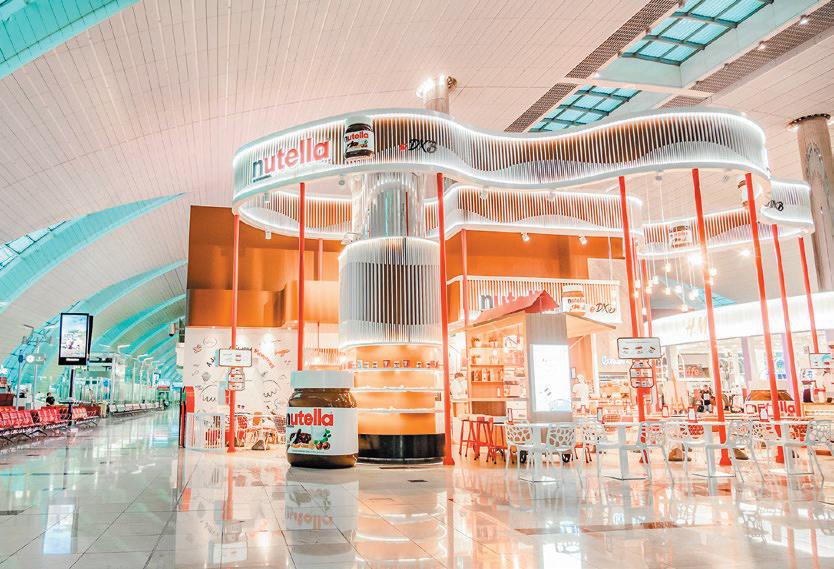
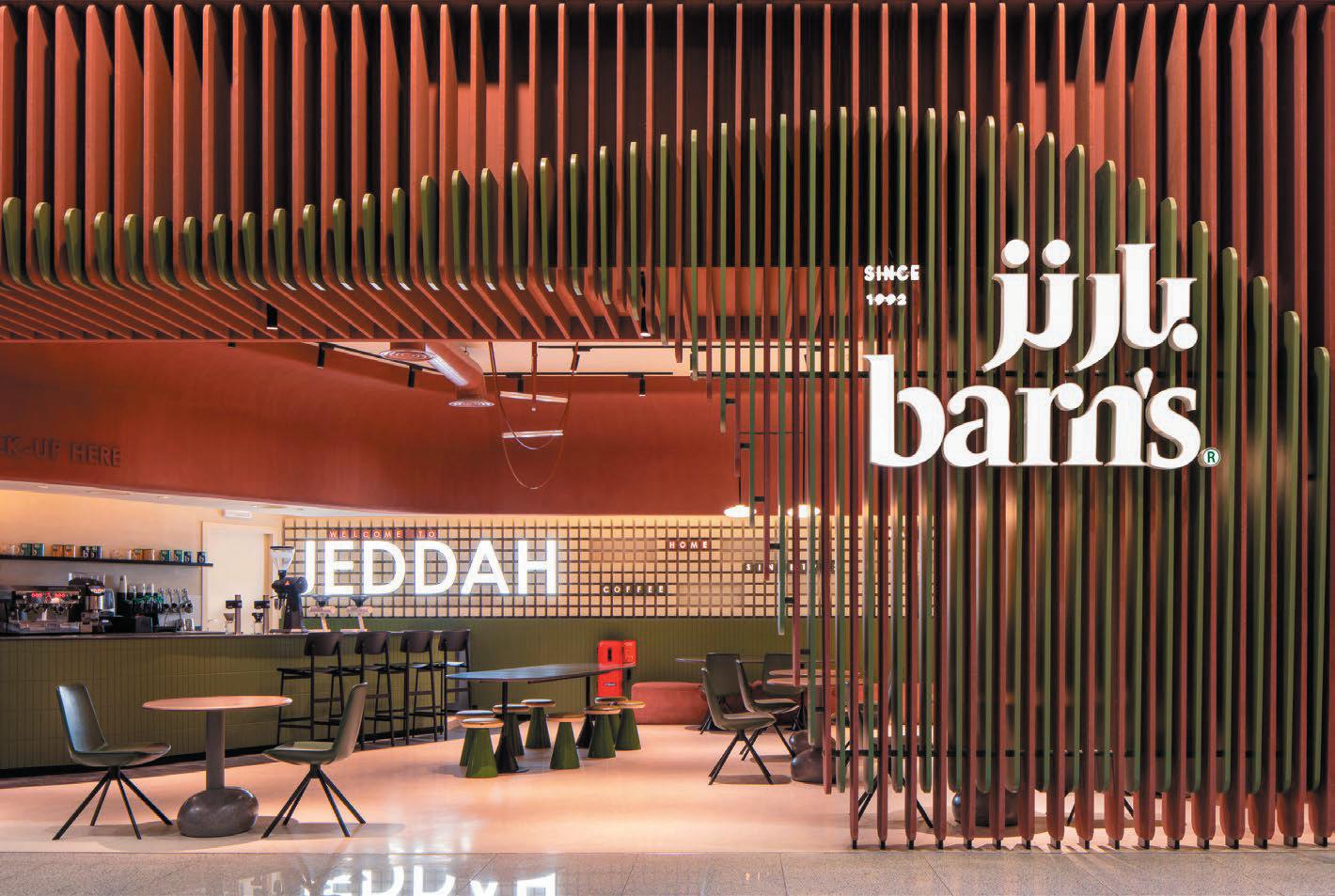
An international and independent business communication group with 38 years of experience, across 47 countries globally.
COMMERCIAL STRATEGY & SPACE PLANNING: Commercial master planning | Due Diligence | Customer pro ling & segmentation | Trend analysis and benchmarking | Shopper marketing | Flow and path to purchase mapping | O er mix recommendation and brands pro ling | INTERIOR ARCHITECTURE: Customer experience mapping | Concept creation | Technical development | Execution supervision | Merchandizing design | Design guidelines and vendor pack | Third party design review | BRAND STRATEGY & DESIGN: Market study | Brand uplift and creation | Brand positioning values and missions | Graphic identity | Campaign design and artworks | Packaging creation and development | E-commerce assets creation and development
JEDDAH

Level 7, Murjana Tower, Prince Sultan Street, Al Rawdha, Jeddah, Saudi Arabia

T +971 (0)4 277 64 86 E info@odg-design.com

DUBAI
O ce 505, Building 2, Emaar Business Park, The Greens, Dubai, UAE
T +971 (0)4 277 64 86 E mfabbrini@odg-design.com
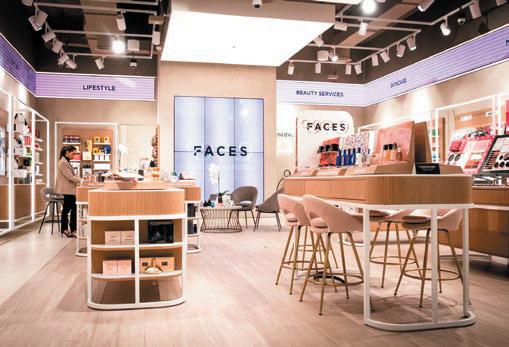 DUBAI | PARIS | JEDDAH
DUBAI | PARIS | JEDDAH

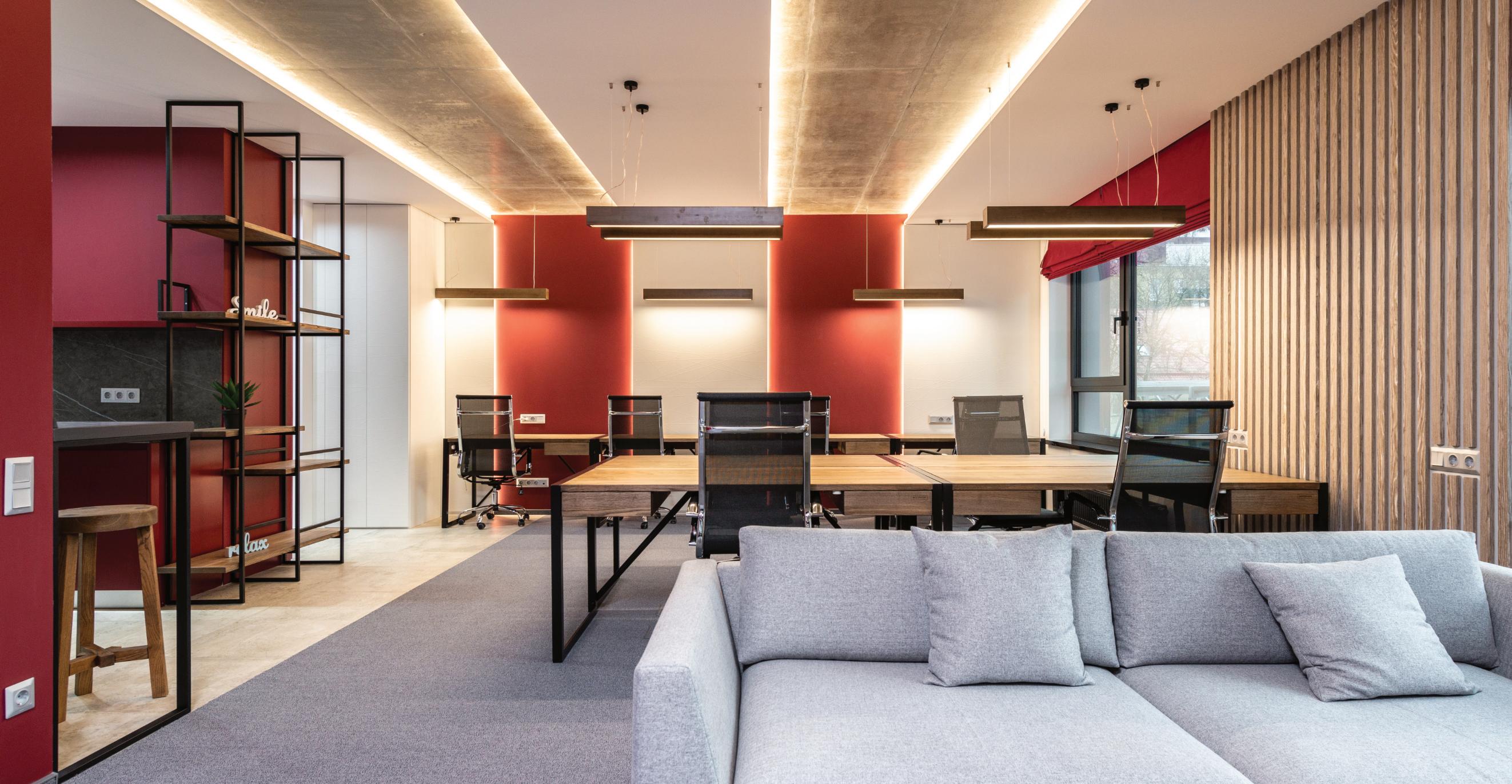
THEY SAY THAT A WEEK IS A LONG TIME IN POLITICS. WELL, IT’S CERTAINLY A LONG TIME IN SAUDI ARABIA WHERE THINGS ARE MOVING ALONG AT A FURIOUS PACE, WITH ANNOUNCEMENTS MADE ALMOST EVERY WEEK ABOUT NEW PROJECTS AND DEVELOPMENTS – MANY OF WHICH MAKE YOU GASP WITH THE SHEER AMBITION AND AUDACITY OF THEM!
You will read about a number of these projects in this issue of Saudi Projects, as well as enjoy interviews with leading lights from globally recognized companies such as Gensler, Red Sea Global, and Altavia.odg.


There is an entirely new section in the magazine too, focusing on interiors and taking in everything from design through to fit-out. And we begin with two in-depth interviews with those clever people from Altavia.odg, who talk about how they turn such places as stores in leading international airports into destinations in their own right.

We will also take a peek at the design plans for the Red Sea Marine Life Institute at AMAALA, in addition to finding out if the night sky really is the final frontier in sustainability. NEOM’s first island development, Sindalah, is covered too, and, as a main gateway to the Red Sea offering, we discover that it is scheduled to start welcoming guests in early 2024.
And for those companies that want the opportunity to work with Red Sea Global, we talk to Ben Edwards, Group Head of Cost, Commercial & Procurement, who brings us up to date on current needs, the benefits of working with RSG, and how to reach out to discover more.
It’s not all glamor and sunshine, though, because we head underground, metaphorically speaking, when we report on how the Kingdom wants to activate its mineral resources and, with this in mind, the recent completion of a whole industrial city to process aluminum from raw materials and bauxite to final value-added products.
As always, there is a lot more besides, including a few surprises, such as an ingenious and creative group of WILD women! So, I won’t hold you up any longer. I hope you enjoy this issue of Saudi Projects as much as we enjoyed putting it together.
Rod Millington EDITOR










Plans were unveiled to develop the world’s largest modern downtown in Riyadh when Crown Prince and Prime Minister Mohammad bin Salman announced the launch of the New Murabba Development Company (NMDC), for which he is Chairman.
The New Murabba project will be designed around the notion of sustainability, with green areas, walking and cycling pathways, and other amenities that will improve the quality of life by fostering healthy, active lifestyles and community activities. It will also include an iconic museum, a university of technology and design, a multipurpose immersive theater, and over 80 entertainment and culture venues.
The project will be located near the intersection of King Salman and King Khalid roads to the north-west of Riyadh, covering an area of 19 square kilometers and housing hundreds of thousands of residents. The project will have more than 25 million square meters of floor space, with more than 104,000 residential units, 9,000 hotel rooms, and more than
980,000 square meters of retail space, as well as 1.4 million square meters of office space, 620,000 square meters of leisure assets, and 1.8 million square meters of community facilities. The project is scheduled to be finished in 2030.
be one of the largest built structures in the world, standing 400 meters high, 400 meters wide, and 400 meters long. The cubic nature of the ‘Mukaab’ will ensure the definitive utilization of space to accommodate the technologies required to develop the icon.
The ‘Mukaab’, inspired by the modern Najdi architectural style, will be the world’s first immersive destination, giving an experience developed by digital and virtual technology with the most advanced holographics. The ‘Mukaab’ will include a tower atop a spiral base, as well as a structure with two million square meters of floor space that will be a premium hospitality destination with a variety of retail, cultural, and tourist attractions, as well as residential and hotel units, commercial spaces, and recreational facilities.
Within a 15-minute walking radius, the New Murabba project will provide a one-ofa-kind living, working, and entertainment experience, as well as its own internal transportation system. It will take about 20 minutes to drive from the airport.
NMDC will develop the project and build the ‘Mukaab’, an extraordinary iconic landmark featuring the latest state-of-theart technologies. The design of the ‘Mukaab’ includes first-of-its-kind facilities and will
The creation of NMDC is part of PIF’s goal to unlock the possibilities of promising sectors, enable the private sector and expand local content, contribute to the development of real estate projects and local infrastructure, and diversify the Saudi economy’s sources of income. It is expected to boost non-oil GDP by SR180 billion and create 334,000 direct and indirect jobs by 2030.

It will be one of the largest built structures in the world, standing 400 meters high, 400 meters wide, and 400 meters long

SABIC has opened the doors of its new landmark building in Jubail which, LEED Gold certified for its smart resource management and energy efficiency measures, will accommodate more than 3,600 employees. It has been constructed using SABIC steel, with 77% of mechanical, electrical and finishing work being acquired locally.
The building’s design is fuelled by SABIC’s core values: inspire, engage, create, and deliver, and is developed from a crystal pattern, symbolizing the nature of SABIC’s work in which many aspects harmonize in one fabric.
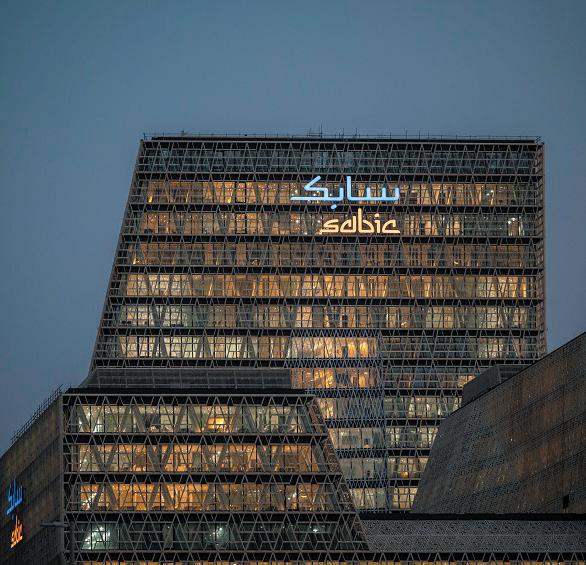
It embodies SABIC’s 45-year journey of innovation and sustainability.
Atkins has been appointed as a Delivery Partner organization for THE LINE at NEOM. A civilizational revolution that will have no roads, cars, or carbon emissions, THE LINE is set to provide an unprecedented urban living experience.
Atkins has been awarded a five-year contract under a framework agreement for consultancy services on THE LINE. In collaboration with NEOM and other Delivery Partner organizations, Atkins will provide project and construction management consultancy services for the design, procurement, construction, testing, and commissioning of the project, together with the management of the critical interfaces that the linear city shares with adjacent NEOM projects and logistics.
The building will accommodate more than 3,600 employees
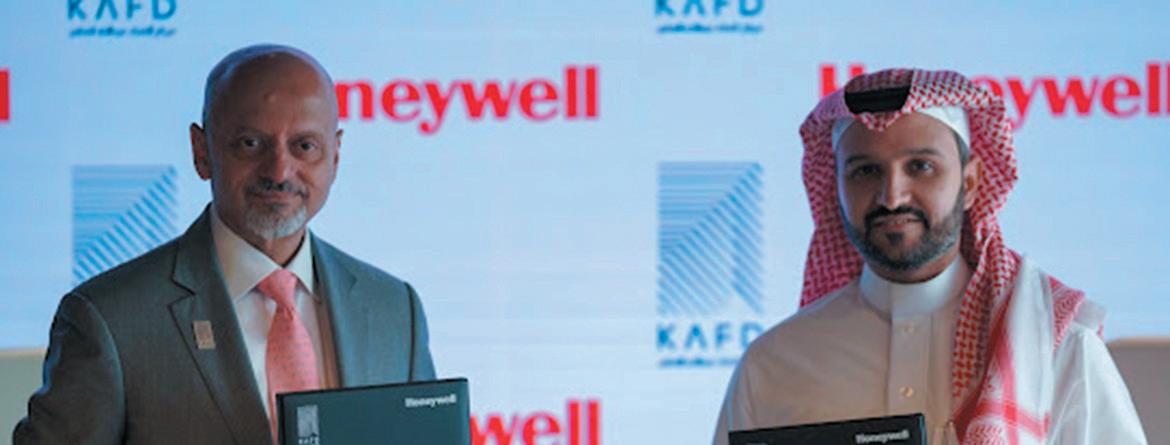
Honeywell and King Abdullah Financial District (KAFD) have signed a Memorandum of Understanding (MoU) to help create a sustainable smart city experience at the prime business and lifestyle destination.
Estedamah, a Saudi Arabia-based fully integrated environmental solutions service company, is expanding its waste recycling capabilities by investing in a contaminated soil wash plant designed and engineered by CDE. The wash plant will be commissioned at Estedamah’s facility in Dammam city, where it will process a range of oil-contaminated waste materials from across Saudi Arabia.

Honeywell’s ready-now solutions will help optimize operational efficiencies and support KAFD on its smart city strategy focused on sustainability targets through the deployment of energy-saving initiatives across its assets and facilities.
Honeywell will provide direct technical support and act as a trusted and long-term technology advisor to KAFD, utilizing smart solutions to optimize the experience of tenants, visitors, businesses, and city operations.
Honeywell will provide direct technical support and act as a trusted and longterm technology advisor to KAFD
Plans to work together and create a digital platform that would offer sustainability solutions for challenging industrial sectors have been made public by Schlumberger and Saudi Aramco. Companies in sectors such as oil and gas, chemicals, utilities, cement, and steel will be able to use the proposed platform to collect, measure, report, and verify their emissions while also analyzing various decarbonization pathways.

Olivier Le Peuch, CEO at Schlumberger, explained: “Aramco and Schlumberger are hoping to draw on our long history of collaboration and partnership to deliver a digital sustainability ecosystem that enables global organizations to manage their carbon emissions and realize ambitious sustainability goals. The sustainability platform will be a game changer for the energy and hard-to-abate industry sectors as they look toward a lower-carbon future.”

As part a Memorandum of Understanding (MoU) to jointly explore sustainable initiatives, stc and Ericsson partner to manage and dispose of stc’s obsolete equipment as part of the Ericsson Product TakeBack Program. The program aims at minimizing the potential environmental impact associated with the disposal of decommissioned end-oflife electrical equipment.
Maha Alnuhait, General Manager of the Sustainability Program at stc, commented: “As a leading
digital enabler in the region, stc strives to create an immensely positive impact within the Kingdom of Saudi Arabia, and align with Saudi Vision 2030. In line with the sustainable development goals of the country, we are proudly cooperating with Ericsson to dismantle the equipment that has reached end of life in the network and recycle the material with the highest industry standards. We are proud of our latest cooperation and are certain our efforts will bring great benefits to the country.”
“The sustainability platform will be a game changer for the energy and hard-toabate industry sectors”
The program minimizes the potential environmental impact of e-waste
THE PUBLIC INVESTMENT FUND (PIF) IS CONTEMPLATING PROPOSALS FOR A TWO-KILOMETER-TALL TOWER AS PART OF AN 18-SQUAREKILOMETER MASTER-PLANNED DEVELOPMENT TO THE NORTH OF RIYADH.
The proposed structure will be more than twice as tall as the world's tallest building, Dubai's Burj Khalifa, which stands at 828 meters. According to contractors that have quoted megatall skyscrapers in the region, a structure of this height would cost around $5 billion to build, depending on the final design.
A design competition for the record-breaking tower is underway, with a $1 million participation fee, with up to 10 firms having been invited to take part. Some of the world's finest architectural companies are involved, and they were chosen based on their previous work on other megatall structures and distinctive designs around the world. These include US-based practices Skidmore, Owings & Merrill (SOM), Kohn Pedersen Fox (KPF), Adrian Smith & Gordon Gill Architecture, and Gensler; 10Design, part of France’s Egis; and Dubai-based firm, Killa Design.
EY undertook the feasibility study for the development, which is located west of the existing King Khalid International Airport. This tower is just one of several large projects planned for the city's northern fringes.
Other tall buildings are planned throughout Saudi Arabia, and the scale of the towers underlines Riyadh's confidence in delivering Vision 2030 objectives through a succession of self-styled giga-projects.
Saudi Arabia has previously designed tall skyscrapers. The PIF was exploring proposals for a 1.2km-tall tower in King Abdullah Financial District (KAFD) on a property known as KAFD X. In 2019, consultants were working on project designs.
The 1,008-meter Jeddah Tower Scheme is another tall tower that has been envisioned. Construction on that began around 10 years ago and halted when the construction reached roughly 70 stories. Attempts to resurrect the project have failed because firms are unwilling to accept any obligations from contractors and consultants who previously worked on the scheme.
A supertall structure is one that is more than 300 meters tall, while a megatall building is one that is more than 600 meters tall, according to the Council on Tall Buildings and Urban Habitat (CTBUH). As stated by the CTBUH, there are currently 173 supertalls and only three megatalls completed worldwide.
According to the tall building database Emporis, only two completed structures in the Middle East are megatall: the Burj Khalifa and the 601-meter-tall Mecca clock tower.

This tower is just one of several large projects planned for the city's northern fringes
A design competition for the record-breaking tower is underway
The Public Investment Fund (PIF) has purchased a stake in Global Infrastructure Partners (GIP) offshore wind firm Skyborn Renewables, with plans to invest in further sustainable energy projects.

Skyborn has a more than 7 GW offshore wind portfolio, with five operational and under-construction projects in Germany, France, and Taiwan, as well as a 30 GW pipeline of diverse offshore wind projects in various stages of development.
PIF has been investing in the low-carbon sector, including electric vehicles and solar energy projects, as part of a pledge to develop 70% of the Kingdom’s renewable energy by 2030. In 2021, together with the Tadawul Group, it introduced a voluntary carbon market initiative, which, in October 2022, held an inaugural auction of 1.4 million tons of carbon credits, the biggest ever carbon credit sale.
Turqi A Alnowaiser, Deputy Governor and Head of the International Investments Division at PIF, commented: “This investment opportunity enhances our objectives to increase our portfolio of investments in the low-carbon sector, which now includes solar, power generation, electric vehicles and offshore wind energy. Offshore wind has a key role to play in driving global decarbonization and we see significant growth opportunities for Skyborn.”
Bloomberg, citing a bond prospectus, has reported that Saudi Arabia’s sovereign wealth fund, the Public Investment Fund (PIF), delivered a shareholder return of 25% last year. The prospectus for the PIF’s debt green bond sale, states that the yields more than doubled from an annual average of 12% between 2017 and 2020.
According to the report, PIF shareholders’ return last year was about in line with that of S&P 500 Index investors, who had a 27% increase during the same timeframe.

With around $620 billion in assets under management, the state fund is developing a global portfolio of investments while simultaneously making local investments in initiatives that will lessen Saudi Arabia’s dependency on oil.
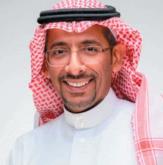
THE SECOND EDITION OF THE FUTURE MINERALS FORUM HAS BEEN HELD UNDER THE PATRONAGE OF THE CUSTODIAN OF THE TWO HOLY MOSQUES, KING SALMAN BIN ABDULAZIZ, WITH THE EVENT LOOKING TO DEVELOP DIALOGUE ON THE FUTURE OF MINERALS AND INVESTMENT IN MINING AND ENHANCE COLLABORATION THROUGHOUT THE REGION EXTENDING BETWEEN AFRICA AND WEST AND CENTRAL ASIA.
Several Saudi ministers revealed a diversified mineral portfolio, emphasizing that the Kingdom wanted to activate its natural riches and utilize them for peaceful reasons, as well as the transition to clean energy and future technologies.
His Excellency Mr. Bandar bin Ibrahim AlKhorayef, Minister of Industry and Mineral Resources, unveiled the completion of a whole industrial city to process aluminum
from raw materials and bauxite to final value-added products used in the automotive industry and food packaging. He stated that the Kingdom has succeeded in developing an indispensable and significant role in the mining sector, initiating a productive discourse in the industry and achieving rewarding cooperation between different countries.
According to al-Khorayef, the Forum was an effort to bridge the gap in the mining sector
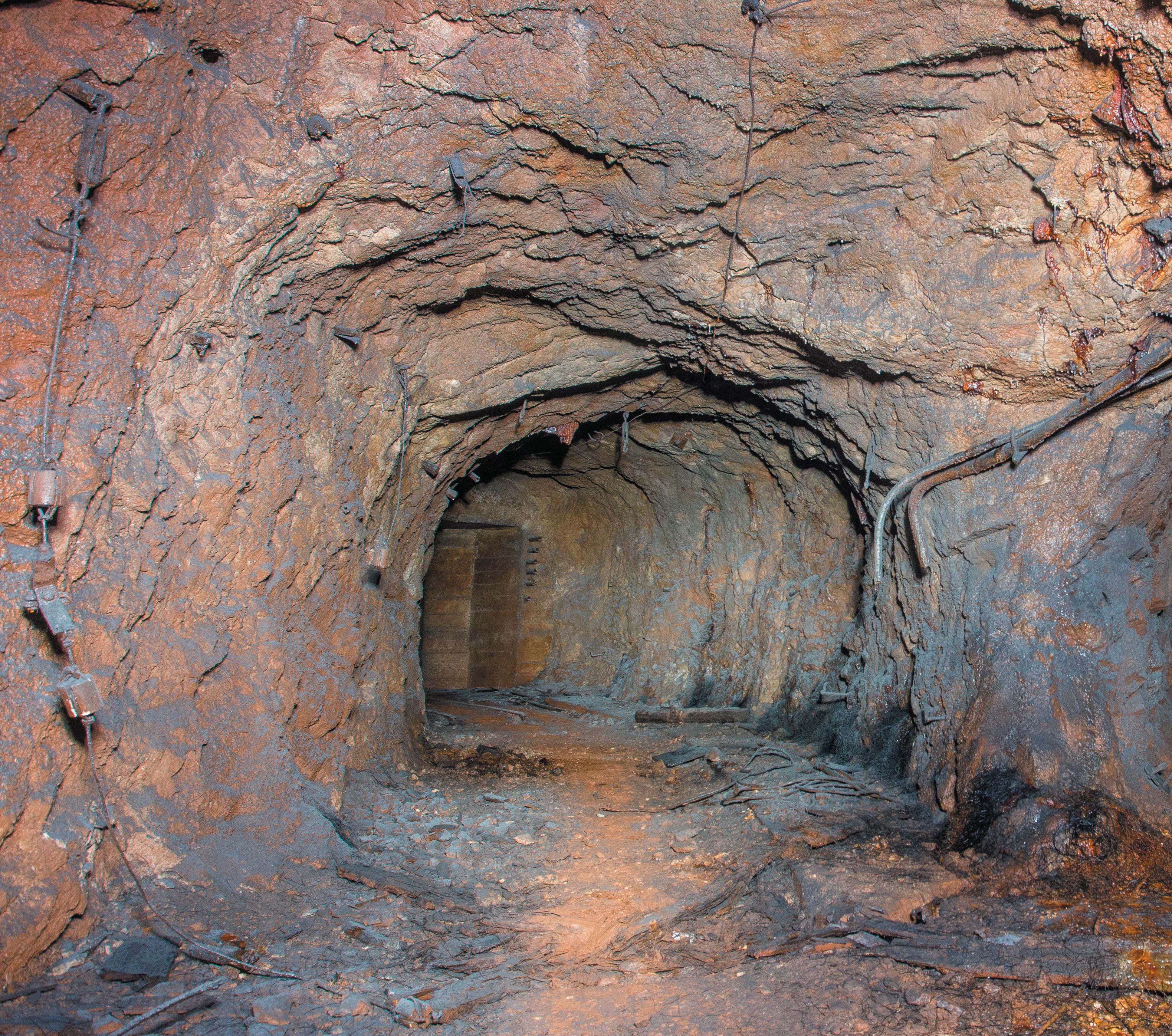
while progressing Saudi Arabia's minerals strategy. He noted that Africa, Central, and West Asia account for 33% of the world's mineral resources, but that the region needs a platform for companies, institutions, and organizations to collaborate. "Our region lacks a platform that brings together relevant parties from governments, the mining sector, companies, financial establishments, civil society organizations, service providers, and academic circles."
He emphasized that the platform would also expand the region's contributions to global mineral supply chains while ensuring that this is done in the best possible way and with the most potential social and economic benefit.
The Forum drew 2,000 participants from 130 countries and 200 speakers, including state officials, industry workers, investment executives, technology suppliers, and intellectuals.

Khorayef explained that as part of Vision 2030, the Kingdom has devised a number of programs to assist the mining sector. He highlighted that authorities had completed a thorough evaluation and update of the mining investment system, which serves as the sector's regulatory foundation and provides a transparent and straightforward environment for investors.

His Excellency, Mr Bandar Al-Khorayef, Minister of Industry and Mineral Resources, unveiled the completion of a whole industrial city to process aluminum from raw materials and bauxite to final value-added products
ERCO, A BRITISH TRANSPORT, DEFENSE, AND PUBLIC SERVICES PROVIDER, HAS ANNOUNCED ITS 2023 BUSINESS OUTLOOK FOR SAUDI ARABIA, WHICH PREDICTS DEVELOPMENT IN THE OUTSOURCING INDUSTRY, THE SPACE SECTOR, FIRE AND RESCUE SERVICES, AND THE EMERGENCE OF A ONE-CONSULTANCY APPROACH.
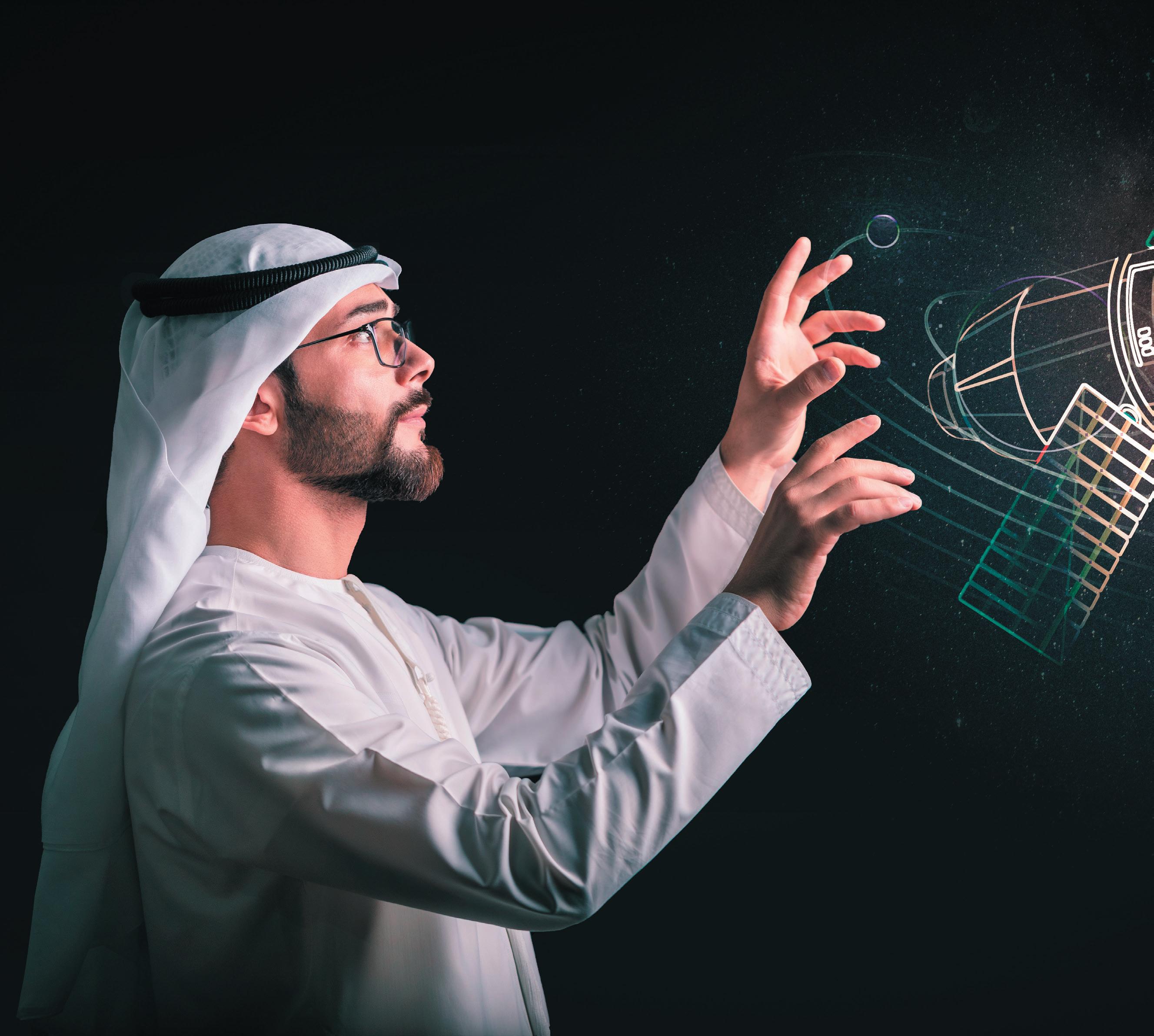
According to Serco Institute, the company's research arm, 76% of respondents in the Kingdom believed that the government should collaborate with overseas enterprises to improve service quality and cut costs, stating: “The need for delivering improved customer experiences across all fronts, at the same time as increasing flexibility and ensuring cost efficiencies, outsourcing will become paramount for the public and private sectors alike.”
It suggested that the space sector will receive increased attention in the Middle East throughout 2023, notably in the Kingdom. Space exploration has been shown to be an effective catalyst for technological advancement in a number of countries throughout the world. As a result, it will be equally important in this region, as technology transfer and the development of local science and engineering capabilities play an important role in countries' national goals.

Serco also anticipates a favorable shift toward privatizing fire and rescue services in the Kingdom, driven by generating world-class living conditions through the development of exciting new urban centers of excellence.
Many organizations have the difficulty of not specializing in fire and rescue services; however, it is a fundamental safety requirement that must be met, so considering outsourcing is becoming a practical imperative for decision-makers. This will gather momentum in 2023, with Serco’s dynamic approach to training allowing it to provide an accredited and certified fire and rescue workforce either through the use of its own training facilities, at its International Fire Training Center in the UK, in the Middle East, or at client facilities.
The study was also upbeat about growing Environmental, Social, and Governance (ESG) developments in the region. With the recent hosting of the UN Climate Change Conference in Egypt and the upcoming one in the UAE, ESG strategies will become a strategic priority and a business imperative for many enterprises and organizations.
Despite the ubiquity of greenwashing in corporate reporting, there will be a concerted shift toward incorporating ESG indicators as a fundamental component of yearly reporting procedures. This will be driven by two major elements.

To begin with, many employees, particularly the younger generation entering the employment market, choose firms with a clear mission. As a result, individuals need to feel empowered by an attachment to strong business values, and ESG will become a vital element of this fabric in the region moving forward.
In the case of Saudi Arabia, this means not just setting the highest possible standards, but also creating possibilities for young job seekers. Consequently, strong nationalization rules are critical to ESG in the Kingdom and elsewhere.
Second, the study indicated that there will be a greater emphasis in the region on advisory services to assist various entities and companies in embracing and implementing relevant ESG practices into their organizations, not as a ‘nice to have’, but as a fundamental strategic imperative, as legislation and operating standards will demand a stricter adherence to critical ESG measures.
If these forecasts come true, the Kingdom can expect to make significant progress toward achieving the Vision 2030 blueprint and reinforcing its position as a regional industrial hub and economic powerhouse.
ESG strategies will become a strategic priority and a business imperative for many enterprises and organizations
76% of respondents in the Kingdom believed that the government should collaborate with overseas enterprises to improve service quality and cut costs
HKA, a leading global consultancy in risk mitigation, dispute resolution, expert witness, and litigation support services, has announced the appointment of Husam Gawish as Head of KSA Operations.
To support HKA’s strategic growth area in the Kingdom of Saudi Arabia and following the successful launch of the HKA Riyadh office last year and with its existing Jeddah office, the firm is delighted to announce that it is strengthening its local business organization.
“We are pleased to announce Husam Gawish, Partner, will be relocating to head the HKA Operations in Saudi Arabia. Husam’s valued experience will further enhance the regional growth strategy, leveraging our in-Kingdom decade-long track record and working closely alongside John McKevitt, Partner, and Tim Whealy, Partner, forming a strong three-
partner leadership team,” explains Haroon Niazi, Partner, and Head of Middle East.

“HKA has an exciting growth strategy in the Kingdom and working alongside an experienced and strong team, I look forward to helping strengthen HKA’s operations to achieve the best possible outcomes, whilst always delivering exceptional services to our clients at all times,” said Husam Gawish.
Jad Chouman, Partner & Head of Middle East, said: “We are confident that with this new structure, HKA will be best placed to service our valued clients, who are contributing to the significant growth of the construction industry within the Kingdom.”
Rick Hopper has been named as Mott MacDonald's new managing director for the Kingdom of Saudi Arabia.
Rick will collaborate with important public and private sector clients and partners to drive sustainable development in the kingdom, expanding on the firm's track record of success in the infrastructure, energy, transportation, and building markets.

Rick has a thorough understanding of KSA’s ambition for growth and development, having spent the previous six years in Riyadh in operational leadership and strategic business development roles for consultancies AECOM and Atkins.
A Fellow of the Chartered Institute of Building, Rick has over 25 years of experience leading design and construction supervision teams,
with 15 of those years spent in the Middle East and the rest in the United States and the United Kingdom.
Rick will oversee Mott MacDonald's Saudi operation as it enters a critical new phase of development as a newly formed separate entity headquartered in Riyadh.
He will position the company to deliver strategic guidance and early-stage engineering consultancy to major Saudi clients, drawing on Mott MacDonald's leadership of prestigious infrastructure and development projects across the world and deep industry expertise.
“HUSAM’S VALUED EXPERIENCE WILL FURTHER ENHANCE THE REGIONAL GROWTH STRATEGY”
KEO International Announces New Appointment
KEO International Consultants has announced the appointment of Jason Morris as the new Managing Director of its Project and Construction Management division.
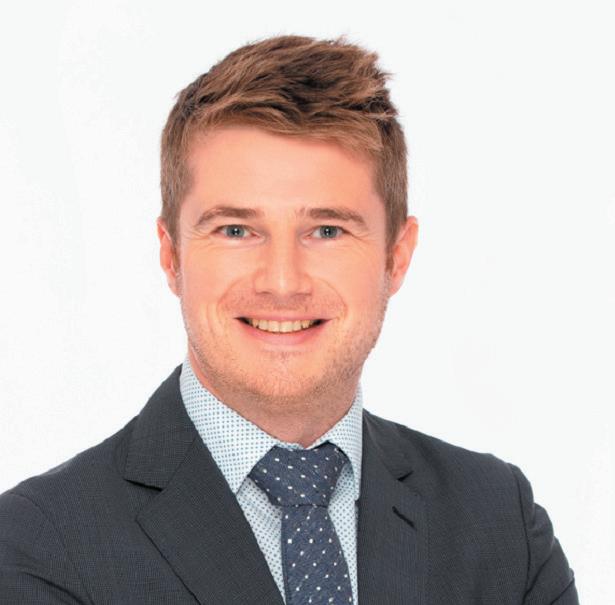
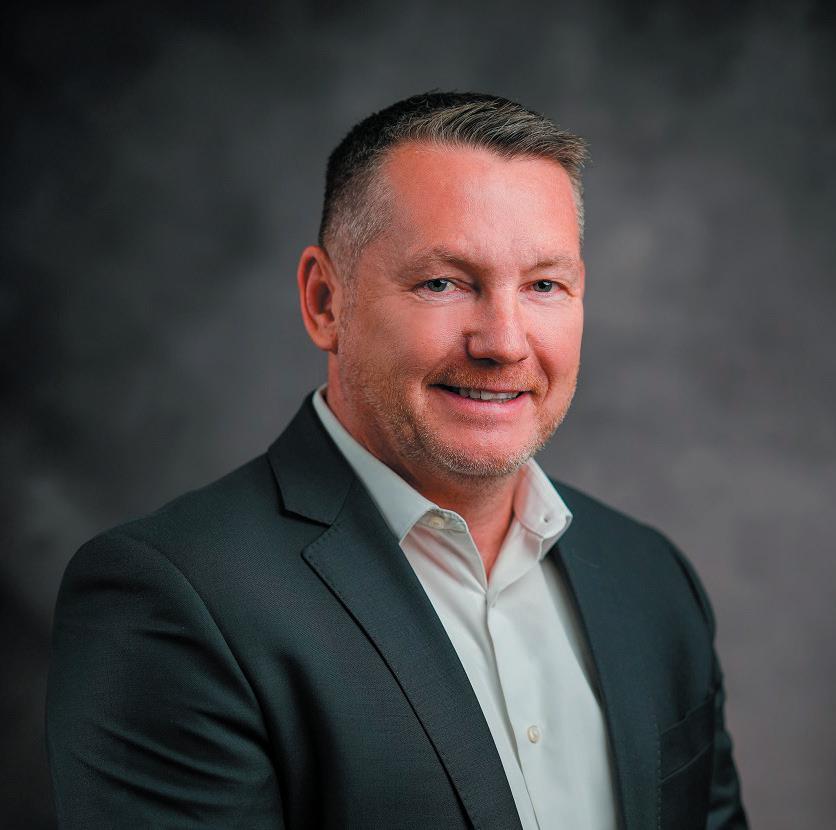
Prior to joining KEO, he worked for a worldwide multi-disciplinary consulting business for 18 years, rising to the position of Vice President in the delivery of PMC services in Saudi Arabia, Qatar, Australia, and other GCC countries.

His qualifications include an MBA in Construction and Real Estate, BSc and Post Graduate Diploma in Project Management, and
he is a member of the Association of Project Management, the Construction Management Institute of America, and the Australian Institute of Project Management.
Commenting on his appointment, Morris said: “I am excited to be joining KEO, an organization that shares so many of my own values. The legacy that KEO’s PM/CM teams have thus far forged in the region provides the perfect springboard for continued growth.”
JASON MORRIS WILL BE RESPONSIBLE FOR OVERSEEING KEO’S INTERNATIONAL OPERATIONS
Compass Project Consulting has appointed Richard Cushnan as the new regional director of construction management.
With over 25 years of experience in the industry, including a decade in the Middle East, Richard is set to lead the firm’s evolved construction management service
line, developed in response to increasing demand from clients for turnkey solutions to their construction and fit-out needs.
RICHARD IS SET TO LEAD THE FIRM’S EVOLVED CONSTRUCTION MANAGEMENT SERVICE LINE
Turner & Townsend, a professional services company, has named Lindsey Malcolm as its new Middle East sustainability lead. Lindsey, a Chartered Engineer and experienced leader in sustainable design and strategy development, has worked in the built environment for over 15 years in the UK, Europe, the Middle East, and Asia Pacific.
“Within my new role, I plan to play my part in delivering a commitment to transformational change across the wider industry,” Lindsey commented.
LINDSEY HAS WORKED IN THE BUILT ENVIRONMENT FOR OVER 15 YEARS
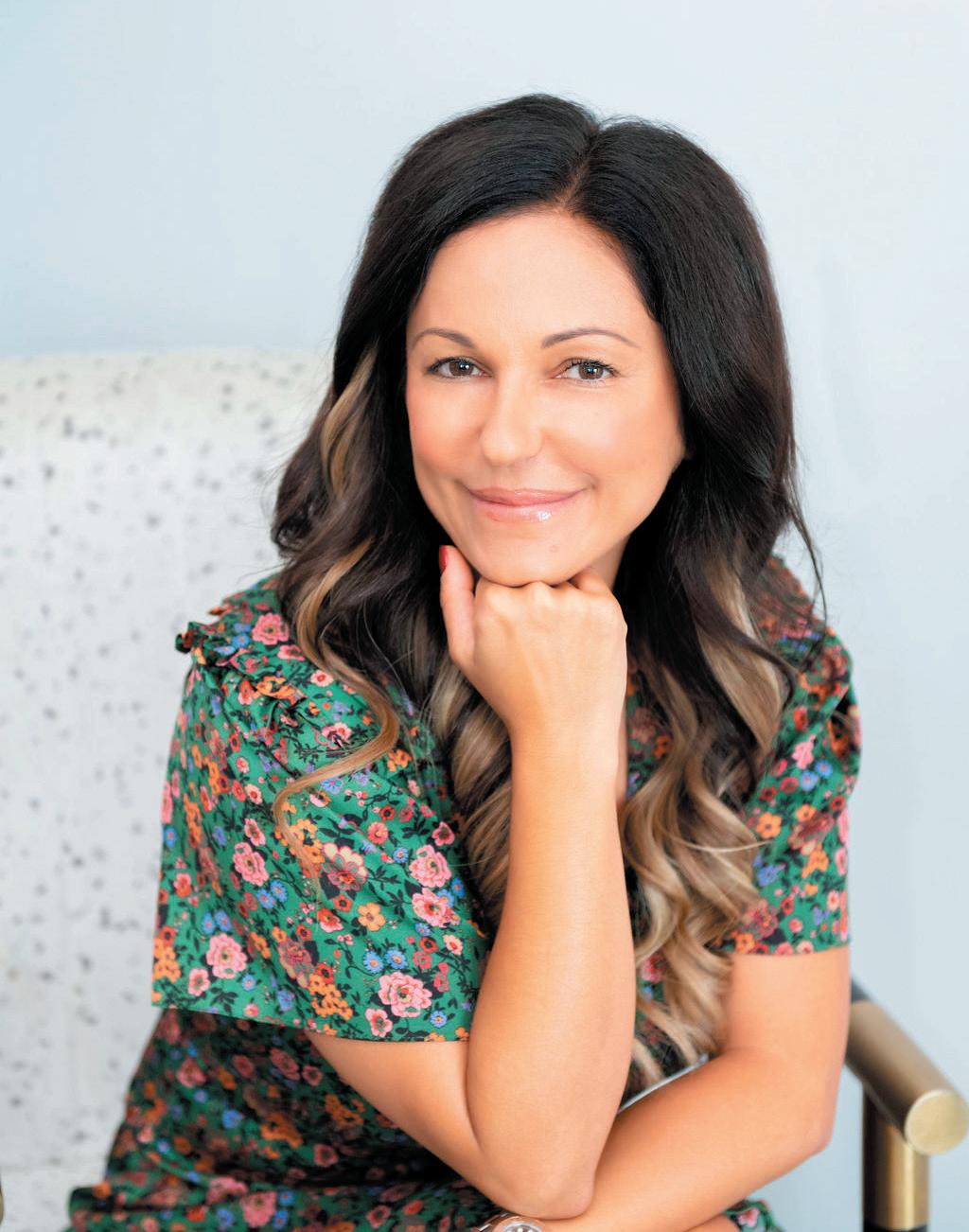
WILD, THE REVOLUTIONARY FEMALE NETWORKING PLATFORM, COMES TO KSA FOR ITS SECOND WILD RIYADH EVENT ON 28 FEBRUARY FROM 8.30 AM TO 10:30 AM AT VOV GAMING, THE ZONE. A LINE-UP OF FEMALE GUEST SPEAKERS WILL OFFER THEIR VIEWS, KNOWLEDGE, EXPERTISE, AND INSPIRING STORIES OF HOW THEY SURMOUNTED HURDLES IN THEIR LIVES AND CAREERS, PAVING THE WAY FOR GENDER EQUALITY IN THE REGION.


The guest speakers include the Founder and CEO of WILD – Emma Burdett; Director of Architecture, Red Sea Global – Reem Abuzeid; Project Director, Diriyah Company – Theresa Maher; Associate at PIF – Noha Zagzoug; and Group Chief HR Officer, ROSHN – Nasreen Al-Dossary. Participants can expect to hear from and network with current and future leaders in the region. The event will highlight the significance of creating communities in which women can engage, connect, be heard, and prosper, all critical elements in the pursuit of gender equality.
Emma has been in the region for nine years, working in the corporate sector, initially in the manufacturing industry. “My degree is in supply chain management, although I’ve always had business development roles,” she explains. “I founded WILD in 2018 and wrote the concept from scratch after creating a smaller women’s network in 2016 on behalf of a company I worked for. I spotted a niche in the Middle East for a women’s platform to bring both existing and future leaders together, to share knowledge and expertise, collaborate and support one another in the quest for gender equality. WILD is for the corporate woman.”
The event partner for WILD Riyadh is the design and build company, INC Group, which worked on the host venue. “It is a traditional gaming center with gaming seats and huge screens. The message overall is gaming is not just for men,” Emma says.
Nermeen Zeineddine, Design Lead – KSA at the INC Group, states: “The INC Group is pleased and excited to support this second WILD event in KSA. At the INC Group, being a female-led workforce, we believe in the importance of women in the workplace and the added value they give to the spirit, productivity, and discipline of the office. Hence, the decision to get involved in WILD was an easy decision. At INC, we believe WILD is the perfect platform for all female colleagues and invited guests to connect, collaborate, and conquer in their lives and professional careers. It will help to continue to provide equal rights and empower all females to grow and pursue success in their respective careers. Stay Wild, Inspire More.”
“We are so incredibly excited about our expansion into KSA. This second event will see 100 women from the region come together, network with purpose and leave
feeling motivated and inspired. The event is also the official launch of our unique membership, WILD Women Collective. The only women’s platform to connect women across borders.” Emma concludes.
At INC, we believe WILD is the perfect platform for all female colleagues and invited guests to connect, collaborate, and conquer in their lives and professional careers
Participants can expect to hear from and network with current and future leaders in the region

The Business Quarter (BQ) in the Eastern Province is an elegant office park, built with the sole purpose of providing the ideal business environment.

Eight buildings, 160 offices, all supported with access to other facilities which include, business centre, lounge, prayer room, on site parking, meeting rooms, preschool, fitness centre, green areas, security, fit-out services, restaurant and more.
Pre-school Meeting rooms
Fitness centre Lounge
Fit out services Business Centre
Restaurants & Cafes

A
CONCEPTUAL FRAMEWORK FOR ZERO-EMISSION AND ZERO-WASTE
An ongoing international discussion on ecocity theory has taken shape and evolved as a relevant research subject over the past half a century, probing the future of urbanism and the very existence of the city itself.
Several architectural schools of thought have been instigated during this time. Technical Utopianism is one such discipline - a technological idealism that focused on a quick 'techno-fix,' as articulated, for example, in the work of Archigram - an avant-garde London-based architectural group formed in the 1960s that was neofuturistic, anti-heroic and pro-consumerist, drawing inspiration from technology in order to create a new reality that was solely expressed through hypothetical projects.
Other early writing on Green Urbanism may be found in Ebenezer Howard's 1902 book, 'Garden City of Tomorrow’, with the ideas within its pages having recently made a comeback due to their political and social agendas. In 1969, Reyner Banham, an English architectural critic and writer best known for his theoretical treatise ‘Theory and Design in the First Machine Age’ (1960) and for his 1971 book ‘Los Angeles: The Architecture of Four Ecologies’, put forward the idea that technology, human needs, and ecological difficulties should be considered essential components of design. At the time, these were radical thoughts and concepts.
As a result, nothing really changed for a while. Cities such as Tokyo, Sao Paulo, Mexico City, Mumbai and Beijing developed to become seemingly endless urban landscapes by the end of the twentieth century, with these megacities demonstrating the difficulty of systematic planning and strategic management. It was clear that something had to change, and slowly it has begun to happen.

Several architectural schools of thought have been instigated during this time - Technical Utopianism being one such discipline

There is a new Green Urbanism philosophy for the twenty-first century that attempts to convert current cities from fragmentation to compaction. The goal of eco-city theory is to improve the link between the city and nature, with Saudi Arabia leading this revolution, particularly with its giga-projects on the Red Sea coast.
Within this transformation, globalization, urban sustainability, ecology, communication technologies, and other related fields are being investigated by prominent sociologists and urban theoreticians. Of course, Green Urbanism is interdisciplinary by definition; it necessitates the collaboration of landscape architects, engineers, urban planners, ecologists, transportation planners, economists and other specialists, as well as architects and urban designers.
Green Urbanism strives to reduce the use of energy, water, and materials at every stage of a project’s lifecycle, including the embodied energy in the extraction and transportation of materials, their fabrication, assembly into buildings, and, finally, the ease and value of recycling when an individual building's life is over.


Today, an architectural design must embrace the use of energy in the city’s or building's upkeep and changes in use, in addition to the principal energy expended for its operation, which includes lighting and temperature regulation.
Every conurbation has its own distinct set of characteristics in terms of orientation, weather topography, noise, and air pollution, among other things. Climatic conditions are a fundamental influence in the design of any project and a major way of understanding the site and its context, which is essential at the beginning of any sustainable design project. And by working with the existing landscape, topography, and infrastructure, it is possible to optimize orientation and compactness to help reduce the city’s heat gain or losses, thus achieving a minimized environmental footprint.
Retaining complexity in the system (whether biodiversity, environment, or neighborhood design) is at all times desired, and a high degree of complexity is always advantageous to society. Refining the opportunities provided by topography and natural surroundings results in a city that is appropriately tailored to the local climate and ecosystem. Due to the unique qualities of each region, individual cities must develop their own methodologies and specialized schemes in order to achieve sustainability and capture the essence of the place.
Green Urbanism is largely common sense urbanism and must become the norm for all future city projects.
There is a new Green Urbanism philosophy for the twenty-first century that attempts to convert current cities from fragmentation to compaction
Cities such as Tokyo, Sao Paulo, Mexico City, Mumbai and Beijing developed to become seemingly endless urban landscapes

Many executives complain that in its current form, footprinting is becoming increasingly outmoded. Full assessments are timeconsuming - often taking many months of manual work for detailed life cycle assessments - and typically are unscalable. The analysis, which often covers only a portion of a company’s product portfolio, usually is divorced from the operational realities and day-to-day decisions that companies face.
Moreover, assessments are frequently a one-time exercise that needs to be updated every few years and often cannot be compared directly to competitor assessments, as methodologies can vary greatly.
Footprint assessments have been a key tool for companies in the Middle East that are trying to understand the environmental impacts of their operations, value chains, and products or services. They’re often used to assess multiple impact categories such as carbon emissions, water or land use, and resource depletion on the full journey from sourcing to manufacturing to use and disposal.
Large companies across the region rely on environmental footprinting techniques (including corporate reporting, lifecycle assessments, and environmentally extended input-output analysis) to back up sustainability claims and reporting, and the footprinting industry is growing as methodologies and standards proliferate. Growth is expected to continue as regulatory moves.

However, many companies find lifecycle assessments and other currently available footprinting techniques to be imperfect solutions. Companies need to choose from among many competing standards and
techniques when estimating greenhouse gas emissions, for example. And those choices vary depending on the situation. They depend on whether the company is measuring its own footprint, that of the entire value chain, or trying to assess the environmental impact of a single product or broader portfolio. Worse, the end results often can’t be compared across competitors or product categories and result in data that is not useful for strategic decision-making. And different footprinting methodologies lack compatibility.
More troubling, the time and effort dedicated to backward-looking measurement can distract companies from focusing on the necessary transformation of the business to a more sustainable future. When they deploy footprinting without a clear view of strategic goals, companies waste an opportunity to spur innovation and improve the customer value proposition or to inspire levels of commercial excellence that enable them to outpace competitors.
FEDERICO PIRO, PARTNER, BAIN & COMPANY, AND HARRY MORRISON, PARTNER, BAIN & COMPANYMany executives complain that in its current form, footprinting is becoming increasingly outmoded
The goal is to make environmental data on par with financial data to be used for day-to-day decision-making and reporting. Rather than estimating data across a product’s lifecycle, for example, companies will receive upstream data directly from suppliers and in turn provide environmental data to their customers at the point of sale. Data collection and tracking systems will be scalable, dynamic, and fitfor-purpose - designed with the strategic imperative and commercial motion in mind.
In the future, there will be a blurring of lines across methodologies, with a need to slice data in different ways to answer different questions (such as looking at the carbon impact of a product across its lifecycle for a product environmental label and looking at the carbon emissions of a company over the course of a year for reporting on progress on science-based targets). Critically, leaders will move from backward-looking
measurement to forecasting and scenario analysis capabilities. Environmental data will be tracked through a tech infrastructure built on common approaches that enable high levels of comparability and calculate product or company footprint data at scale.

That’s the quickly arriving future. As these capabilities swiftly evolve, winning companies will be those that set out to take full advantage even before a footprinting effort begins, using it as an opportunity to propel change at an unprecedented scale and pace.
For starters, they will differentiate by designing IT systems that serve their own specific operational and commercial outcomes. Going far beyond the step of measuring footprints, they’ll run an effective change management process to build the internal tools and capabilities they need and embed real-time environmental data into day-to-day decisions. Ultimately, what’s more important than the data is how leaders use it to develop more sustainable products, meet customer needs, and enhance their value chains. Success depends on leveraging data together with other capabilities, including commercial excellence, product R&D, pricing, and channel strategy, to create more sustainable and successful models. Without a clear plan to translate footprint data into customer value, it will remain largely an academic exercise. The best companies will establish a roadmap
to use their data to inform transformation across the value chain, creating market demand and attractive commercial models.
Companies also will need to find ways to engage consumers through different value propositions. To that end, environmental impact data will allow them to provide consumers with facts on the impact of new products and to clearly articulate product benefits with a solid communications plan and marketing messages. But to advance to the next level, they also need to identify the right customer segments and the key issues for each, and to rely on the data for insights that will inform pricing and channel strategies.
And companies will need to create lowerimpact value chains. After understanding how different packaging materials or different feedstocks provide lower-impact options, for example, building a successful sustainability strategy requires that companies engage with suppliers and develop the right commercial model, balancing cost and impact. These are moves that draw on a company’s cost management muscles as well as procurement and supply chain strategies.
As footprinting becomes more common, more complex, and more aligned with operations, winning companies will avoid the trap of focusing too heavily on the data instead of the end goals.

The goal is to make environmental data on par with financial data to be used for dayto-day decisionmaking and reporting

REGIONAL LEADER IN DESIGN-BUILD CONSTRUCTION, GROUP AMANA HAS MARKED A MAJOR MILESTONE AS IT HAS DELIVERED ITS FIRST-EVER VERTICAL FARM IN THE REGION, WHICH WILL BOOST LONG-TERM FOOD SECURITY AND SELF-SUFFICIENCY IN THE UAE.
The high-tech hydroponic facility in Dubai South was constructed by AMANA Contracting in collaboration with Crop One Holdings and Emirates Flight Catering (EKFC). The $40 million Bustanica hydroponic farm, which spans 330,000ft2 and is located in Dubai World Central, will produce more than a million kilos of high-quality leafy greens with 95% less water than conventional farming and will boost the UAE’s food security. The produce will be available on certain Emirates flights and for consumers to purchase across stores in the UAE under the Bustanica brand.
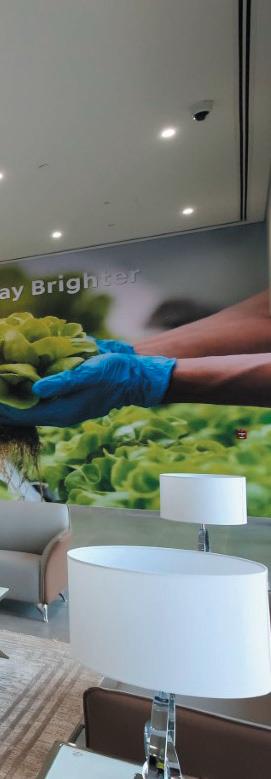

Joe Labaky, General Manager of UAE and Emerging Markets, AMANA Contracting, said: “AMANA continues
to push the boundaries of innovation using the latest building techniques. Being a part of a revolutionary project in the UAE’s agriculture industry to ensure long-term food security and strengthen national resilience is a great privilege for the AMANA team.”
To construct the world’s largest vertical farm, AMANA brought in the best and latest innovations in building and construction. The construction leader executed and installed specialized systems to ensure maximum sustainability and environmental conservation. The project was completed on time, by leveraging advanced to maximize output on-site.
The $40 million Bustanica hydroponic farm, located near Dubai World Central, will produce more than a million kilos of highquality leafy greens with 95% less water than conventional farming

AMANA Contracting delivered the project while adhering to the highest quality and safety norms, using off-site construction techniques. The company executed and installed specialized systems throughout the project, such as LED lights in the grow room and germination room, grow fans, grow room controls, pack house equipment, grow kit, racking, nutrient dosing systems, and germination room equipment, among other facilities.
AMANA leveraged BIM technology to develop all the workshop drawings and executed MEP using offsite construction. Given that modular techniques are more efficient, leaner, and result in less waste production, AMANA ensured that the project was executed in the most sustainable way possible. AMANA also achieved a milestone of 1+ million work hours without any LTI at the project.
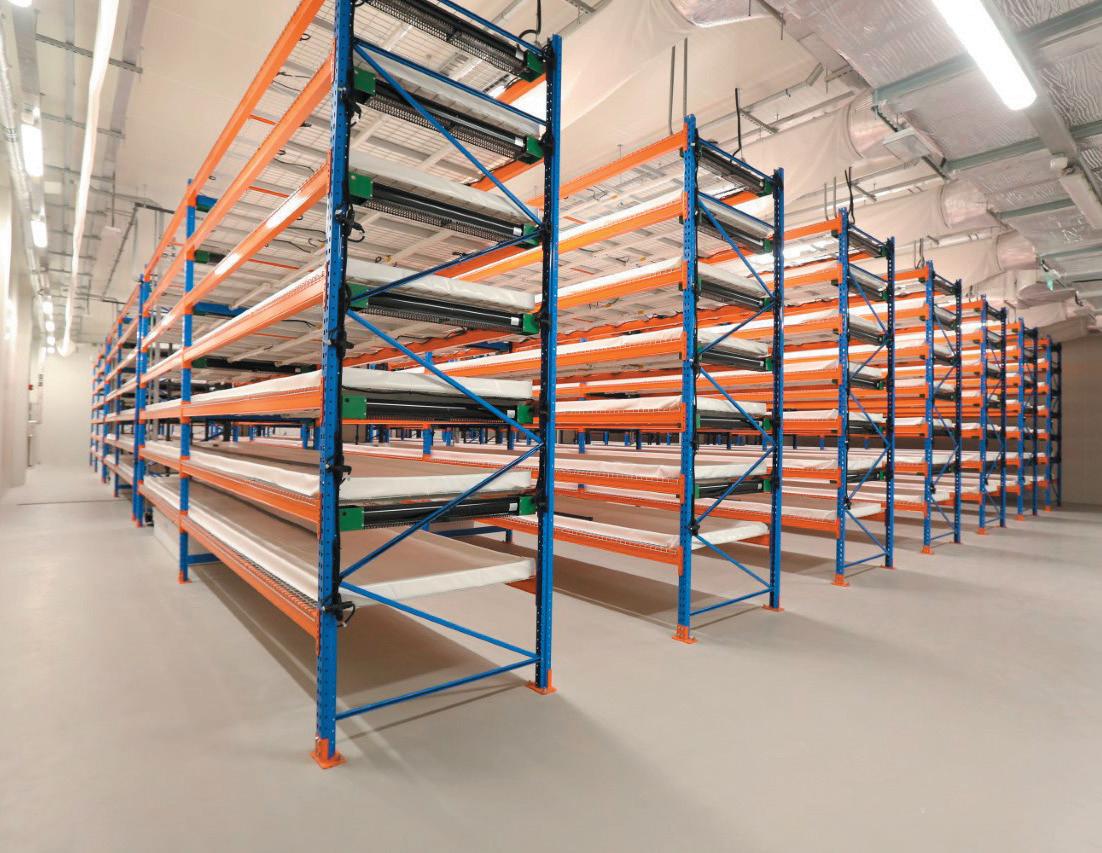
Offsite construction is becoming increasingly popular because the industry has recognized that it is a time-saving, no wastage, super safe and clean process that benefits all stakeholders – clients, contractors, the workforce, and the environment. The turnaround time on the projects is shorter and cost overruns are significantly reduced. It also improves workplace safety and reduces environmental impact when compared to traditional on-site construction. This made it the most ideal building solution to develop the world’s largest vertical farm here in the UAE. Last month, Group AMANA revealed its revitalized brand identity. Now organized into three verticals: Construct, Manufacture and Enhance, the transformation reflects the Group’s offerings for an evolving business landscape and the drive to build cleaner, greener, and smarter. AMANA has built a formidable reputation over three decades of operations in the region, with its commitment to sustainability, innovation, and digitalization.
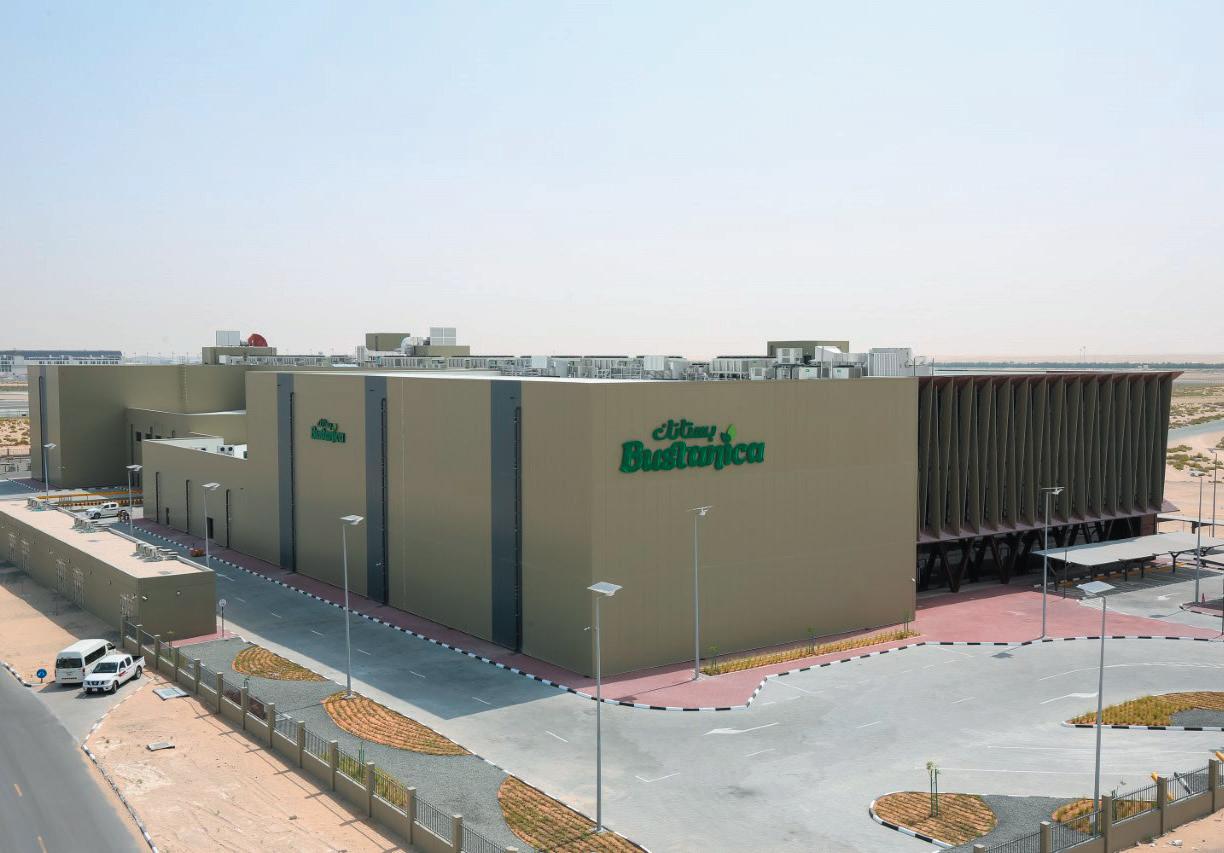
The 330,000ft2 facility was built using innovative off-site construction methodologies, saving time, reducing waste, and reducing work hours
AMANA also achieved a health and safety milestone of more than one million work hours without any lost time injury at the project
As a fast-growing multinational organization with employees spread across multiple geographies, it is important for us to drive seamless interconnectivity, offer remote accessibility, and implement a data-driven modern performance management and rewarding tool. With Oracle Cloud Applications, we can provide a consistent employee experience across devices, realize significant efficiencies across departments, and enable one source of truth for HR data to improve decision-making on one integrated platform spanning the entire employee life cycle, from hire to retire.
SP: How is BIM helping AMANA with projects? What are your most recent projects completed on BIM?
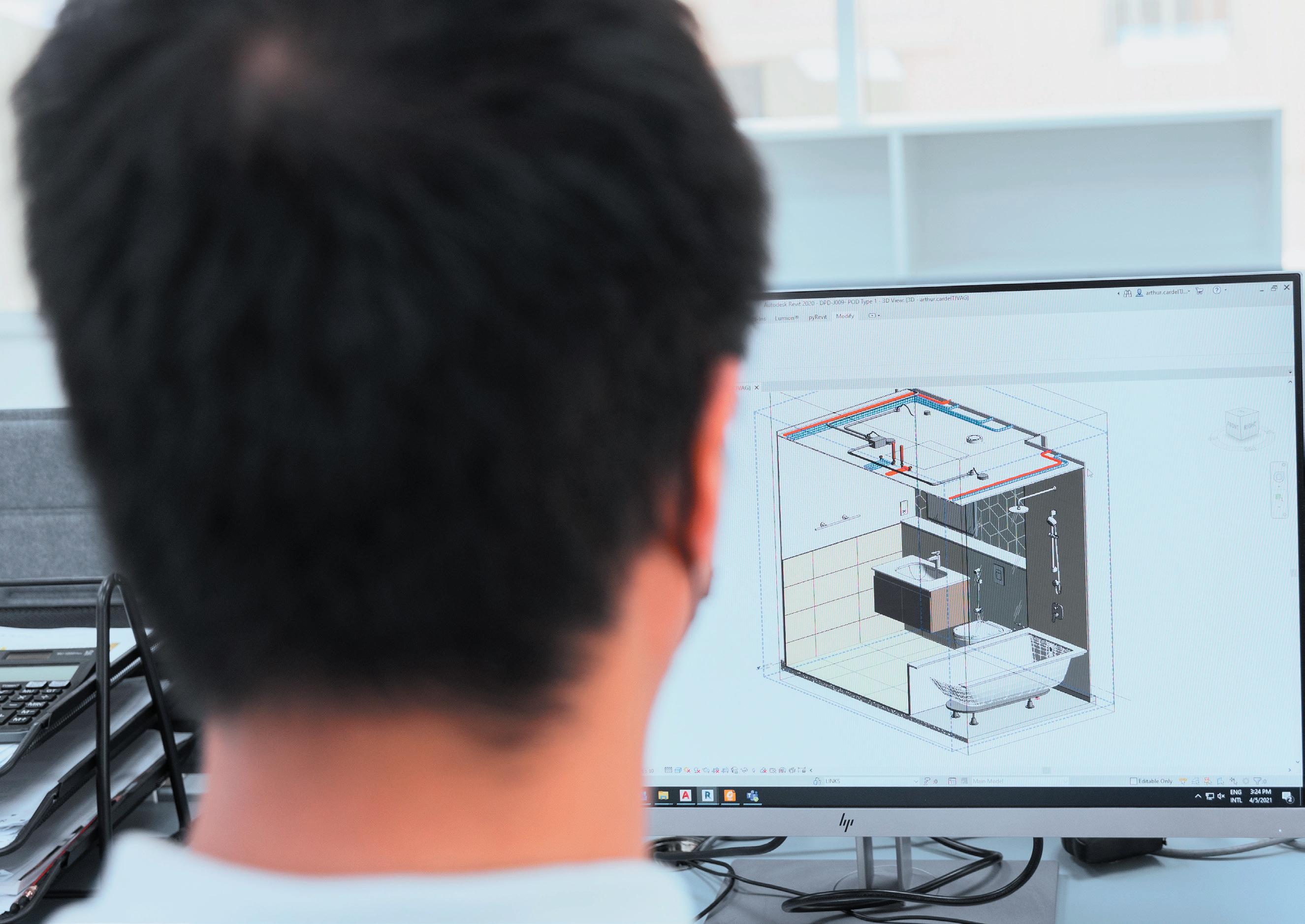
RA: AMANA has made significant investments in digitalization, migrating to the Revit BIM platform to enable integrated project delivery, shortening production cycles, and fostering collaboration amongst various departments. Recently, we leveraged modular construction to deliver the world’s largest vertical farm – Bustanica – in Dubai South, spanning 330,000ft2. It was built using innovative off-site construction methodologies such as BIM, saving time, and reducing waste and work hours. We’ve used intelligent solutions across several key projects for clients such as Red Sea Global, NEOM, Nupco, and Veolia in Saudi Arabia.
SP: What technology is at the center of AMANA strategy?
RA: I would say BIM has been a key enabler for AMANA’s digital transformation initiatives, helping us to fulfil our goal to build more efficiently.
“We’ve used intelligent solutions across several key projects for our clients such as The Red Sea Global, NEOM, Al Muhaideb Group in Saudi Arabia.”
This technology has enabled us to design and integrate our key projects in Saudi Arabia for Red Sea Global, NEOM, Nupco, and Veolia. Our project delivery team worked with engineers in different offices and countries to design and build in real-time as both design and construction progressed, enabling us to deliver the project in record time.
SP: What do you think are the major challenges in digital transformation?
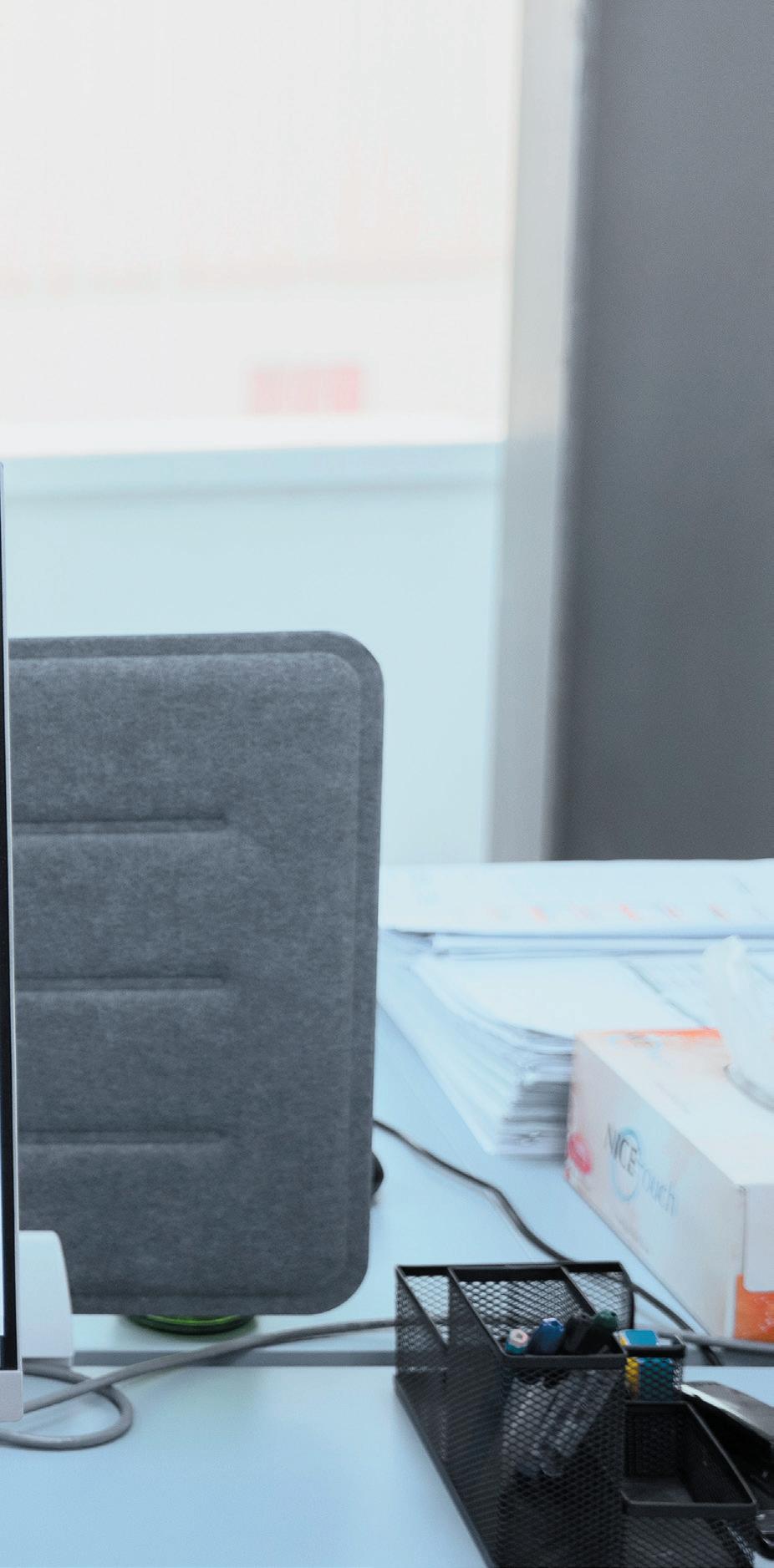
RA: Overhauling legacy systems is a challenge. In some instances, financial constraints and lack of proper training also affect digital adoption. But project managers must leverage software to make their construction business more interconnected and agile, both internally and externally. The industry will also need to look beyond the obvious cost and efficiency benefits of digital transformation and see how it is driving many environmental benefits.
SP: What do you think the construction industry will look like five years down the road if digital transformation has the impact that is envisaged?
RA: The benefits of true digital transformation are enormous for the construction sector. Innovation, the adoption of new technologies like AI and robotics, and a shift towards sustainable practices will put the construction industry on the fast track to growth. It’s time for the industry to recognize that the repetitive, simplified, and standardized factory operating process promotes safer, healthier, and cleaner working conditions, with far lower wastage rates than an open construction site. Encouragingly, the regional construction industry is also improving its performance on sustainability, diversity, and inclusion by increasing investments in connected construction, leveraging technology, and innovative methodologies. The future over the next five years looks quite promising for the regional construction industry if more technology is adopted to boost efficiencies.
SP: What other emerging technologies do you currently have your eyes on in the construction sector?
RA: Robotics, AI, and ML are shaping the future of construction. The use of technology in the construction sector is expanding quickly with the goal of improving productivity and sustainability on the job site. Construction robotics and connected construction site are examples of developing technologies. At AMANA, our focus will be on start-ups and scaleups that foster innovation and boost intelligence in these fields, but it's also crucial to maintain a shared data environment where data from building initiatives is preserved and easily accessible to everyone.
As the GCC is accelerating towards a decarbonized future, the construction industry, responsible for one-third of global carbon emissions, will play a key role in fulfilling green agendas for a circular economy.
“As a fast-growing multinational organization with employees spread across multiple geographies, it is important for us to drive seamless interconnectivity, offer remote accessibility, and implement a data-driven modern performance management and rewarding tool.”
“Encouragingly, the regional construction industry is also improving its performance on sustainability, diversity, and inclusion by increasing investments in connected construction, leveraging technology and innovative methodologies.”GROUP AMANA - VERTICAL FARM 35
OUNDED IN 1965 AND WORKING GLOBALLY WITH MORE THAN 4,000 CLIENTS ACROSS MORE THAN 29 PRACTICE AREAS SPANNING THE WORK, LIFESTYLE, COMMUNITY, AND HEALTH SECTORS, GENSLER IS THE BIGGEST PURELY ARCHITECTURAL, PLANNING AND DESIGN FIRM IN THE WORLD. OPERATING OUT OF 52 LOCATIONS AND WITH MORE THAN 7,000 TEAM MEMBERS NETWORKED ACROSS THE AMERICAS, EUROPE, GREATER CHINA, ASIA PACIFIC, AND THE MIDDLE EAST, GENSLER UNDERSTANDS THE NEED TO BE FLEXIBLE BECAUSE IDEAS, REQUIREMENTS AND AMBITIONS EVOLVE. IN OTHER WORDS, DESIGN IS NOT A PRESCRIPTIVE PROCESS, WITH THE FIRM ADAPTING TO SUIT A PROJECT’S NEEDS.


“Since we have 52 Gensler offices around the world, this provides the firm with a unique, broad view of its clients’ needs. There have been economic cycles up and
growth and success in the region, now having five studios with 90 staff and operations in the UAE and KSA, with a new Abu Dhabi location and the Riyadh office opening soon. Moreover, with 29 nationalities and
Gensler network, the firm serves a broad portfolio of discerning clients, including those from the governmental, large-scale development, and corporate sectors.

and hospitality to workplace design.
“We think our clients are really looking for the best ideas and we help them with that,” Stephanie says. “We are proud that
needs. It values personal relationships with its clients and takes immense satisfaction in being involved from project inception to completion and beyond.
Building and our award-winning Unified Real Estate Diplomatic Quarter Mall the 1364 project, in Riyadh. 1364 is a mixed-use development with a focus on retail and F&B that celebrates the pedestrian nature of our urban fabric.
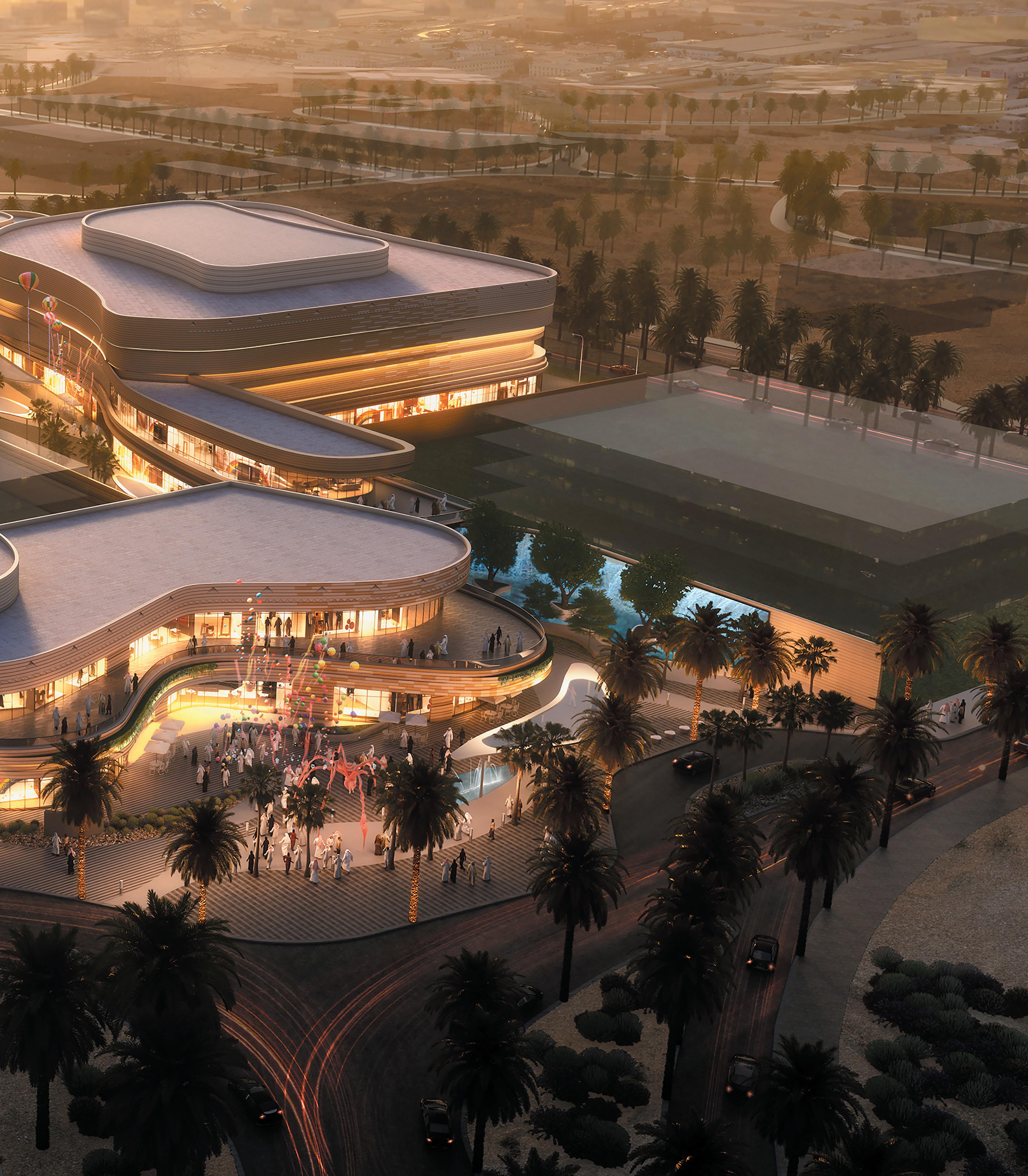



The concept of the project is inspired by natural strata formations prevalent in the rugged landscape that surrounds Riyadh. The curvilinear forms of the buildings entice breezes from the northwest for cooling as well as pedestrian movement into the main open central space.

Of course, addressing the various environmental concerns, including climate change, is the business imperative of our time, with Stephanie commenting: “The countries in the Gulf region are leading the way in the development of smart city plans as part of their economic diversification to develop safer and more livable cities with better infrastructure and services, as well as enhancing environmental sustainability by reducing pollution and protecting the environment.
“As governments continue to implement stricter regulations on emissions, designing for a more sustainable future that protects the long-term viability of investments, Gensler is forging ahead into this new era of smart sustainability. Our 2020 portfolio was already designed to save over 17 million metric tons of CO2 from being emitted on an annual basis - an important milestone on the path toward our firm’s aggressive goal of eliminating all carbon emissions in our work by the year 2030.”
The Gensler ‘numbers’ are impressive and include:
600+ million square feet of sustainable work
110 million square feet of LEED-certified projects

1.2 billion gallons of water saved annually
1,200+ LEED accredited professionals
With companies ever more focused on environmental, social, and governance considerations, the value proposition of resilient design is undeniable, with Gensler seeing design as a strategy in action, focused on results. “We help our clients envision a better future and get there successfully,” Stephanie says. “We help them leverage design’s power to generate innovative solutions that affect real transformation.”
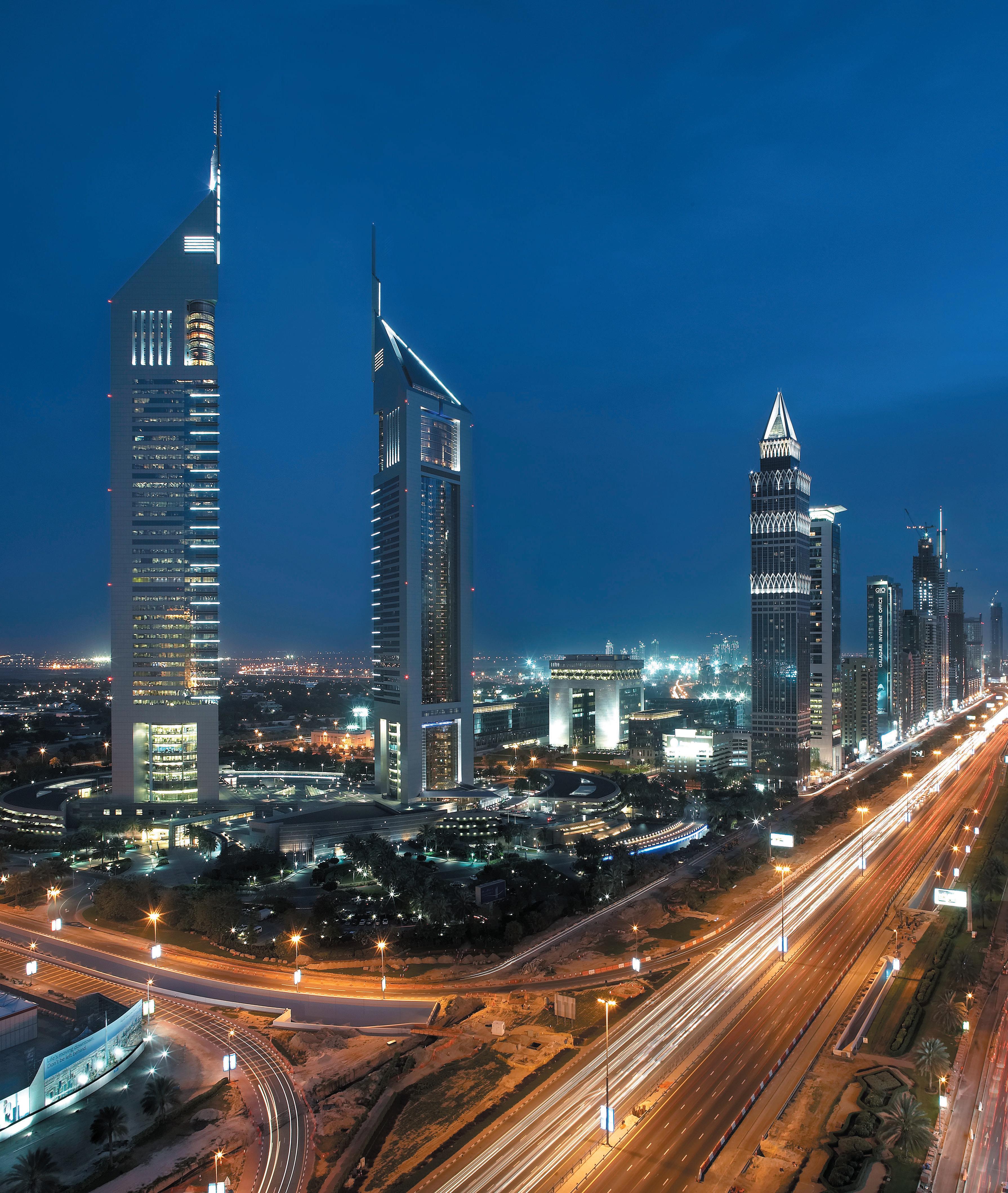
Construction output growth in Saudi Arabia is anticipated to rise by 3.2% in 2022, with a further annual average growth rate of 4% between 2023 to 2026 as indicated by Global Data. As of October 2022, the Kingdom held a 35% market share with a recorded $31 billion worth of contract awards against an overall MENA total of $87 billion as tracked by MEED Projects.
In the entertainment industry alone, there is significant growth and expansion, with film being a key focus of the Kingdom’s plan to develop its entertainment industry as part of the Vision 2030 initiative to diversify its economy.
Saudi’s focus on the entertainment industry is a strategy aligned with Gensler’s, with Stephanie saying: “We’ve just announced that Bob Weiss, the former president of Walt Disney Imagineering, has joined Gensler as our global immersive experience design leader.” During his time at Disney, Bob Weiss led more than 200 major projects around the world with a capital value of more than $30 billion.
Most successful companies are built on differentiation: offering clients something they value that competitors don’t have, and Gensler is no different, as Stephanie explains: “Design is constantly evolving, and our clients are facing different obstacles than they were 20 years ago. We support them by reacting to that change, which we achieve through a level of practice area specialization that differentiates us as experts. This includes our network of 29 practice areas, allowing us to provide specific expertise when and where clients need it.
“We are really focused on being local and understanding the local market, but our practice areas are set up in a network across the world. It is one of our guiding principles - we can’t be global if we are not local first.”
Gensler shares information on best practices all over the world, so a client doesn’t just see what’s going on in the Middle East, they see what is going on all over the world. This is driven to a large degree by the firm’s use of data, technology, and people.

“A key success factor is our data-driven insights,” Stephanie says. “With access to our Gensler Research Institute, we can predict upcoming trends based on data and incorporate those into our designs. This has allowed us to be one step ahead when providing counsel to our clients, extending our analysis, insights, and additional perspective into the original brief.”
Gensler is also using technology to help solve its clients’ design problems across all industries, with its teams writing programs around parametric design and automating the design process. It’s all about process innovation and looking into the future.
Finally, and most importantly, is Gensler’s people, with Stephanie concluding: “They are the reason we’re here, it’s what we thrive on and what makes us tick.
We grow and empower the industry’s top talent to pursue their passions and make a difference.”
Gensler approaches each project with a distinct value-driven mindset. Its extensive expertise means that it has learned how to do things more efficiently, designing for the human experience and tackling the toughest challenges facing today’s cities, thus shaping a more resilient and equitable future for everyone.
HAVING STAYED IN SOME OF THE FINEST SERVICED RESIDENCES AND HOTELS THE WORLD HAS TO OFFER, IN CITIES AS DIVERSE AS LONDON, NEW YORK, MILAN, DOHA, AND NEW DELHI, I WAS INTRIGUED TO SEE WHAT SAUDI ARABIA HAD TO OFFER; IN PARTICULAR, THE ASCOTT RAFAL OLAYA RIYADH, STRATEGICALLY LOCATED NEAR KING ABDULLAH FINANCIAL DISTRICT. I WAS NOT TO BE DISAPPOINTED.

An exclusive serviced residence providing efficient business support services and lifestyle facilities in a luxurious environment, Ascott Rafal Olaya Riyadh, housed in the Rafal Residential Tower, offers a selection of studios, and one and two-bedroom apartments, catering to both short and long-staying guests. Mine was a relatively short stay of just a few days, but immediately I loved the charm of Ascott Rafal Olaya Riyadh, which does not give the routine hotel chain vibe at all.
It was extremely accommodating too, allowing me to check in early, which was a big plus.
And there is no doubt that my apartment definitely had the ‘wow’ factor, with contemporary furnishings, a fully equipped kitchenette, and spacious dining, lounge, and bedroom areas that allowed me to live extremely comfortably - have you ever just melted into a bed?

In fact, the apartment was a genuine homefrom-home, incorporating everything you could ever need, from a coffee machine and a toaster through to a TV with a wide array of cable channels, excellent Wi-fi, and even a washing machine and dryer. And the central air-conditioning, with individually-controlled thermostats, was exceptional … and quiet.
The facilities were just as impressive, with an exclusive range of separate amenities for men, women, and children, including swimming pools, a spa and sauna, a gymnasium, a children’s playroom, a café, a prayer area, and a resident lounge.
And being in Riyadh on business, I was delighted with the meeting rooms (there are five in all), which are fully equipped to ensure that it’s easy to ‘get the job done’. Audio-visual equipment, business center services, courier and secretarial services, and superb Wi-fi were all readily available.


Ascott Rafal Olaya Riyadh is also home to two of the city's most well-known meet-and-treat destinations, Opaline and Don Puro, which deliver some of the best bites in town, whether you're seeking exquisite Lebanese food or gourmet specialties. The atmosphere and service were great, with the staff going above and beyond to make the entire experience something that I won’t forget in a hurry.
And if all that were not enough, there is 24-hour reception and room service, an airport transfer service, a laundry and cleaning service, a basement car park, a daily housekeeping service, a grocery shopping service, and valet parking. Of course, there are fees to pay for some of these services, but the prices were very fair and the services themselves were beyond reproach.
My apartment definitely had the ‘wow’ factor
There’s an excellent rewards program too


By now, you might have caught onto the fact that I quite enjoyed myself at Ascott Rafal Olaya Riyadh! So, who exactly are these people? Well, Ascott Rafal Olaya Riyadh is one of The Ascott Limited's premium collection of hotel apartments in over 180 cities in the Americas, Asia Pacific, Europe, and the Gulf region. It is a member of CapitaLand and the global leader in branded serviced apartments, with over 30 years of experience in assisting travelers who work and live away from home. There are a variety of apartment configurations and room sizes, including Studio Executive, 45-53m2; OneBedroom Deluxe, 70-79m2; One-Bedroom Executive, 85m2; One-Bedroom Premier, 96m2; and Two-Bedroom Executive, 121m2 There’s an excellent rewards program too, which allows members to enjoy the lowest rates, exclusive discounts, and a wide range of perks.


Audio-visual equipment, business center services, courier and secretarial services, and superb Wi-fi were all readily available
THE NEW ASCOTT STAR REWARDS PROGRAM OFFERS POINTS EARNED WITH EVERY SINGAPOREAN DOLLAR (SGD) SPENT ON STAYS. EARNED POINTS PLUS TIER POINTS TAKE IN:

Classic: Join for FREE – 10 points
Silver: SGD 1,000 (SAR 2788) – 12 points (20% bonus)
Gold: SGD 3,000 (SAR 8364) –44 points (40% bonus)
Platinum: SGD 10,000 –16 points (60% bonus)
MEMBERS’ EXCLUSIVE BENEFITS INCLUDE:
Earn ASR points for every SGD 1 spent on stays
10% off Best Flexible Rates all year round
Seasonal offers of up to 50% off the Best Flexible Rates
Birthday discount e-voucher
Room upgrades (subject to availability)
Complimentary airport transfers
Complimentary breakfast
Early check-ins and late checkouts (subject to availability)
So, there you have it - Ascott Rafal Olaya Riyadh. I had a great experience; the staff were incredibly helpful, the apartment was wonderful, and the amenities were great. And now I’m a member, I’ll be returning every time I visit the Kingdom’s diverse and dynamic capital city!


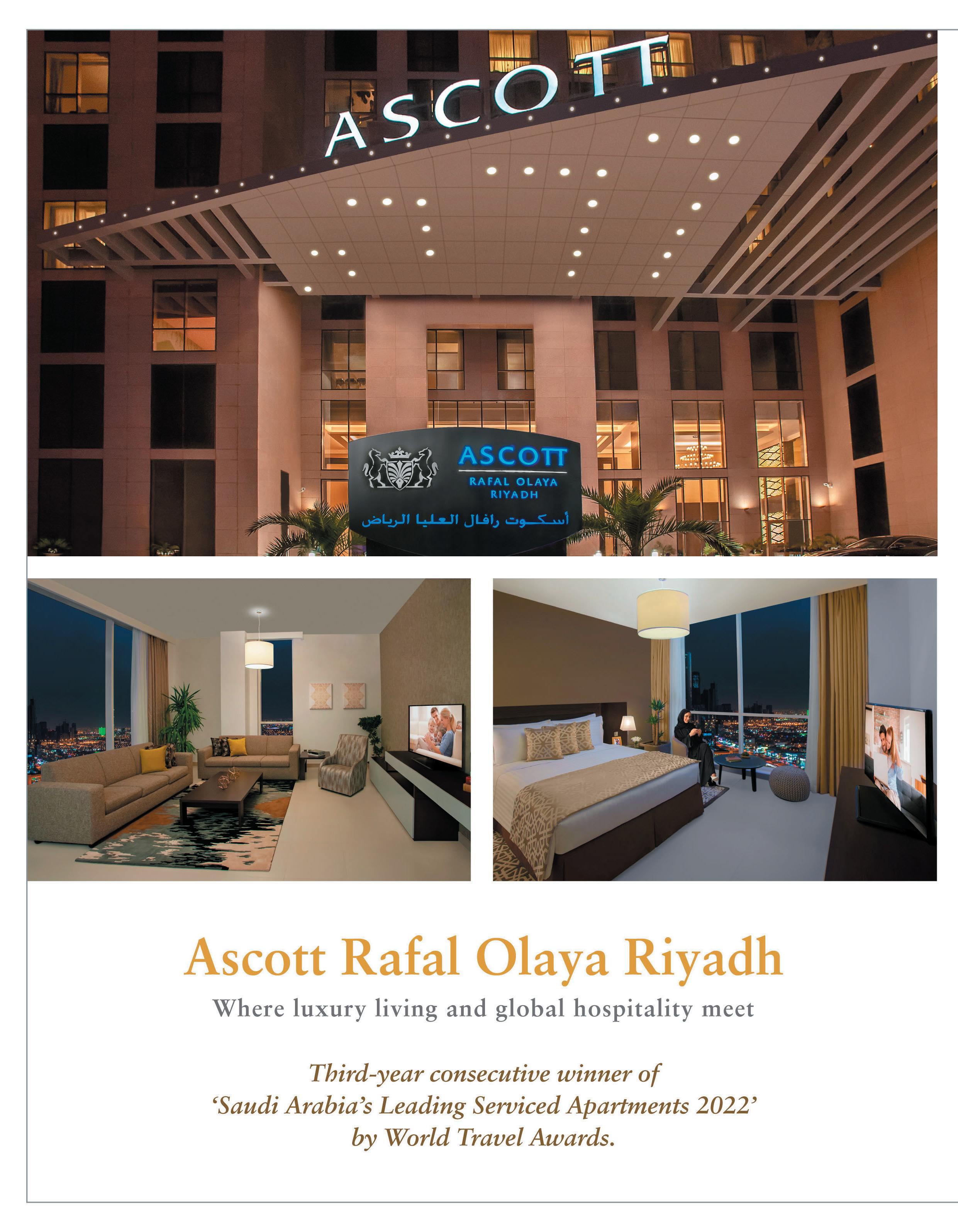

GETTING TO KNOW RICHARD ABBOUD, SENIOR VICE PRESIDENT AT GROUP AMANA
THE STANDARD EXPLANATION CONCERNING DIGITAL TRANSFORMATION IS THAT IT IS A CUSTOMER-DRIVEN, DIGITAL-FIRST APPROACH TO ALL ASPECTS OF A BUSINESS. BUT WHAT EXACTLY DOES THAT MEAN IN THE REAL WORLD? SAUDI PROJECTS SPOKE TO RICHARD ABBOUD, SENIOR VICE PRESIDENT, GROUP AMANA, TO FIND OUT MORE, DIGGING A LITTLE DEEPER INTO HOW IT LEVERAGES DATA, FOSTERS FASTER AND SMARTER DECISIONMAKING, AND ULTIMATELY CHANGES CUSTOMER EXPECTATIONS AND ENHANCES NEW OPPORTUNITIES.

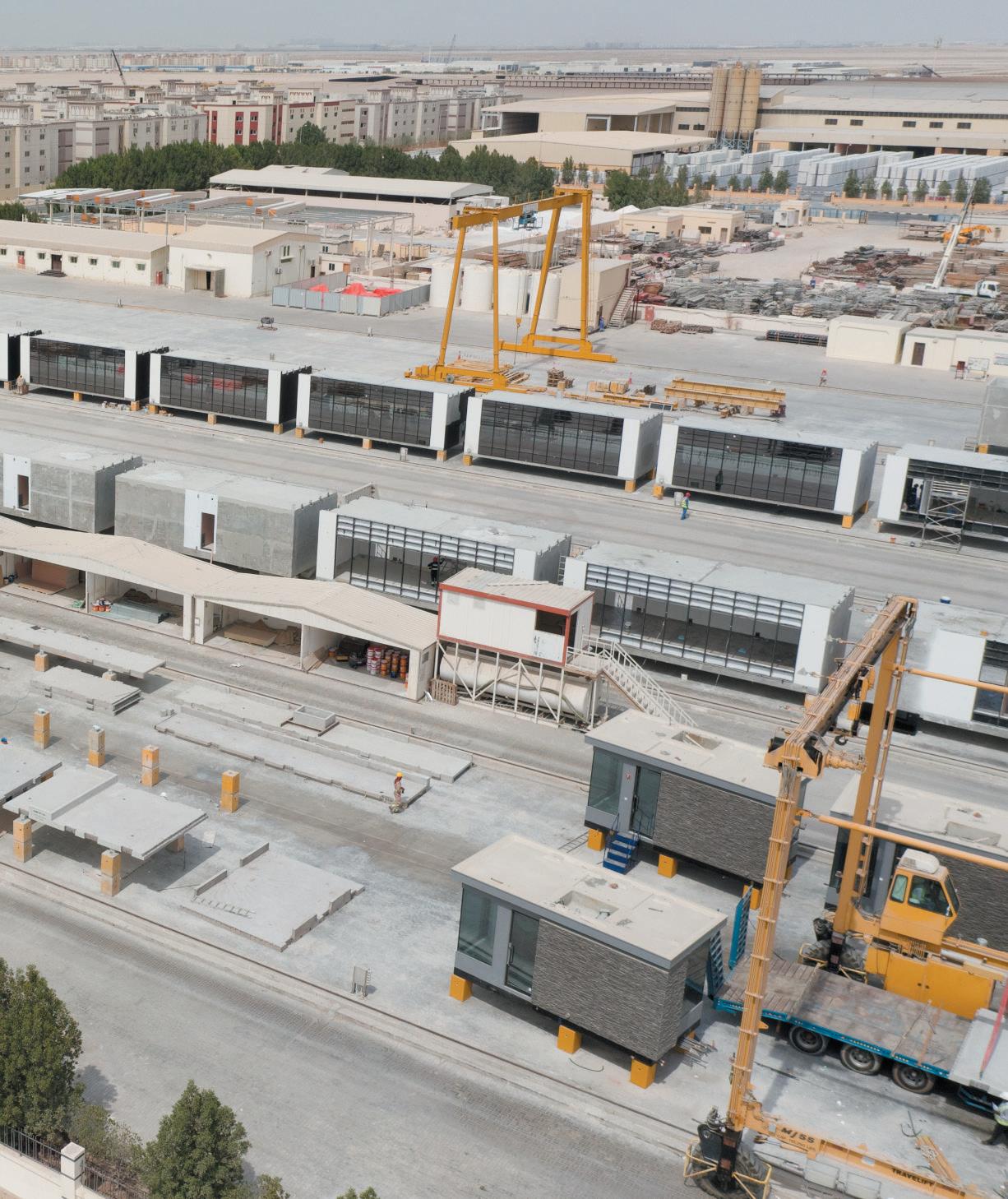
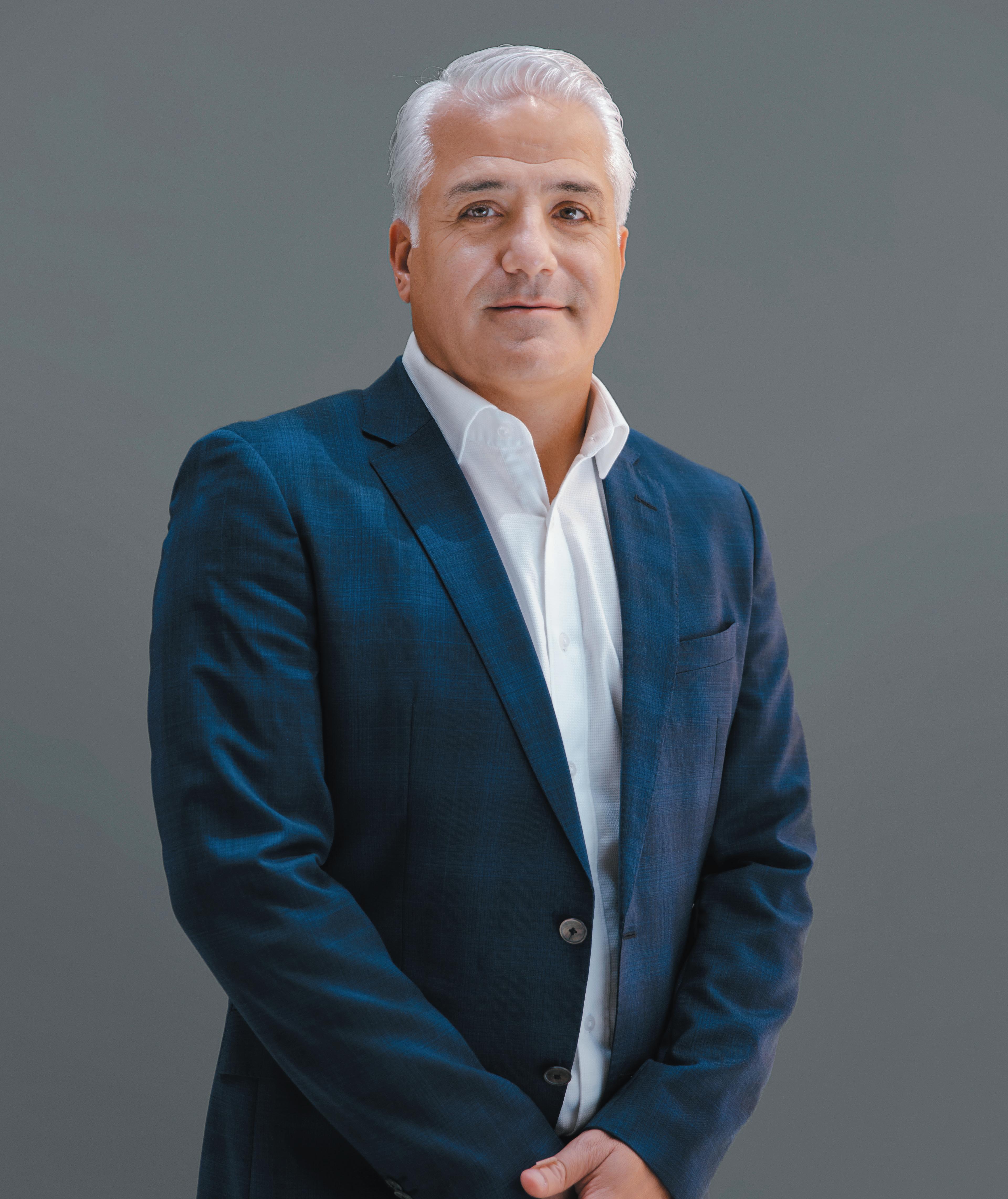
“The focus of our digitalization initiatives has been to enable collaboration through cloud-based and network servers and enhance project coordination between teams and clients.”
RICHARD ABBOUD, SENIOR VICE PRESIDENT, GROUP AMANA
RICHARD ABBOUD, SENIOR VICE PRESIDENT ATGROUP AMANA
Saudi Projects: Digital transformation is a ‘hot term’ but seems to sometimes confuse, so how do you define it at AMANA?
Richard Abboud: Digital transformation refers to the full spectrum of technologies companies employ to improve processes and deliver better customer outcomes, including AI, ML, IoT, and cloud computing. Yes, there is some confusion around ‘digitization’ and ‘digitalization’. The former refers to the process of converting analog data into digital form. The latter refers to embedding digital technologies to improve business processes. For example, in the construction industry, IoT can simplify the procurement, distribution, and tracking of goods and services.
AMANA champions intelligent solutions to improve efficiency in construction, ensuring time savings and cost reductions.
The focus of our digitalization initiatives have been to enable collaboration through cloudbased and network servers and enhance project coordination between teams and clients.
SP: What does ‘going digital’ mean for the industry’s skills needs and how is AMANA approaching this in terms of training and managing change for employees?
RA: Going digital encompasses deploying connected construction technologies across the value chain. This includes integrating assets, people, and processes into a single intelligent and secure platform to improve operational efficiencies and transparency. With increased digitalization, the skills gap is widening. This is a key concern for construction leaders as the skills gap negatively impacts project timelines, agility, growth, and innovation. Looking ahead, attracting talent, upskilling, and reskilling the workforce will be critical.
There is also an urgent need to focus on diversity and inclusion in the GCC construction sector. AMANA has prioritized increasing gender diversity within the workforce, fostering an appealing organizational culture, and increasing digitalization as it continues to build on its leadership in 2023 and beyond.

SP: What is the most influential digital technology in implementing digital transformation?
RA: For AMANA, it is a combination of technologies driving digital transformation. For example, AMANA has deployed Oracle Fusion Cloud Human Capital Management (HCM) to deliver a secure and modern user experience with automated service requests for all employees, and develop an approach with a supporting training platform. The applications also help in automating employee onboarding, enhancing productivity, and reducing administrative costs.
“The industry will also need to look beyond the obvious cost and efficiency benefits of digital transformation and see how it is driving many environmental benefits.”
RED SEA GLOBAL (RSG), THE DEVELOPER BEHIND THE WORLD’S MOST AMBITIOUS REGENERATIVE TOURISM PROJECTS, THE RED SEA DESTINATION AND AMAALA, HAS REVEALED DESIGN PLANS FOR ITS STATE-OF-THE-ART RED SEA MARINE LIFE INSTITUTE.


Created by world-class architectural design firm Foster + Partners, the institute will function as both a scientific research center and a tourist destination. It will accelerate conservation-driven research, while offering visitors truly multidimensional experiences that bridge educational exhibitions with adventure-filled excursions.
“We wanted to design a first-of-its-kind facility that extends far beyond any existing marine life attraction. With 10 zones that provide everything from augmented reality experiences to night diving, and spaces for the scientific community to effectively progress their environmental projects, the Red Sea Marine Life Institute is undeniably unique. Not only will it drive global green and blue innovations, but it will also help put Saudi Arabia on the map for travelers seeking trips that enrich their lives,” said John Pagano, Group CEO of RSG.
“The institute will live in the Triple Bay Marina at AMAALA, but is the beating heart of our broader ambitions to protect and enhance the thriving Red Sea coast of Saudi Arabia. Through our expanding portfolio of projects, we will share our valuable scientific discoveries with the world and enable our guests to experience the true beauty of our thriving coral reefs.”
Expected to host up to 650 people at any one time, guests will be able to walk underwater, snorkel with rare species, participate in lab
tours and dive into the depths of the Red Sea in a submarine. A testament to RSG's coral farming operations, the facility will also be home to one of the world’s largest man-made reefs, measuring an astonishing 40 meters long and 10 meters deep and providing an epic ‘Grand Reveal’ moment for visitors on arrival.
Set within the AMAALA destination on the west coast of Saudi Arabia and located on the waterfront of Triple Bay, the 10,340m2 institute will comprise three levels - one above ground and two below - and offer stunning panoramic views of the Red Sea and the marina.
Inspired by the Red Sea's thriving coral formations, the glass-reinforced concrete that is being used to build the institute will be intricately molded to resemble reef patterns against the skyline. Inside, exhibition displays have also been
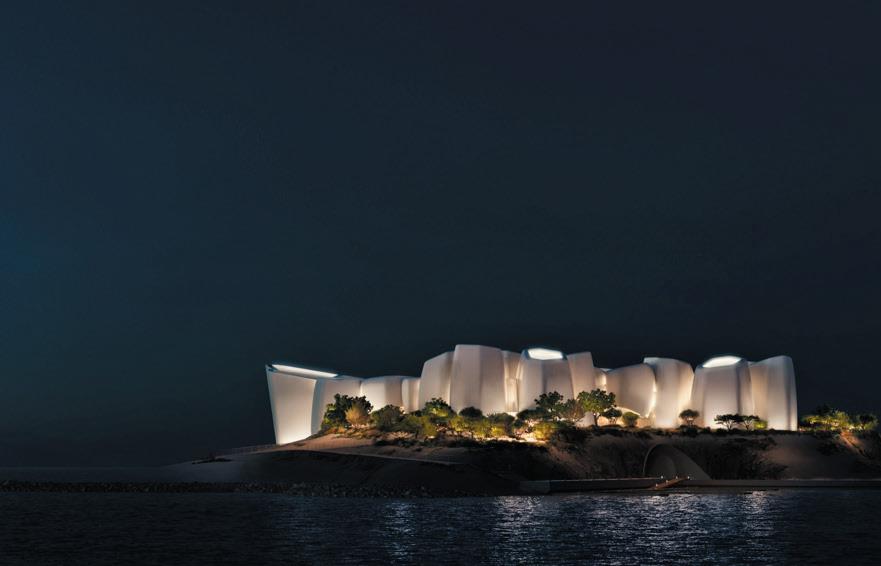
The 10,340m2 institute will comprise three levels and offer stunning panoramic views of the Red Sea and the marina
The Red Sea Marine Life Institute combines futuristic lab spaces with unmatched underwater expeditions
integrated into the infrastructure, with visitors flanked by suspended semispherical tanks containing colorful local marine wildlife from the point of entry.
Gerard Evenden, Head of Studio at Foster + Partners, said: “The Red Sea Marine Life Institute will take guests on a vibrant, educational, and awe-inspiring journey that unveils the natural wonders of the Red Sea and blurs the boundaries between the institute and the ocean. By recreating natural marine habitats, offering unforgettable marine interactions, and sharing glimpses into conservation projects, it will provide guests with an immersive marine experience unlike any other.”
As part of RSG's commitment to responsible development more than 40% of the site will be covered by native plants, and
Site preparation works have already commenced with bulk earthworks now complete and 170,000m3 of soil transported. Next RSG will commence piling and shoring ahead of excavating 12m below the surface water level for the institute’s Grand Reveal aquarium.
The Red Sea Marine Life Institute is part of phase one of AMAALA Triple Bay, which is set to welcome its first guests in 2024.
a system to collect runoff water put in place to prevent erosion and pollution while reducing mains water use.
The lighting throughout the institute has also been designed with the company’s green ambitions in mind, with an innovative framework to prevent light pollution to protect the nocturnal environment.
“More than just a window into the marine world, we’re creating an integrated experience that offers unique activities for our guests, with a collection of opportunities to explore and learn suited to all,” said Warren Baverstock, Senior Marine Life Director at RSG.

“The overlay of sustainable design, build and operations, guest experience and meaningful scientific work underpins our commitment to drive enhancement of the environment and tourism growth. It’s a perfect model of sustainability, balancing people, planet and commercial success,” added Pagano.
Phase one is well underway and will consist of eight resorts offering upwards of 1,200 hotel keys. Upon completion, the destination will be home to more than 3,000 hotel rooms across 25 hotels, and approximately 900 luxury residential villas, apartments and estate homes, alongside high-end retail establishments, fine dining, wellness and recreational facilities.
170,000m3 of soil

Saudi Arabia's interior design market is thriving as the Kingdom's building sector expands, with an increasing number of real estate projects for retail, commercial, hospitality, and residential expected to drive the sector forwards. Gigaprojects such as The Red Sea, AMAALA, and King Abdullah Economic City are attracting various international and regional interiors and fit-out designers to work on the projects. Interior design opportunities are proliferating in the educational and healthcare sectors too.


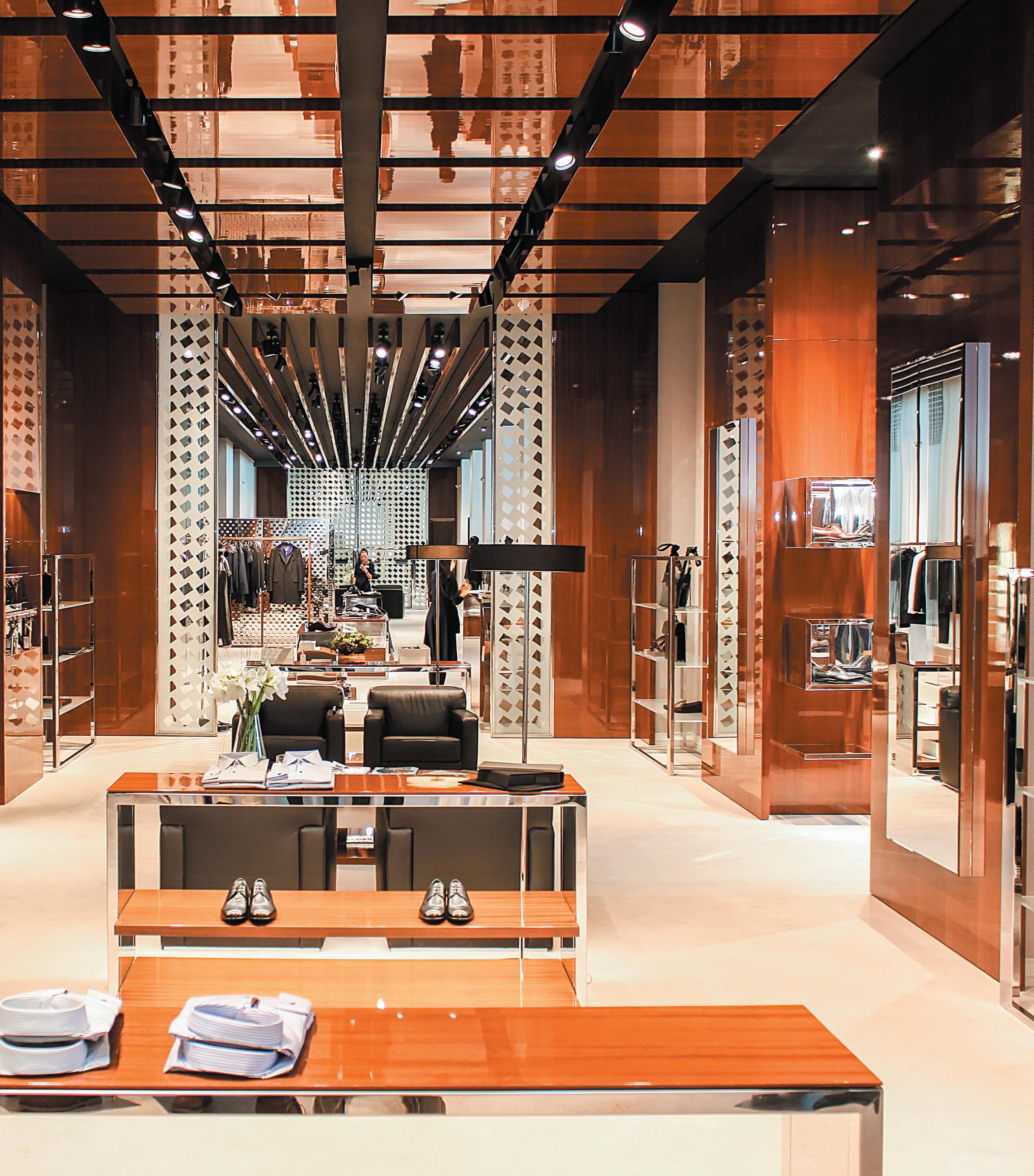
The Saudi Arabia interior design market is competitive, with numerous local and worldwide businesses involved. Developers, contractors, and suppliers are increasingly emphasizing costeffective engineering, materials, and design, all of which contribute to the shaping of the interior design business.

It is a rapidly evolving industry, and that is why Saudi Projects is introducing an entirely new section to the magazine, focusing solely on the world of interiors. In this issue, for instance, we will be looking at altaviaodg, particularly with regard to the travel retail industry. A part of the altavia Group of companies, the world-leading retail consultancy and communication enterprise, established in 1983 and with offices in 45 countries, Altavia.odg is the ‘go to’ firm for leading operators, retailers, and brands.
Altavia.odg thrives on authentic connections and building environments with soul and a sense of place. It is passionate about producing interiors that capture the essence of the location or brand while balancing the highest standards of creativity to reflect the client's individuality. If you are not yet aware of Altavia.odg’s work and expertise, I encourage you to read all about the firm in two major features within these pages. Rebranding Fuels Ongoing Evolution at Altavia.odg and Great Journeys, Mesmerizing Retail Experiences.

According to sources, by 2027, the global interiors market is expected to hit a thumping $255.4 billion. In addition, the international interior design services market will increase at a 7.8% CAGR in 2020-2027.


By 2027, the global interiors market is expected to hit a thumping $255.4 billion
The Greeks, like the Romans, adopted a style with minimal furnishings, arches, and mosaic tiles, with the Roman Empire (murals) and the Islamic Golden Age both having early interior design styles (pillars and columns). But what are the trends for 2023? The following five trends are things we can see making waves over the next year or two:
1. Incorporating sustainability in commercial interior design - the emphasis here is on using natural materials or objects that have a lower environmental impact, such as handcrafted items or salvaged furniture and decor.



2. The growth of ‘resimercial’ design –with more people choosing to work from home, there is a lot of discussion about 'resimercial' design, which combines commercial space with domestic interior amenities to create a productive yet comfortable atmosphere.
3. Minimalist design - as our lives get more frenetic, a sense of simplicity in interior design is becoming more valued.
4. Curved shapes - a rising interest in rounder contours is feeding into the concept of minimalism and comfortable commercial settings.
5. Color blocking - this is an excellent technique to incorporate color into a room while maintaining a classy and professionally styled appearance.
Whatever the future throws up in terms of interiors, though, you can be assured that Saudi Projects will be there to comment and report. Join us!
Altavia.odg thrives on authentic connections and building environments with soul and a sense of place
Slated to open in 2024, the Four Seasons Hotel and Private Residences Jeddah is a new-build shoreline destination to be found within the Corniche District. Guests and homeowners will be captivated by stunning views of the Red Sea and Jeddah’s classic architecture, revealing the city’s 2000 years of history.
Four Seasons Hotel and Private Residences Jeddah at the Corniche will incorporate 269 lavishly appointed guest rooms and
suites, 21 serviced apartments for short and long-term stays, and 64 Private Residences, including two penthouses. Richmond International is working on the interior design, with each space being meticulously fashioned to combine luxurious and sophisticated design components. Accommodations will take in capacious living spaces for families, serene spa-inspired bathrooms, and marble-clad interiors.



Riyadh Capital appointed David T'Kint to rebrand the Burj Rafal hotel into the first luxury JW Marriott on King Fahd Road in Riyadh. The multiyear transformation embraces the region's enticing nature in the interior elements, which incorporate earthy tones accentuated with green. The studio's inspiration came from one of the most inspiring ancient poems of the Arabian Peninsular, which reads, ‘For when the south wind blows the sand over them, the north wind sweeps it away’. As a result, the lines are organic and delicate,
reflecting Saudi Arabia's everchanging windblown deserts. The colors are earthy and infused with green hues, reminiscent of lush landscapes when ‘rain finally comes to the land’, an excerpt from an ancient inspirational poem. Guests are surrounded by a variety of green accents that have been carefully interwoven into the various interior areas as they travel through the hotel, allowing them to immerse themselves in a world of calm, tranquillity, and harmony.
T'Kint finished the first phase in just over a year and a half, which was three times faster than expected.

YOTEL, the international hospitality brand, has announced the signing of its first hotel in Saudi Arabia. The YOTEL property, which is set to debut in 2025, will also be the first hotel to open in Oxagon, the home of forward-thinking and clean industries in NEOM.
The interior of the hotel looks as if it is going to be more than a little striking. Upon arrival, guests will be enveloped in the buzzing energy of the district's creative eco-system, with the 300-room hotel offering the latest YOTEL features, such as the brand's iconic robotic concierge, motorized SmartBeds™, and fully integrated technologies.
The lines are organic and delicate, reflecting Saudi Arabia's ever-changing windblown deserts
Construction & Planning Co's (C&P) fit-out business, in collaboration with global real estate consultant firm JLL, continues to produce substantial projects branded with its hallmark signature of world-class excellence. The latest of these is no exception; each branch of the world-renowned coffee brand EL&N given its own distinct style while preserving the typical feel of lively pink décor and luxuriant accessories.
C&P was chosen as the brand's roll-out general contractor in 2021 and has since produced numerous coffee shops in key locations throughout Riyadh.
EL&N's first store in Saudi Arabia is located in the Panorama Mall, and despite its small size, it contains many delicate features and innovative looks.
On the Riyadh Front, another noteworthy EL&N coffee shop may be found. Its oneof-a-kind, multi-level penthouse design includes special props that transport visitors on a breath-taking neon-lit adventure replete with nostalgic allusions to vintage Hollywood. Another of the branch’s designs called for the installation of a classic vintage car within its interior, for which a special edition pink-wrapped 1962 Sunbeam coupé was brought in to fulfil this particular vision.
C&P was chosen as the brand's roll-out general contractor in 2021
Architecture studio OMA has designed the backdrop for the inaugural Islamic Arts Biennale, taking place from 23 January until 23 April and being hosted in the Western Hajj Terminal at King Abdulaziz International Airport in Jeddah

The firm designed the overall identity for the Islamic Arts Biennale, which is being curated by South African architect Sumayya Vally
OMA’s design for the event aims to complement the existing building, with OMA Associate Kaveh Dabiri explaining: “Our scenography design aims to create a space that works with the cable-stayed, fabricroof of the Hajj Terminal - a seminal piece of modern architecture known to Muslims around the world - literally reinventing it as an umbrella for Islamic Arts.”

If you're wanting Asian food, Chan, a recently launched casual dining restaurant in Jeddah, is the place to go. It brings together ‘favorites from the streets of Asia’ all under one roof. And when we say ‘streets’ we mean ‘streets’, with Chan’s vivacious and festive interior design recreating the trendy urban streets and alleys of
downtown Tokyo, Seoul, and beyond. The restaurant's visually captivating and jazzy ambiance is enhanced with luminous neon lights, graffiti, old-school arcade games, and aspects of urban Asian art and architecture. Chan offers delicious flavors with something for everyone, from adventurous diners to those who already adore Asian cuisine.
Chan’s vivacious and festive interiors recreate the trendy urban streets and alleys of downtown Tokyo

“Our scenography design aims to create a space that works with the cable-stayed, fabric-roof of the Hajj Terminal”


Saudi Arabia's interior design industry is flourishing as the construction and development sectors boom, with a varied range of projects taking place throughout the Kingdom, including giga-projects such as The Red Sea and Amaala, which are attracting globally renowned interiors and fit-out companies.

Almost 40% of the KSA population is between the ages of 15 and 34. These Gen-Z and Gen-X consumers present a unique potential for digital-first merchants to grow their consumer base. Major retail companies are now attempting to build a firm foundation for a life-long engagement with this digital-native audience by developing product lines that cater specifically to the growing tastes of this generation. In tandem with this, stores are demanding fresh and innovative concepts for their bricks and mortar stores, giving consumers a genuinely experiential experience that attracts repeat business.
While acquiring younger clients may appear to be an additional investment in operating expenditures, this is not always the case. Understanding behavioral variances, empowering brand ambassadors, and establishing physical outlets in strategic areas are critical. Aspirational aesthetics, authentic influencer voices, and a ‘happening’ experience go a long way with these shrewd and edgy generations.
Although each retail store and hospitality venue is unique, they all have the same objective: to bring clients across the threshold and persuade them to make a purchase. Retailers have tried everything from playing music through to seductive aromas - and while this is nothing new, getting it right is a true art. Hit the target and it will bring about better engagement with customers, build a dedicated and more enthusiastic workforce, and secure a brand’s value proposition for years to come.
That’s why interiors companies, retailers, hotels, and the catering industry will all be in attendance at INDEX Saudi 2023, to be held at the Riyadh International Convention & Exhibition Center (RICEC) on the 10, 11, and 12 of September.

INDEX Saudi 2023 is the leading interior design, fit-out, and architectural show in Saudi Arabia.

This huge international trade event brings together interior suppliers and manufacturers with interior designers, architects, project managers, and procurers from what is a continuously diversified industry.
INDEX Saudi 2023 will feature a comprehensive showcase of interior design solutions, high-tech lighting, traditional flooring, and much more. There will also be a free conference with expert speakers discussing the newest trends, best practices, and practical ideas in interior design. The interactive lectures will be given by industry thought leaders and innovators who are committed to driving design best practices throughout the Kingdom. It’s a mustattend event, so put it in your diary now!

INDEX Saudi 2023 is the leading interior design, fit-out, and architectural show in Saudi Arabia
Almost 40% of the KSA population is between the ages of 15 and 34
Many believe that retail design refers to how you merchandise your products. But while marketing is an important aspect of store interior design, it is not the sole one. Every aspect of a store, from the entrance to the checkout display, can influence a customer's route to purchase. As a result, retail interior design is applicable to the complete retail area, both interior and exterior. And to achieve the very best results you need an interiors expert.
But what exactly does a retail interior designer do?


When people hear ‘interior designer’ or ‘interiors company’, some think that means decorator, while others think project coordinator, yet the true role is typically more wide-ranging and complex than that.
Let us begin with a straightforward definition: An interior designer specializes in space design and development. They collaborate with architects, engineers, contractors, and other experts to create branded retail environments, combining a wide range of creative and technical talents. That's a really broad statement because an interior designer can contribute to a project on a variety of levels. But it's a good starting point. Nevertheless, a topnotch design company can create effective solutions for both brands and retailers, providing spaces that entice consumers by creating a personal connection and sense of place. When considering interiors companies, the old saying ‘as long as a piece of string?’ has never been more relevant!
And of course, the term ‘retail’ encompasses far more than just enterprises that sell goods (such as food and fashion). Businesses that sell services and experiences are also included, from coffee shops to wellness and travel. In fact, in any type of location where customers interact with a product or brand, retail experience design concepts play an important role. Put simply, it is a vast and fast-moving industry, and Saudi Arabia is currently at the forefront of the interiors revolution. Consequently, Saudi Projects will home in on this important sector, bringing you all of the latest news, views, and opinions. Join us, as we dive deep into one of the world’s most creative industries.
A top-notch design company can create effective solutions for both brands and retailers, providing spaces that entice consumers by creating a personal connection and sense of place
Companies today operate in a dynamic and unpredictable environment. Disruptive forces in the marketplace include technological advancements, economic cycles, and shifting consumer demographics and views. As a result, many businesses may need to rebrand from time to time in order to evolve and prosper, often taking a radical approach in order to remain relevant in the modern world.
At ODG, they have taken a different tack, for this is a company that has always understood that a brand is not something you build and then abandon for the next 10 years, but something that is dynamic with a need to constantly progress. Consequently, rebranding at ODG is evolutionary rather than revolutionary and revolves around the firm’s integration into its parent company, altavia.
The world-leading retail consultancy and communication group, altavia, established in 1983, has its HQ in Paris and offices in 45 countries. It is a company uniquely equipped

to create unparalleled partnerships and lasting value for its clients, and with ODG it has a team of consultants, planners, creatives and technical designers that are recognized for developing awardwinning retail programs and concepts for world-renowned retailers, F&B home-grown and international concepts, and FMCG brands amongst others.
Now known as www.altavia-odg.com, the firm continues to grow and evolve, providing solutions to the retail travel industry that are original, creative, and often independent from current trends.

“The retail industry is going toward an omnichannel approach and the ‘trick’ is to find the meeting point between experience and convenience”
MAURIZIO FABBRINI, HEAD OF MARKETING AND SALES AT ALTAVIA.ODG IN DUBAI



“The rebranding has been a fascinating exercise,” explains Maurizio Fabbrini, Head of Marketing and Sales at Altavia.odg in Dubai. “It was an opportunity to take a fresh look at what we stand for, as well as at our customers and their constantly changing requirements, and how we can continue to offer services and solutions that are pertinent to the modern retail world. We didn’t charge into a brand review focusing on logos and coffee mugs, that’s not where we’re at. Instead, our new visual identity, with its interactive features and more casual feel, acts as a conduit, connecting our customers to a firm that doesn’t just go for the obvious when it comes to designing retail solutions, but reframes the problem, looking at it from multiple angles with the aim of ultimately elevating the consumer experience.”

Whether it’s designing a coffee shop in Riyadh or airport stores in Melbourne or Jeddah, and all points in between, Altavia.odg has become recognized for its creative power and out-of-the-box thinking. Its designers are a very talented and diverse bunch, with vast knowledge and experience of the retail industry as a whole, and, whether it’s a small space or a largescale store, are well-practiced in providing subject matter expertise that allows clients to deal with just one point of contact. Hence, the whole process becomes much more stress-free and enjoyable.

Whether it’s designing a airport stores in Melbourne or Jeddah, and all points in between, altavia.odg has become recognized for its creative power
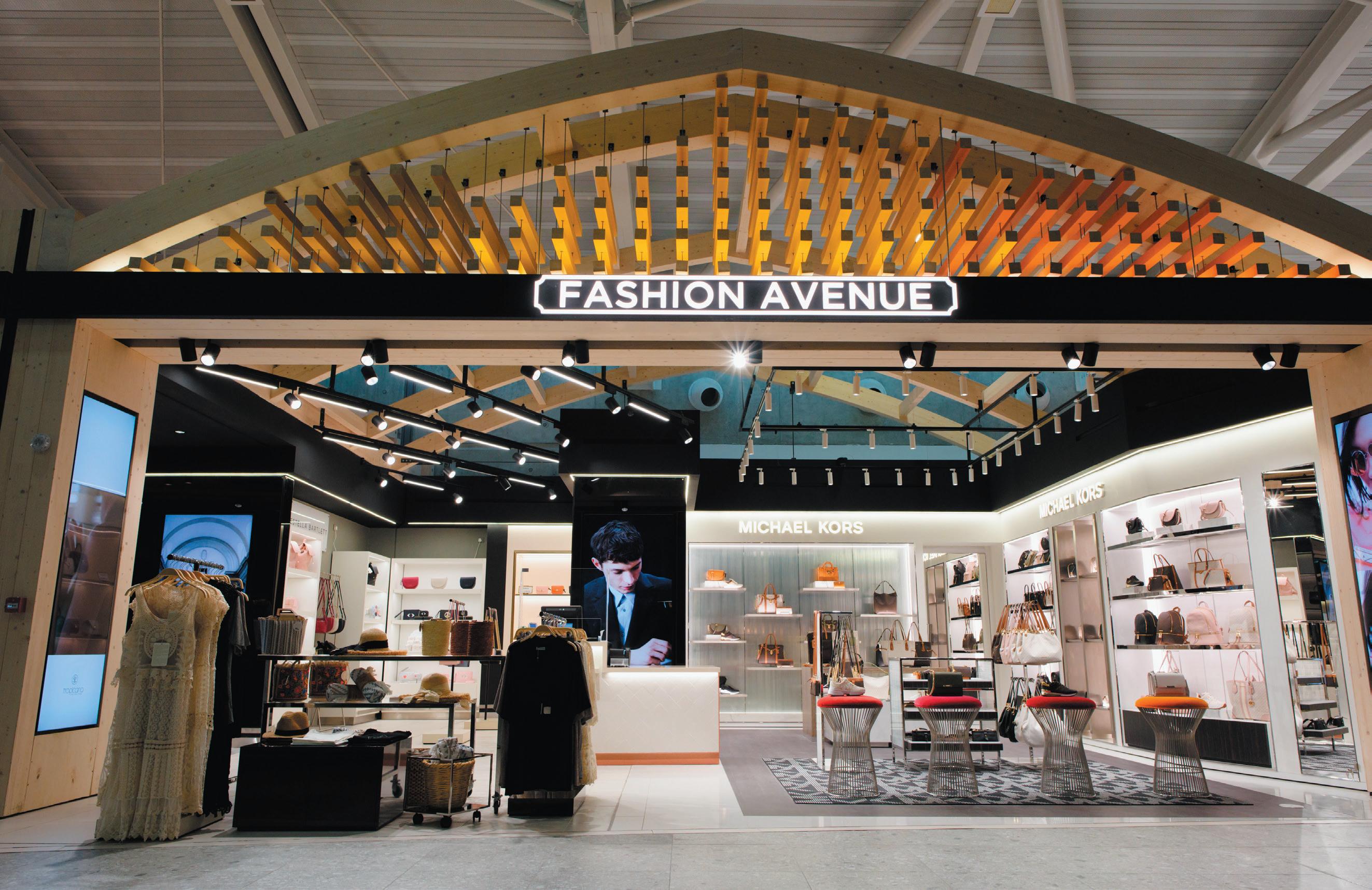
Of course, the pandemic, the war in Ukraine, and a badly hit consumer economy have all had an impact, but important lessons have been learned and for many retailers 2023 will be an opportunity to retune their aspirations. As they do so, they will be looking at two major trends in the industry, as Maurizio explains: “Stores are more and more experience driven. If we take a store selling nuts as an example, there will be a desire to allow the consumer to smell the aroma of the nuts, or for a coffee outlet, to see the coffee being ground. At the same time, some consumers will be looking for "ultraconvenience", which is of course the direct opposite of experience-driven retail. Those seeking convenience will have probably found exactly what they want online and simply want to go into the store to pick it up – it’s about being in and out quickly, click and collect.
“The industry is, therefore, going toward an omnichannel approach and the ‘trick’ is to find the meeting point between these two trends. And this is why brands come to Altavia.odg; we can provide original, truly distinctive solutions without relying on gimmicks or yesterday’s gizmos and widgets. We offer flexible solutions that can be adapted to consumer preferences while, at the same time, ensuring that everything is future-proofed.”
Altavia Group, established in 1983, has its HQ in Paris and offices in 45 countriesLARNACA DUTY FREE, CYPRUS

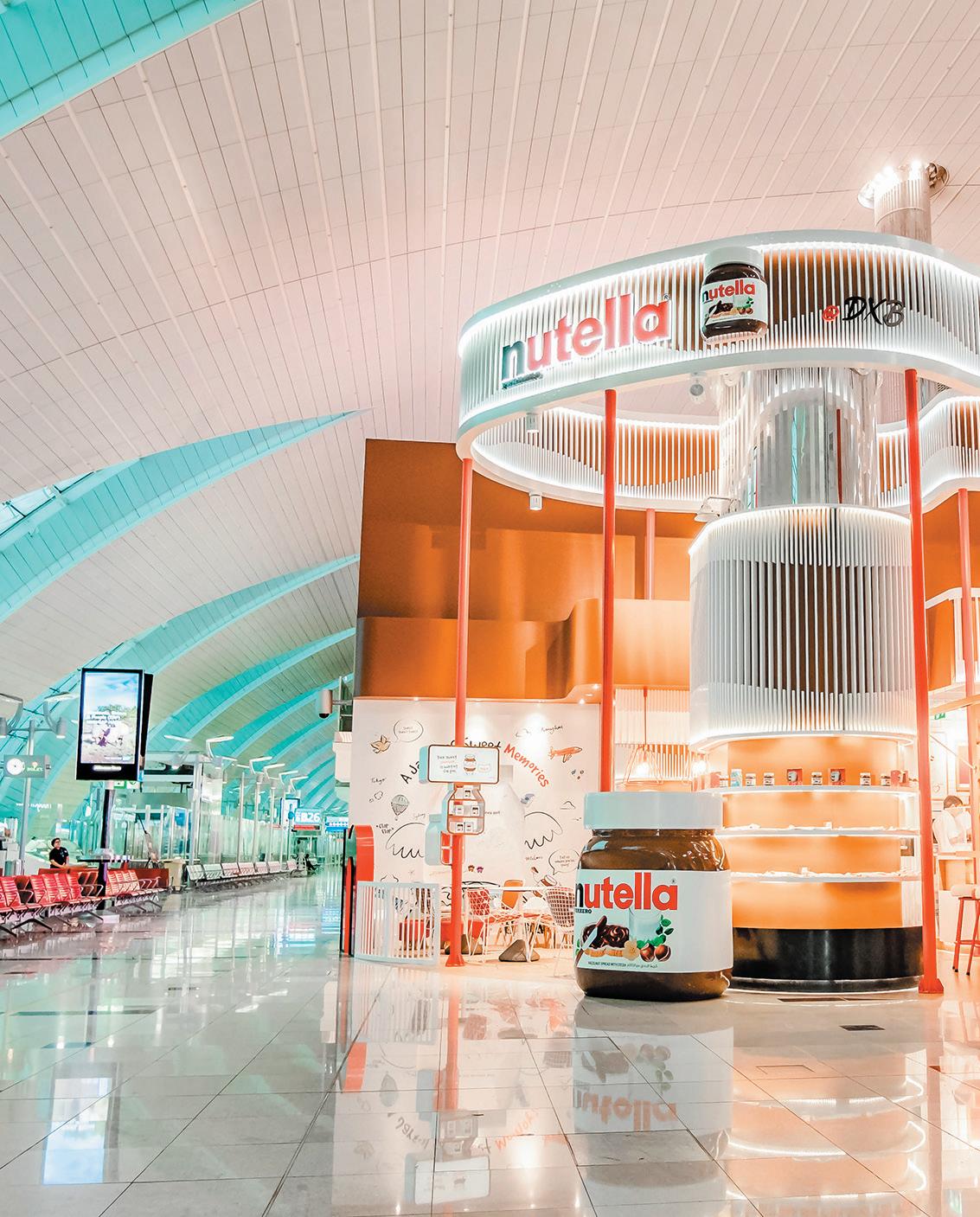
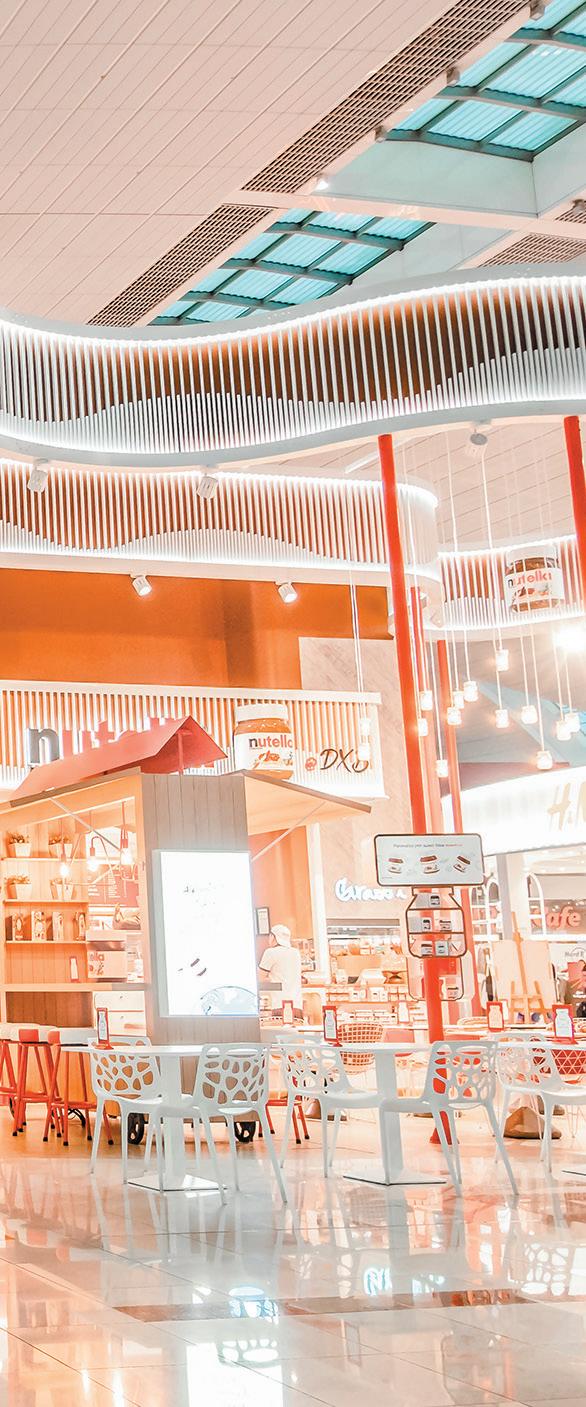
Sustainability is at the front and center of design projects around the world. It has the potential to significantly benefit both the people who occupy and visit the relevant spaces and the environment.
That is why Altavia.odg takes a fresh approach to reimagining conventional retail design values for the twenty-first century. Sustainability is not only a design trend for the firm; it is at the heart of its business. In creating each design solution, they take a thoughtful approach to energy and ecological conservation, always seeking to ensure that their actions do not negatively affect future generations. “It’s not just materials we look at,” Maurizio says, “but logistics, people, how we can support the local economy, local alternatives, it’s the whole package.
In Dubai, we are carbonneutral and have a number of designers with LEED certification, so we really do walk the talk – sustainability is a focal point of our brand.”
Now part of a bigger group, Altavia.odg will persist with this crucial design philosophy, while continuing to provide the same value and scale that it has always done. And with 11 industry awards under its belt, projects in 40 airports, railway stations and ferries around the world, and over 350,000m2 of commercial space created, Altavia.odg is genuinely excited about the future of the retail industry in all of its facets, - including Travel, F&B, Beauty and Fresh - and how it can provide its broad portfolio of services to support the unstoppable progress and myriad breathtaking developments currently underway in the Kingdom of Saudi Arabia in line with Vision 2030.
Sustainability is not only a design trend for the firm; it is at the heart of its business

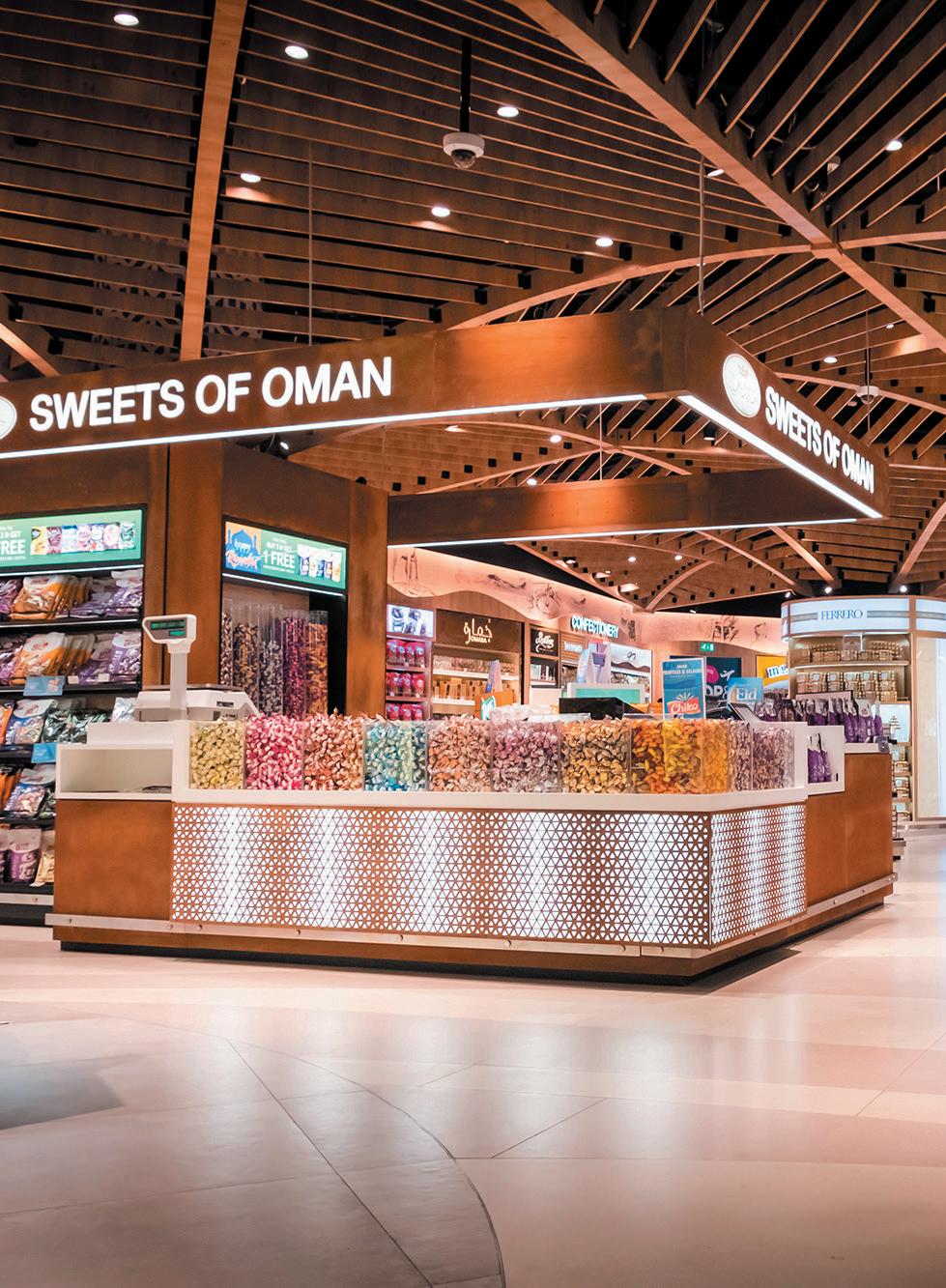
Travel retail has come a long way from its basic duty-free shopping days, with international airports having evolved into premium shopping destinations in their own right. While this creates great opportunities for brand owners, the fastpaced nature of this one-of-a-kind retail environment also poses a fundamental test: how to engage a time-pressed and increasingly savvy customer?
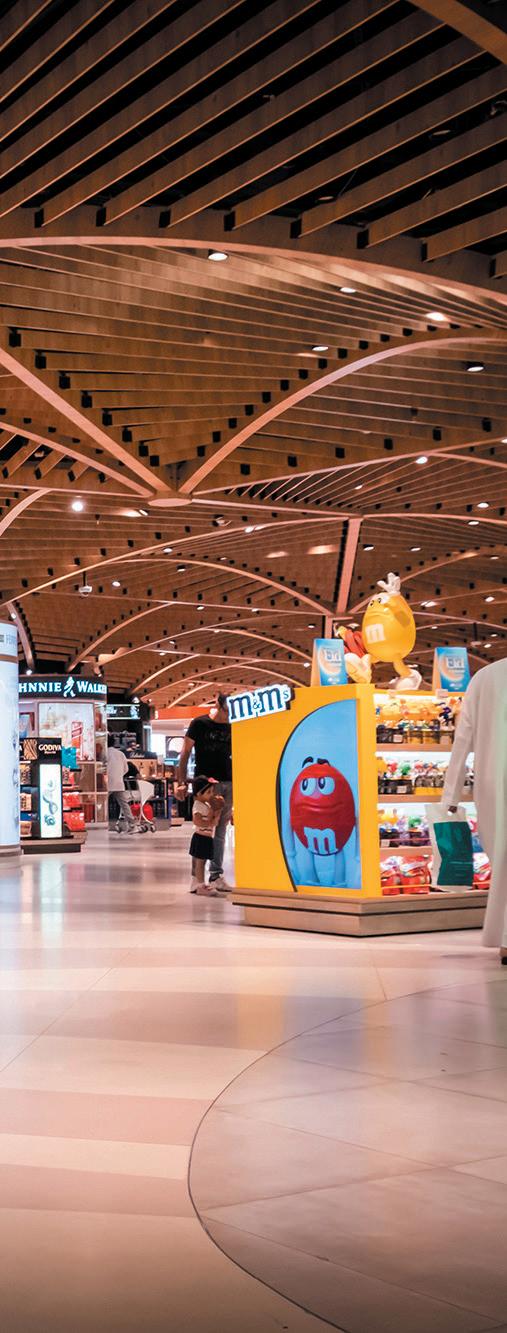
Hugo Vanderschaegh, Managing partner at Altavia.odg and head of Altavia travel retail, admits this is a challenge for the industry, explaining that there is a need to drive more footfall by providing real experiences and added value: “Back in the years 2010 to 2019, travel was booming, but in some airports, travelers had begun to spend less. So while there was an amazing growth in traffic, which was fueling the travel retail industry, some of the KPIs were quite negative, with spending, if not falling, at least plateauing.
“It was at this time that many of the big players started to rethink the way they designed stores, looking to make them more experiential in order to drive footfall and, in doing so, drive conversion. These kinds of shifts happened before Covid, but as in many industries, then pandemic has actually fuelled a lot of the trends, one of them being e-digital commerce in travel retail.”
As a result of Covid, a lot of the investment is going into Customer Relationship Management (CRM), loyalty programs, ecommerce, and everything digital that can help brands and retailers engage with travelers before they reach the terminal, encouraging them to continue the conversation in the physical store when they get there.



“There is certainly acceleration on that front,” Hugo says. “Even pre-Covid, we were trying to provide more than just product on the shelves, and I have to say for the last couple of years the brands have done an awful lot, such as amazing pop-ups for luxury brands in the leading airports – experiences where you can interact with the brands are becoming more and more important.
“But now I would say it’s not only about the brands. The travel retailers are themselves creating their own concepts and their own kind of engagement areas. So it doesn’t just rely on the brand; the retailer is also differentiating itself.”


Sensitive to the ever-evolving expectations of customers, the major travel retail operators are investing significantly to offer uniquely different shopping experiences. They are challenging themselves to be increasingly imaginative and engaging, placing particular stress on experiential experiences that have a lot to do with a ‘sense of place’, a concept that explains how people define and categorize locations in their minds.
“This means designing airports that are unique to where they are, with airport stores bringing a sense of place into the store as an experience,” Hugo says. But how do you create a truly ‘personal’ experience for travelers? Hugo takes up the story: “The first thing you need to do is create different experiences based on the airport’s location and USP, and then it’s about personal
experiences, which I would say is the next stage. And to do that, you really need to know your customers, not only from demographic and volume point of views , – you need to understand who they are individually and what they want, and this calls for good data. This is a big thing right now in the industry, from the airport to the airlines to the duty-free, and how they can collaborate in a beneficial way to ensure that data are being shared for the benefit of passengers to create a more personalized experience. And that is a very difficult task, but that’s what the industry is looking for.”
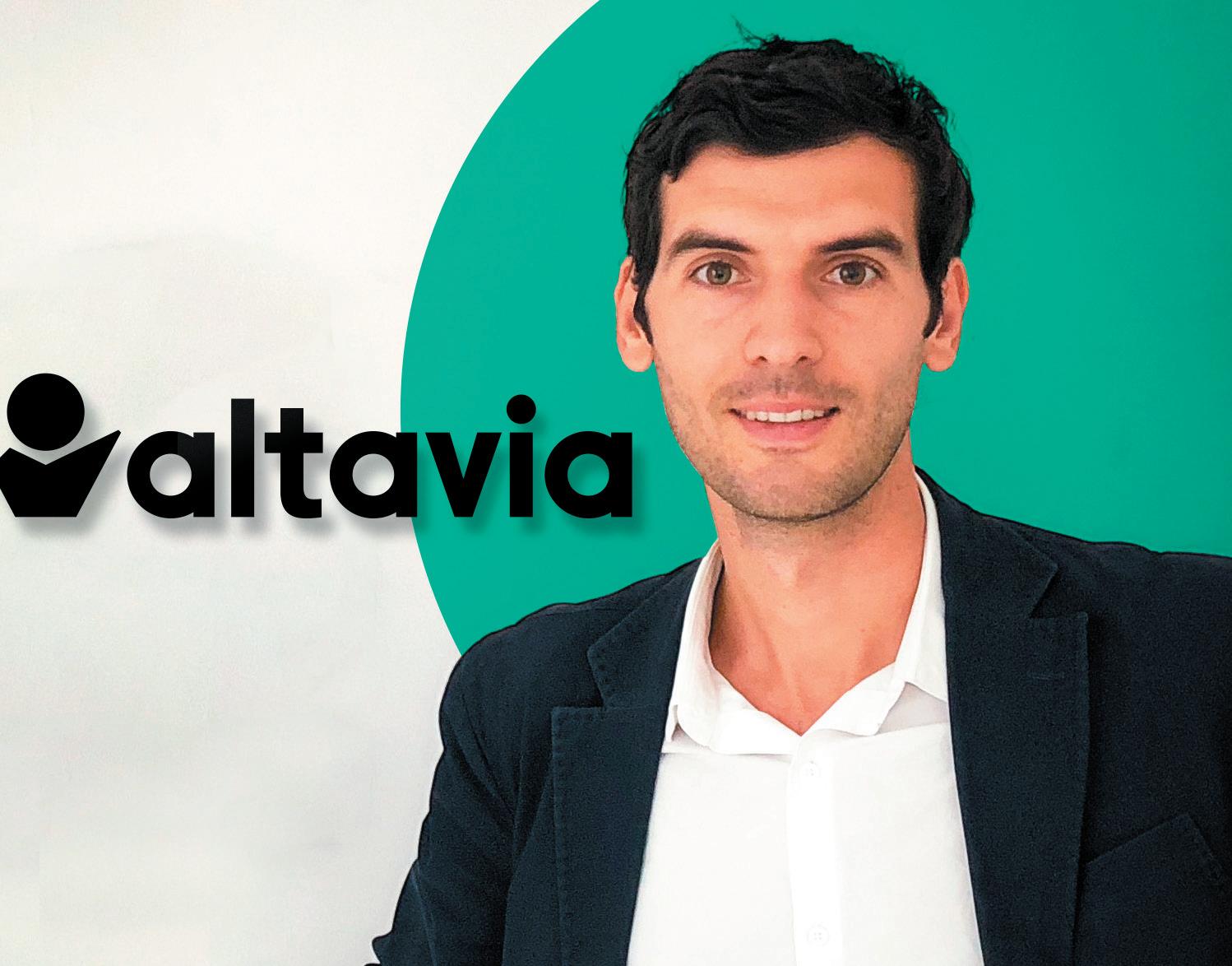
This approach is more than creating unique experiences, as Hugo explains: “If you walk into a terminal, for instance, in Geneva, and there is a tasting station where you can try chocolate - because they have amazing chocolate in Switzerland - and there is an incredible chocolate fountain with a chocolatier doing live cooking, then marvelous, passengers get hooked
and they are going to buy. It’s locally relevant and you have a sense of theatre where the space is really screaming out its message. The next level, though, is to offer the chocolate in a way that will please a particular individual, and this will be achieved because we will know who he or she is and what he purchased in the past and we’ll engage him before he travels using digital tools. That’s the next stage.”
HUGO VANDERSCHAEGH, MANAGING PARTNER AT ALTAVIA.ODG“Covid has actually fuelled a lot of the trends, one of them being digital commerce in travel retail”
“The next level is to offer the chocolate in a way that will please a particular individual, and this will be achieved because we will know who he or she is and what their personal taste/ interests are”
The travel industry is, of course, often criticized, powered by what is a global commitment to achieve a more sustainable life by paying attention more to the impact our activities have on the planet. Indeed, the travel industry, and especially the airline and transportation sectors, need to do a lot better than what they do right now. At altavia.odg, they understand that as travel retail designers, designing stores in airports, they need to constantly push back boundaries to create stores that have a lower impact on the planet. There are various ways to achieve this, and one of the paths altavia.odg decided to take was to train its designers in the LEED program.

“LEED rating system is the most common and widely used green building and interior certification in the world. The LEED certification is based on a wide set of technical criteria that evaluate the sustainability of a project.
At Altavia.odg we train our staff to be able to provide our clients with concrete recommendations based on the LEED principles.” Hugo says. “For example, we worked on a concept in Bali airport, Indonesia, and of course Bali is an amazing tourist destination. However, one of the threats to the island is the plastic that keeps washing up onto the beach. So we worked on finding materials that are made of recycled plastic that washed up and used this as a raw material for the design of the stores – sustainability with a sense of place.”

One of the paths altavia. odg decided to take was to train its designers in the LEED program




The travel retail industry is evolving very, very quickly, with one of the drivers being Generation Z, shoppers with values, although as Hugo points out this can be tricky because not all of their values are the same. “Some members of Generation Z will want to purchase items that have a social impact, while others, for instance, will home in on bio-diversity. So it’s really difficult because there is a very broad portfolio of values that need addressing, but retailers and brands need to choose their values – which values do they really want to push in their stores because you simply can’t push every single value in one go, that would be extremely challenging and difficult financially. Consequently, they have to see what the most important values are for the traveler, as well as the most important values for where the product is located in a geographical sense.”


altavia.odg has numerous case studies in airports around the world that demonstrate ‘good design sells more’ and many clients have seen a huge uplift in sales and awareness after working with the company. Moreover, its presence in the Middle East, where it works with brands, duty free and F&B retailers, and airport operators (the only firm in the region to be covering all three) continues to thrive and develop. It has, for example, completed 17 retail and F&B units at Dubai International Airport
and is currently working on a number of very large projects at airports in Riyadh and Jeddah in Saudi Arabia. But whatever the airport operators, retailers, and brand partners have all emphasized the evergrowing importance of retail design for the wider travel retail channel. Indeed, with the emergence of the online sales channel, store design will be vital to attracting customers back to brick-and-mortar outlets and engaging the five senses.

But what are the major trends that will drive the industry forward over the next five years? Hugo has no doubt, responding: “If you compare what travel retail does when it comes to the use of CRM, it’s stone age compared to some of the big retailers in domestic markets. So it’s a huge transformation at a very fast pace, catching up with the best practices when it comes to the use of data and how the industry can better communicate with its customers.
That is the first trend. And I think number two revolves around the individual stores, which are becoming super experiential because, at the end of the day, people are not there to shop, they are there to travel, so how you get them to shop is to provide something different. Low prices are no longer enough to get people to visit duty-free stores. You can expect super strong digitalization as well as much better and much more immersive experiences.”
altavia.odg is currently working on a number of very large projects at airports in Riyadh and Jeddah
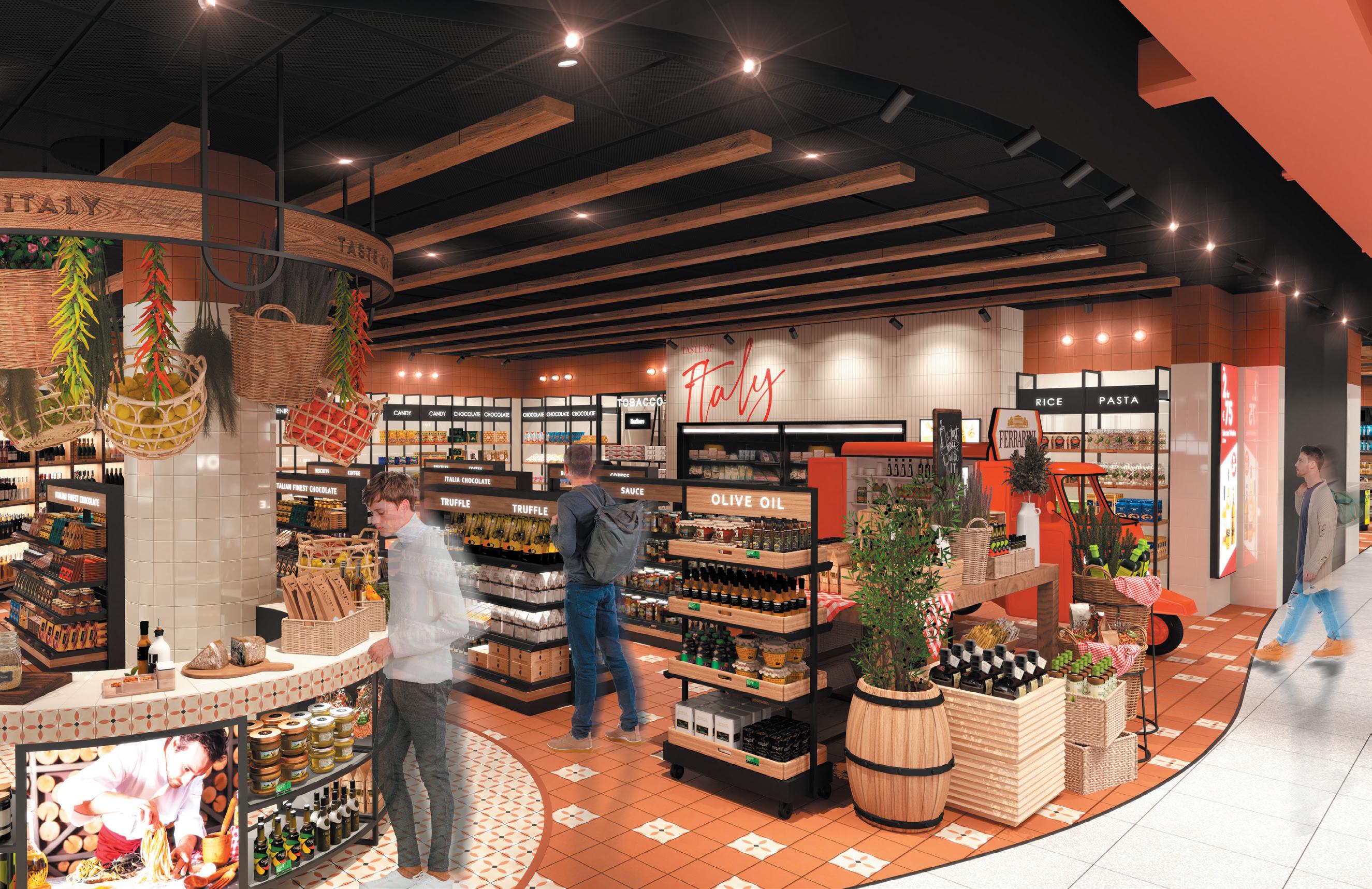


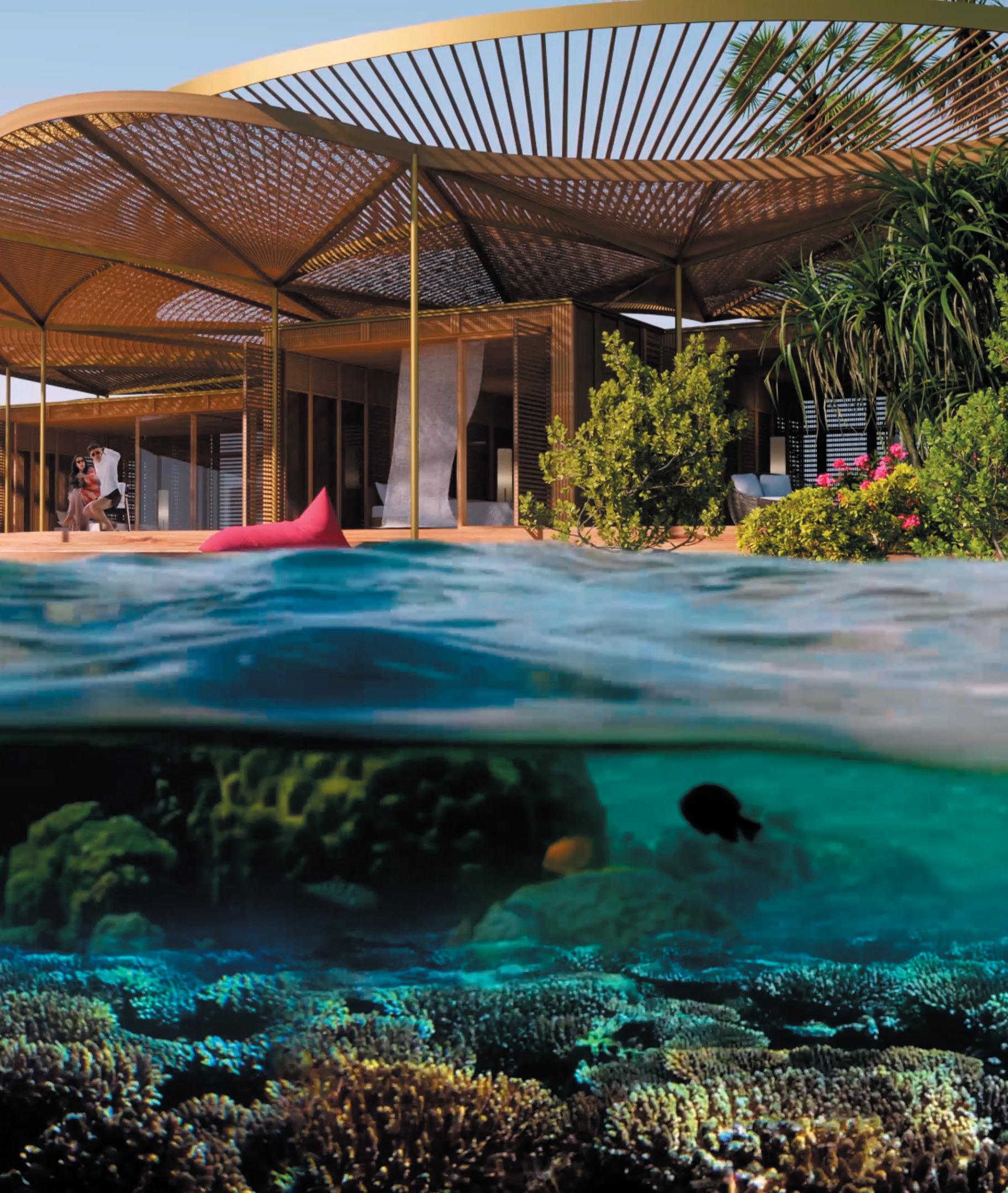

Apioneer in responsible development, Red Sea Global (RSG) is one of the world’s most creative and imaginative developers, delivering projects that actively enhance the wellbeing of guests, communities, and environments. As the developer behind The Red Sea and AMAALA, two luxury, regenerative tourism destinations, RSG naturally has a wide-ranging requirement for professional, quality-driven suppliers and contractors. But how do such companies enquire about the many opportunities available and how do they make that first all-important contact? We asked Ben Edwards, Group Head of Cost, Commercial & Procurement at RSG, to fill us in on a few details concerning current needs, the benefits of working with RSG, and how to reach out to discover more.

Saudi Projects: What does RSG look for in contractors and suppliers; what type of companies are you looking to work with?
Ben Edwards: We have got such a wide
variety of procurement requirements because we’re not only building but also operating the assets so it's extremely wide-ranging. Capability in the Kingdom is front and center of everything we do - we want to engage with companies who are capable of delivering the requirements we need. There can be a tendency for people to promise you things and say, yes, we can do anything, but when it transpires and you enter into a contract with them you have performance issues, etc. So we're very much focused on a proven track record, delivery in the Middle East region, and alignment with our cultures and values in terms of environmental and sustainability credentials, and Saudization.
SP: Do you take certifications such as ISOs into account?
BE: We do, yes, particularly on the environmental side of things. That’s a very high priority for us because of the nature of where we're working.
These are very unspoiled sections of the Red Sea coastline. They’ve been closed basically, so nobody's been able to go into the sea and damage the coral. Everything is untouched by human hands and we want it to stay that way during and after construction so that people can come and enjoy the natural environment, both land and marine.
SP: That must be a challenge in itself - the location - getting suppliers and contractors?
BE: It is, but we’re blessed because we have quite good connectivity with the existing local airports. We’ve effectively built mini-towns for our staff. With The Red Sea destination we have built in advance accommodation for the operation phase of the development, where hotel workers will live, and we are using that in the early stages to house some of our construction staff.
In Amaala we have constructed a huge temporary camp for accommodation with a capacity of 15,000
In AMAALA we have constructed a huge temporary camp for accommodation with a capacity of 15,000. It’s roughly 80% operatives and 20% staff, and we’re in the process of signing off to build accommodation for the next 5,000 as well, so it’s all happening.
SP: A lot is pre-manufactured isn’t it?
BE: Yes, the temporary accommodation at AMAALA is a sort of portacabin-type village; the Red Sea buildings, the permanent buildings, are concrete frame buildings.

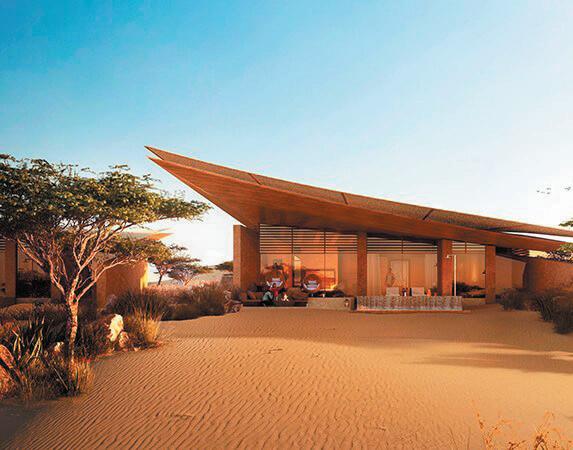
We’ve used a lot of off-site manufacturing methods wherever we can because of the remote location of the site, which gives certainty of delivery and quality.
And when you need to bring together the labor to put it all together, it’s easier to be able to bolt it all together like a Lego® set than to do stuff the old-fashioned way with hundreds of workers.
SP: What’s the first step companies should take if they want to work with RSG?
BE: We register all of our vendors and we have a very active vendor management department. So when opportunities for tenders come up, we already have a shortlist of companies. For the companies to be included on this shortlist, they need to go through our vendor pre-qualification process, which is all done online through SAP Ariba, and it’s accessed through the RSG website.
SP: What are the benefits of working with RSG?
BE: We’re very conscious of the pressures within the marketplace in the Kingdom of Saudi Arabia at the moment. We’re one of several concurrent giga-projects, all competing for the same supply chain, and we’re all fishing from the same pool in terms of the resources that are available to allow us to deliver our projects. In terms of what makes us attractive to external parties, and why they would come to work for us instead of other projects, we’re taking a slightly different approach to our procurement path for the construction side of things. We’ve adopted a construction management approach, so rather than engaging a series of main contractors – main contractor number one builds hotel number one and then main


contractor number two builds hotel number two, and we manage the main contractors - we take a construction management approach where we actually engage the specialist trade contractors ourselves directly.
Consequently, as a specialist trade contractor, there are huge advantages, including the fact that instead of getting bogged down with the bureaucracy of working with a main contractor and then the main contractor working for an employer, they are working directly with RSG, the employer. This means that they have got direct links to the paymaster, which is us, and they are being directly managed by our staff, so it makes it a much flatter organization from the trade contractor’s perspective, with the benefit that there’s one payment that is coming from us to them for the work that they’ve done

Everything is untouched by human hands and we want it to stay that way during and after construction so that people can come and enjoy the natural environment
on a monthly basis; it’s not going through a middleman or intermediary. We pride ourselves on meeting or bettering our contracted payment terms for the supply chain and we don’t have a middleman between us and those trade contractors, so that’s key when looking at RSG and other projects that are out there.
SP: Obtaining materials has been a bit of a challenge hasn’t it, particularly with so many projects on the go at the same time?
BE: Materials were a huge challenge during Covid and immediately post-Covid. That wasn’t something that was particular just to this market. The world stopped very suddenly for Covid, but then it re-started a lot quicker than everyone thought it was going to and it had a big impact on the supply chain globally.
I think it’s fair to say that generally, the globaltype factors started to steady in the second half of last year. Obviously, the Ukraine situation affected things at the beginning of last year, but things have now started to settle down. We’re not seeing huge problems in capacity and availability of materials in the market, but it’s about making sure that you’re set up and
you’ve got as much as you need when you need it. We’re planning in advance. Like anywhere, there are some trades that we struggle with in terms of capacity within the Kingdom, so we
are actively looking at expanding our supply base into other countries within the region.

We took part in a supply chain event in London in November, and we’re doing another one in Istanbul during Q1 this year. In addition, we’re also looking to tap into a bit more of the market in Qatar now that the football stadia and hotels have all been built. And we’ll look at other countries within the region as well, probably doing something in Jordan and Egypt as we go into Q2. We are broadening, we’re buying some stuff from the UAE at the moment because it is a developed market, but it doesn’t come without its problems because there is a big problem with liquidity in the UAE. People promise things but when push comes to shove they haven’t got the

We’re doing a supply chain event in London in November, and we’re doing another one in Istanbul during Q1
financial capacity to deliver the goods or services they’ve promised. We’re having to do a high degree of due diligence concerning the financial capacity of the people we are talking to in the UAE market to avoid problems for them and problems for us.
SP: Which industries and specialisms are you particularly looking out for at the moment?
BE: It is literally everything to do with construction. It’s so broad. To give you an example, I’ve signed off procurement-related paperwork for seaplanes, scuba diving tanks, sailboats, fit-out contractors, steel frame contractors, and corporate services for vehicle leases – it is just everything. We’re building two huge destination resorts from scratch and we need anything you can imagine that goes into them.
SP: I guess you’re looking for people and companies who are in it for the long haul?
BE: Yes, in terms of the supply chain and employees.
We’re graced with a superb pipeline of current projects, but the aspirations of the PIF on the Red Sea coast will see further developments that will come into RSG in the future. So we’re very much committed to the long-term. We look to ensure that we’re maximizing engagement with the entities that are already active here in the local market, but we’re also looking forwards in terms of investment opportunities for people to come in and establish factories and production capabilities to manufacture things that we are currently reliant upon importing from overseas. For example, a lot of our loose furniture, fixtures, fittings, and equipment for the hotels are being sourced in the Far East because there’s a lot of manufacturing for those products in that part of the world. So we’re encouraging companies
to think about investing in the Kingdom with production facilities that can support our projects and some of the off-site manufactured items that we use regularly, such as swimming pools, pre-cast concrete, and bathroom pods.
We did a quick calculation before Christmas, and we probably need 50,000 pods over the next seven years! That’s a significant number of pre-fabricated rooms for successful bidders, so we’d like to collaborate with people long-term for those.

SP: And finally, for companies and suppliers, you simply say, get in touch if you think you’ve got something to offer us?
BE: Yes, absolutely. Reach out to us through the portal and attend one of the supplier events that we’re doing, including some local ones within the Kingdom, during the course of the year. We’re happy to hear from anyone that can provide us with things that we need … which is more or less everything!

We need to embrace the darkness in order to preserve our stunning night skies for generations to come

Humankind has held a special relationship with the night sky since the dawn of time. The stars have guided us on long, intrepid journeys for millennia. They have been the basis for the stories and legends that became our shared culture. And they have provided a source of inspiration and wonder for all who have looked up on a clear night.
We want to make sure that our guests and future generations can experience this as well. But more critically, we want to protect the night sky because of the importance it plays in regulating and sustaining nature. The Red Sea is a habitat for some of the most distinctive aquatic lifeforms and endangered wildlife; it is essential to keep the environment in a state where this biodiversity can flourish.
Many birds, turtles, and bugs are photoperiodic, meaning their behavior is influenced by patterns of light and darkness, repeated each day, season, or year. This impacts all of their activities, from breeding and eating to resting. When the endangered hawksbill sea turtle hatches during the dark of night, for example, it uses the brightness of the moon to make its way to the sea.
It is estimated that more than half the world’s population currently lives in cities and that number is projected to reach 75% by the year 2050. Artificial light from urban
centers has created a consistent ‘skyglow’ at night, blocking our view of the stars.
Those in charge of planning, managing, and carrying out the development of cities are becoming more and more obliged to formulate creative solutions to address the negative impacts the rapid growth of urban areas is having on the night sky.
To create an environment of discussion and engagement on this topic, Red Sea Global (RSG) hosted an event for journalists, astronomers, and activists who support night-time protection. This included Ghaida Aloumi, Space Ambassador and National
Point of Contact for Saudi Arabia at the Space Generation Advisory Council, and Eng. Ahmed T. Althaher, a passionate speaker and leader at Judai Astronomical Tourism.
Called 'Suhoor Under the Red Sea Stars' and held in a Bedouin-style tent with an open roof, the event sought to inform and educate attendees about why the night sky needs protection and how we are achieving it.
As the sun set, our vision adapted to the darkness, and frequently someone would whisper "wow" as a different planet became visible: Mercury, Venus, Saturn, and the enormous Jupiter all made an appearance.
It is estimated that more than half the world’s population currently lives in cities and that number is projected to reach 75% by the year 2050
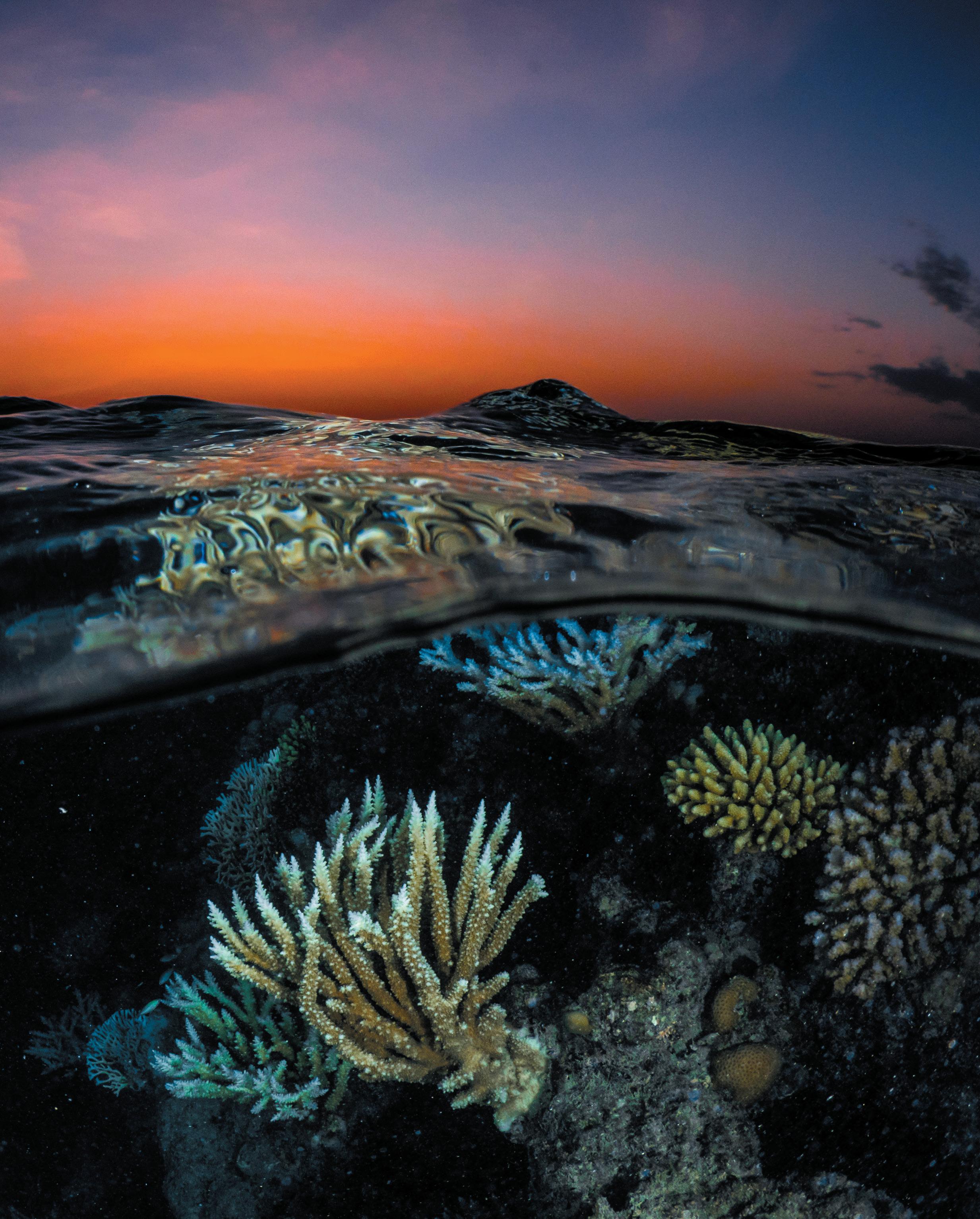
The Red Sea is a habitat for some of the most distinctive aquatic lifeforms and endangered wildlife
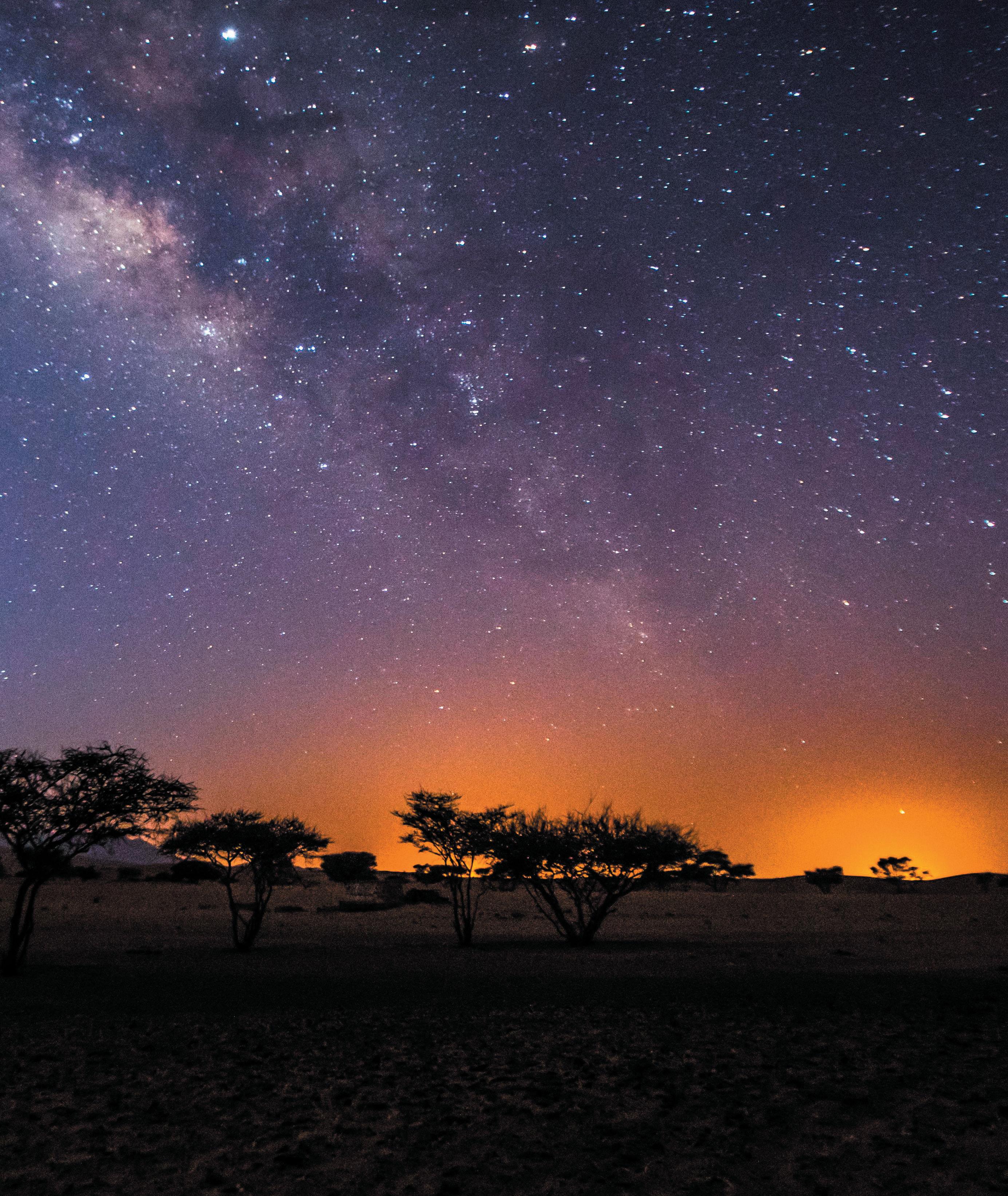
During the evening, Myriam Patricia Lopez Yanez, Lighting Design Director at RSG, gave a talk, revealing how we are using the natural light of the Sun and moon to safeguard the Red Sea's unique environment and deep history. Mr Althaher also spoke, explaining the effect of astronomy on various civilizations. He also presented a tutorial on how to use binoculars for astronomical observations, pointing out the brightest stars, indicating various star patterns, and recounting their tales in line with Arabic culture – all with the Milky Way providing a spectacular backdrop.
The event was hugely successful, but our work does not stop there. Every partner we work with, from construction company to hotel operator and beyond, must adhere to the regulations laid out in our Dark Skies principles. These rules are designed to ensure the protection of the environment, including the sky at night. For example, all lights on roads, pathways, and structures are directed downwards and have controlled
lenses to make sure there is minimal light pollution. Moreover, all lights throughout the destination are selected to be warm and amber colors, avoiding white and blue, which are more intense for the sky.
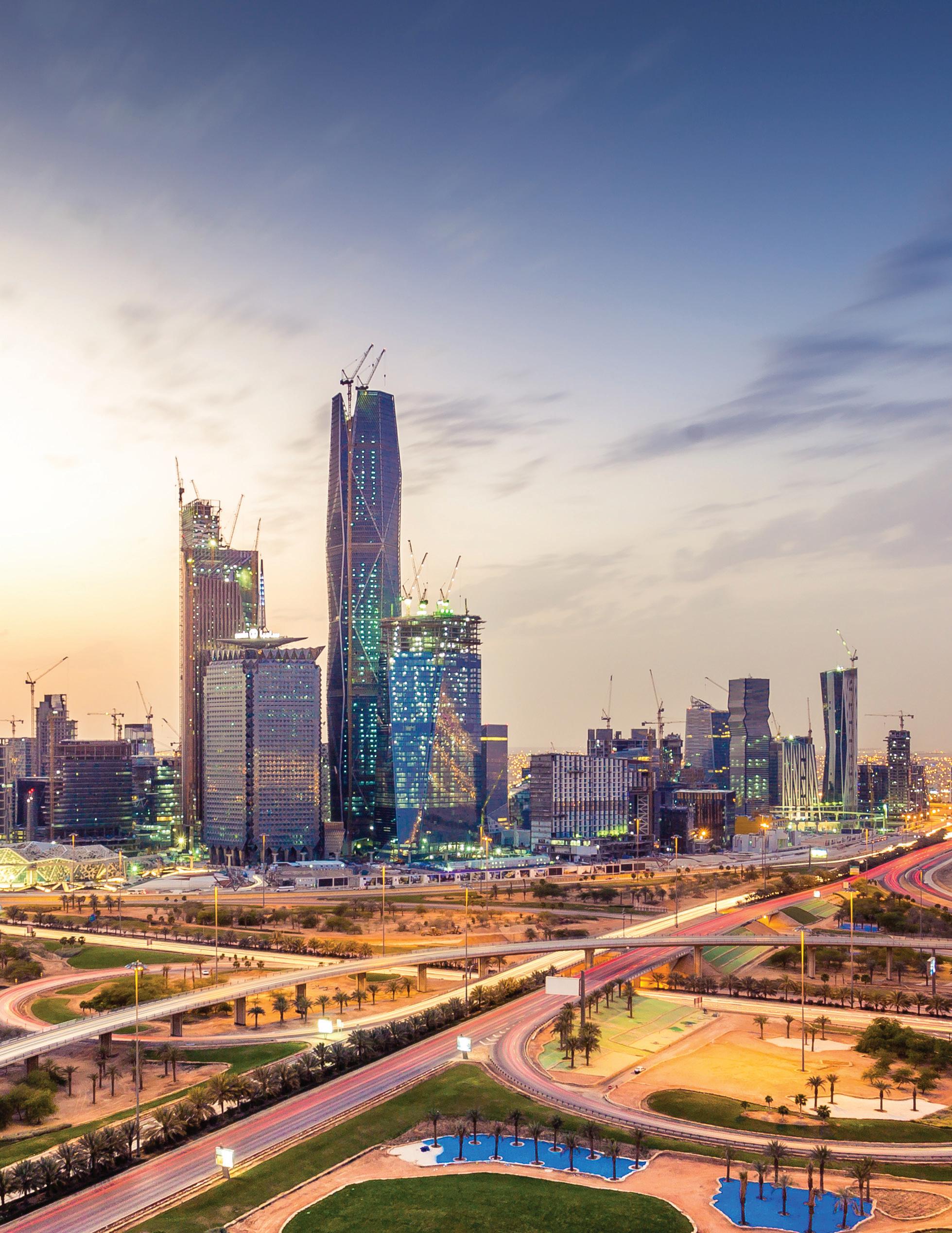

To take things one step further, we are collaborating with the International Dark Sky Association (IDA) to inform the cities and communities near our destinations about light pollution, further protecting the night sky.
Red Sea Global places sustainability at the core of all its activities, stressing the importance of both people and planet. With seven out of 10 travelers worldwide expressing their desire to be actively involved in protecting the environment while traveling, this emphasis on sustainability is attractive to today's environmentally aware consumer.
Yet while many understand the concepts of environmental protection and biodiversity, the need to protect the night sky is less understood.
We are determined to continue helping to educate the world and are working with the IDA to do this. We also have ambitions for The Red Sea to become the largest dark sky reserve in the world – this will help lure visitors, but also protect the nocturnal creatures that call the Red Sea home.
Our destinations possess some of the most exceptional night skies in the globe. It is our pleasure and duty to ensure they remain that way.
All lights throughout the destination are selected to be warm and amber colors, avoiding white and blue, which are more intense for the sky
WE ANTICIPATE. WE INVESTIGATE. WE RESOLVE.
MAKING THE BEST POSSIBLE OUTCOMES A REALITY, EVERY TIME

THE RED SEA IS A NEW TYPE OF DEVELOPMENT WITH A MISSION TO EMPHASIZE BOTH PEOPLE AND THE ENVIRONMENT, AND IN DOING SO IT IS BREAKING THE MOULD FOR REGENERATIVE TOURISM IN SEVERAL IMPORTANT AND GROUNDBREAKING WAYS. SAUDI PROJECTS SPOKE TO FAISAL BUTT, PROJECTS DELIVERY EXECUTIVE DIRECTOR, RED SEA GLOBAL (RSG), FIRST ASKING HIM ABOUT THE NEW AIRPORT EXPERIENCE VISITORS WILL ENJOY; AN EXPERIENCE THAT WILL TOTALLY TRANSFORM THEIR JOURNEY.
“We wanted to make the arrival experience more memorable and much more enjoyable. The biggest pain for most people when they arrive at an airport, often with children in tow, is the wait for bags. There can be quite a delay before the baggage carousel starts moving, and even then you can be stood there for some time waiting for your particular bags to appear. All you want to do is get to the hotel, enjoy the beach, and sit by the pool, so we decided to look at how we could reduce or even remove all of this hassle.”
The result is that when visitors arrive at the international terminal, they don’t actually need to pick their bags up and can bypass the baggage carousel completely. Sounds heavenly, right? It is because at the arrival point the baggage management system will ensure that all bags go to the chosen resort - the airport knows that Mr and Mrs X are going to Six Senses and their bags will meet them there. This a unique offering compared to traditional airports and makes
the whole journey far more pleasurable.
Of course, if you get nostalgic for the ‘old way’, that’s fine too. You’ll be able to wait next to the carousel until your bags emerge, but we can’t imagine too many people taking that option.
“This took a lot of work and a lot of simulation,” Faisal explains, “because this is a very different way of looking at how you are going to handle baggage. But it’s going to be worth it for all of the people traveling to The Red Sea.”
BECOMING THE MAIN CONTRACTOR
RSG is handling over a dozen projects along the Red Sea coast, with The Red Sea resort on target to welcome visitors by early 2023. Yet how has this been achieved in such a relatively short space of time - The Red Sea is encircled by the world's fourth-largest barrier reef system and encompasses over 28,000 square kilometres, with more than 90 unspoilt islands, magnificent beaches, dormant volcanoes, wide dunes, mountain valleys, and historical cultural monuments. It is a big task!
“From day one, our philosophy revolved around delivering this project differently,” Faisal says. “We quickly realized that market capacity is in short supply right now. There is a huge demand for contractors and laborers based on the pipeline of projects, announced projects, and the projects that are actually happening on the ground today. At the same time, there isn’t capacity on the supply side either. So at some point, you have an issue with market capacity and that is reflected in pricing, which can result in hundreds of multiples. This had a knock-on effect that saw us going back and re-packaging and retendering, so we said, how do we break this?
“We went the traditional route at first with main contractors. However, for any given asset we have between 15 and maybe 20 construction packages, so essentially you have up to 20 contracts being managed on a single asset. That’s unheard of in this market. So what we’ve done is gone directly to the tier two and tier three contractors, who do the work for us.
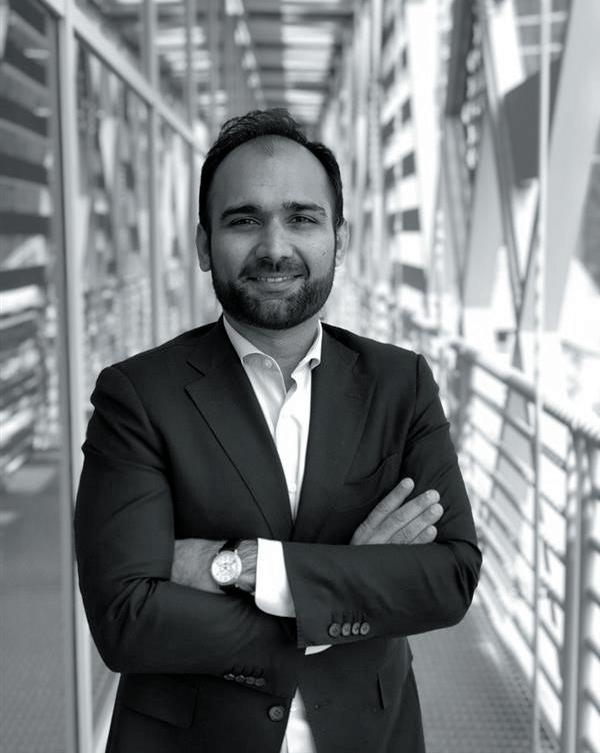
This comes with a risk because tiers two and three are probably not able to execute that quality, but that’s where we come in.
“It’s why RSG has built an in-house team of construction managers, project managers, and engineers. We have grown from a handful of people in 2017 to over two thousand today, all to build an in-house capability. The result is that now we are the main contractor; we are going to manage our projects and manage the sub-contractors as any other contractor does.
This has shifted our focus into construction management where we can have the supply chain drive those packages to completion. It’s also allowed us to remove those hefty margins that the main contractors in the market charge us.”
Naturally, giga-projects such as this present not only challenges but lessons, and things have certainly been taken on board by RSG to allow the company to be even more effective and successful in the future.
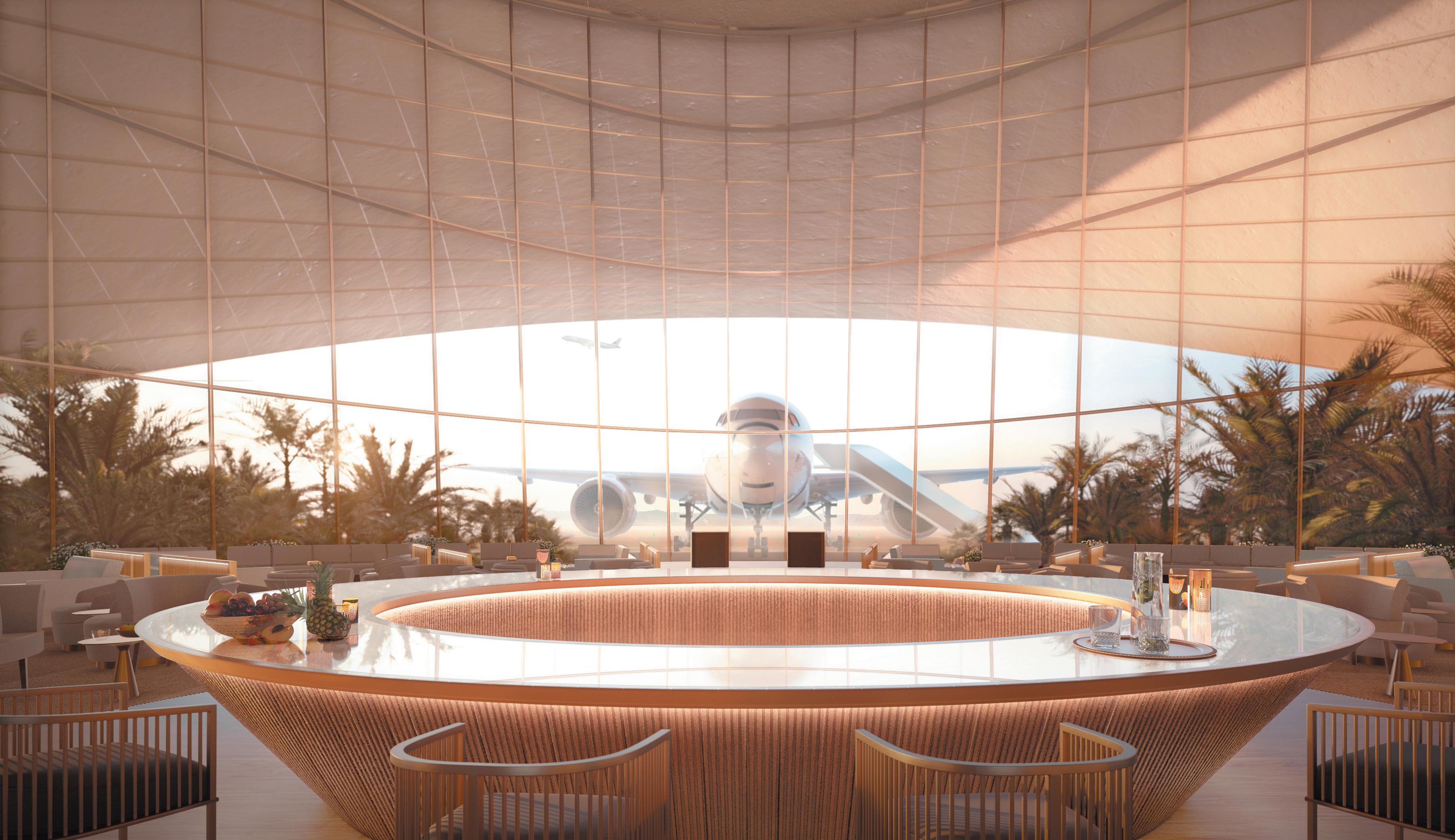
“In a way, we are upscaling the supply chain. Those guys who never had a chance to work directly with a client, who previously weren’t perhaps paid on time by the contractor, can develop their businesses, and this is essentially a part of what we’re doing - upscaling the supply chain, upscaling the market, contributing to the GDP, not only by selling hotels and
hotel room rates but also by upscaling the construction industry,” Faisal says.
Because of the restrictions and difficulties of some of the environmental projects, new standards have been put in place by RSG, but how much has been imposed upon the company by the authorities and how much is self-imposed?
“I think our standards are well above what the local standards are,” Faisal begins. “The Saudi Building Code is comprehensive, so we created a bespoke building code that is a combination of the Saudi and international building codes. We did this because we want to put ourselves at a higher standard, and that’s what we now follow across all of our work.”
When visitors arrive at the international terminal, they don’t actually need to pick their bags up and can bypass the baggage carousel completely
“RSG has built an in-house team of construction managers, project managers, and engineers”
“Island development is a new concept in Saudi Arabia, especially in an environment that is considered so sensitive”
It’s the same with the environmental aspects. RSG began talking to the National Environmental Committee, which approves all of the company’s impact environmental assessments, four or five years ago to start creating a framework on how to manage environmental impact and monitoring. “Nothing had ever been built on a Saudi marine site before, so it was a new thing for them too,” Faisal says.
“Island development is a new concept in Saudi Arabia, especially in an environment that is considered so sensitive and home to some of the most endangered species in the world. Some species of migratory birds only come to this part of the Red Sea once a year. Therefore, we needed to consider all of these things and the environmental regulations that we are following are the first of their kind in the Kingdom.”
RSG is nothing if not an innovative and forward-looking developer and is justly proud of a number of the initiatives it has introduced to the Red Sea, one of the most
impressive being the relocation of coral. “There is a very dense population of coral, and in certain areas where we need to develop, whether it’s subsea cabling or perhaps the bridge, there was coral in those locations,” Faisal explains. “As much as we tried to avoid certain places, there are some locations where it simply isn’t possible. That’s where the whole notion of taking coral from one location and replanting it in another location arose.
“Working with a lot of experts from around the world, we discovered that there was mixed success with the survival rate of the coral when moved. A lot of the time when you relocate coral from one environment to another, bringing it from an open sea environment to a lab environment, for instance, the changes in mineral content in the water, the temperature, and the salinity mean that the coral eventually dies.
“After maybe three and a half years of experimenting with small coral sample sizes, we finally found a method with a company by the name of Beacon Development to relocate a large volume of coral from one area of the sea to another. We didn’t have to bring coral back into the lab and then back to the sea, it was from one point to another point. We needed to check the mortality rate, in four and a half or five months, to see if the coral was acclimatizing to the conditions. If not, it would die. And it’s been nine months now and that program has been incredibly successful. That is a world first.”
The World Tourism Organization has called for the industry to look beyond visitor numbers and profit, and instead focus on the positive impact that healthy tourism can have on people, society and the environment. Red Sea Global can provide the blueprint for this vision.

“We didn’t have to bring coral back into the lab and then back to the sea, it was from one point to another point”
UILDING INFORMATION MODELING (BIM) IS THE FOUNDATION OF DIGITAL TRANSFORMATION IN THE ARCHITECTURE, ENGINEERING, AND CONSTRUCTION SECTORS, A PROCESS FOR CREATING AND MANAGING INFORMATION ON A CONSTRUCTION PROJECT THROUGHOUT ITS WHOLE LIFECYCLE. SAUDI PROJECTS SPOKE TO MOHAMMED DAWOOD ALDAWOOD, SENIOR BUILDING INFORMATION
B
MODELING MANAGER – DIGITAL DELIVERY, AT RED SEA GLOBAL (RSG) TO FIND OUT MORE ABOUT THIS UBIQUITOUS BUT OFTEN MISUNDERSTOOD TOPIC.



Saudi Projects: How easy is BIM to implement in a human resources way, as the typical top-down organizational chart won’t work for BIM because more collaboration is required. Does this become a barrier because old practices die hard?
Mohammed Dawood Aldawood: BIM implementation requires process harmony in and across organizations. It is no different to any other digital transformation program. These initiatives are often disruptive to businesses because it requires a change from established ways of working, and pushes people from their comfort zone, resulting in fear and a slow-down in progress.
Offers project information components integrity using information classification systems
Has defined level of information need in terms of 3D and information
The 3D model without the BIM framework would be just geometry. That alone cannot be leveraged to higher value BIM uses such as coordination, cost, scheduling, energy modelling, or sustainability advantages where high-quality BIM models are the gateway to unlock the data value.
However, transformation drivers should be supported by strategic leadership such as visible top management ‘buy-in’ to the vision, a coherent digital strategy, and the people skills improvement required, otherwise the BIM maturity in the organization won’t have the right catalysts to succeed. If this can be achieved, all parties in the organization can see the benefits for them personally as well as the overall project mission.
SP: What is the difference between 3D and BIM?
MDA: This is the most confusing part of the AEC industry! 3D is a subset of the overall BIM Framework.
The BIM framework:
Assures business strategy to set scope expectations
Assures proper contractual engagement across the project participants, depending on the project procurement method
Provides clear direction on what data should be shared, when, to whom, and for what purpose
SP: What are some of the benefits of BIM for RSG?
MDA: There are some inherent benefits in improved collaboration through sharing data globally and creating efficiencies through the alignment of processes in the supply chain.
But the main benefits we see are:
Coordinated optimized designs
Greater opportunity for early engagement in the supply chain
Optimized material selection and usage thus reducing waste
Higher quality information handover leading to reduced rework and improved handover
Automation of repetitive low-value tasks
Improved data-driven decision making
Greater transparency of progress in design and construction
Improved safety and efficiency on-site through improved logistics and planning
SP: BIM can’t solve the climate crisis, but it can downsize the building industry’s carbon footprint. So, BIM fits in nicely with the whole RSG ethos?
MDA: BIM fits well as an organized source of information in RSG through the project lifecycle
leading towards optimized material selection, iterative simulations to improve efficiency, and data to enable our environmental teams to make better-informed decisions. Specifically, BIM has enabled the greater use of off-site manufacturing resulting in safer work in controlled environments that reduce waste and improve quality of product.
This is not enough though. The industry needs to push for more digital transformation in the manufacturing sector to define standardized information exchange and databases to connect with the BIM model. Such achievements would bring huge opportunities to optimize the equipment and material selection using BIM and energy simulation applications.
Improved technology interoperability would enable the tools to communicate in the same schema language, and is a matter that hundreds of organizations are working on currently under the leadership of building SMART. This is an important sustainable digital milestone that governments, clients, engineers, manufacturers and vendors should mandate and push forward to achieve an optimum interoperability exchange between applications.
Such achievements would allow innovators and climate change stewards to collaborate like never before to solve challenging climate problems.
SP: Most contractors appear to be utilizing BIM through ‘partial uses’ (virtual mock-ups, scope clarification etc.), which seem to be almost infinite. What are some of the uses of BIM at RSG? Can you give a couple of examples?
MDA: There are seemingly infinite
Our largest platform is the Common Data Environment that we provide for all project stakeholders
I believe the specific challenge in Saudi Arabia is that we do not have a general authority of BIM to organize the national efforts in achieving BIM
BIM implementation requires process harmony in and across organizations
opportunities to harness the value in the data, but it comes down to what you are trying to achieve on your projects, and really understanding what would provide value for you. Is it an acceleration of delivery, quality or reduced cost? What does the organizational strategy aim to achieve? How mature is your company and the supply chain you work with?
On our projects we are focused on:
Coordination reviews
Constructability reviews
3D walk-throughs focused on guest experience
BIM construction scheduling and simulation
Dynamic cost modeling for analysis and estimates
Design for manufacture and assembly techniques, linking designs directly for manufacturers to use in their machines
Handover of data between stages, specifically design to construction and construction to handover
SP: What type of software are you using for BIM at RSG?
MDA: Our largest platform is the Common Data Environment that we provide for all project stakeholders. This platform allows all of our project partners to share data in a controlled manner, using a common language (ISO19650), and accelerates the design process. By providing this for all, it removes a barrier for our supply chain to work with us in a collaborative manner. We also use design and visualization tools to identify, track and resolve design and constructability issues. This has been invaluable when working on a fast-track construction project as decision-makers can rapidly affect project outcomes with high-quality data.
SP: What is the biggest challenge in implementing BIM?
MDA: Globally, the biggest challenge is to achieve an integrated BIM framework that harmonizes some of the good practice work that is delivered by the best minds in our industry.

This would require strong foundations and human expertise that understand the challenges we all face and that can leverage digital opportunities to transform the work we all do. There is also a skills shortage globally of talented BIM professionals that can really drive project outcomes, be innovative and manage the organizational change aspects of any transformation.
I believe the specific challenge in Saudi Arabia is that we do not have a general authority of BIM to organize the national efforts in achieving BIM.
This vacuum results in investment distraction in the supply chain, slowing down progress and limiting the BIM potential.
At RSG we have formed working groups with a number of external stakeholders to exchange knowledge and seek standardization opportunities both on process and technology. But this needs to accelerate to really have an impact on the delivery capacity and capability in the Kingdom. It would be great to see more organizations leaning in and helping us to deliver this vision.
A positive stand happened this year when Saudi Contractors Authority took leadership and organized several BIM exhibits and workshops bringing stakeholders together. Personally, I would love to see these efforts translate into BIM working groups represented by all SCA members to drive national BIM and information management standardization. This shift from ‘closed communities’ to ‘open communities’ to achieve a higher level of integration, collectively identifying common gaps and common approaches of resolutions would accelerate the adoption of a BIM framework and related technologies.
SP: Is BIM the future?
MDA: Regardless of the name, yes digitally transformed project delivery is the future. The future for believers in data-driven decisions. The future for believers in data for certain long-term decisions. The future for believers in data as the new digital economy.
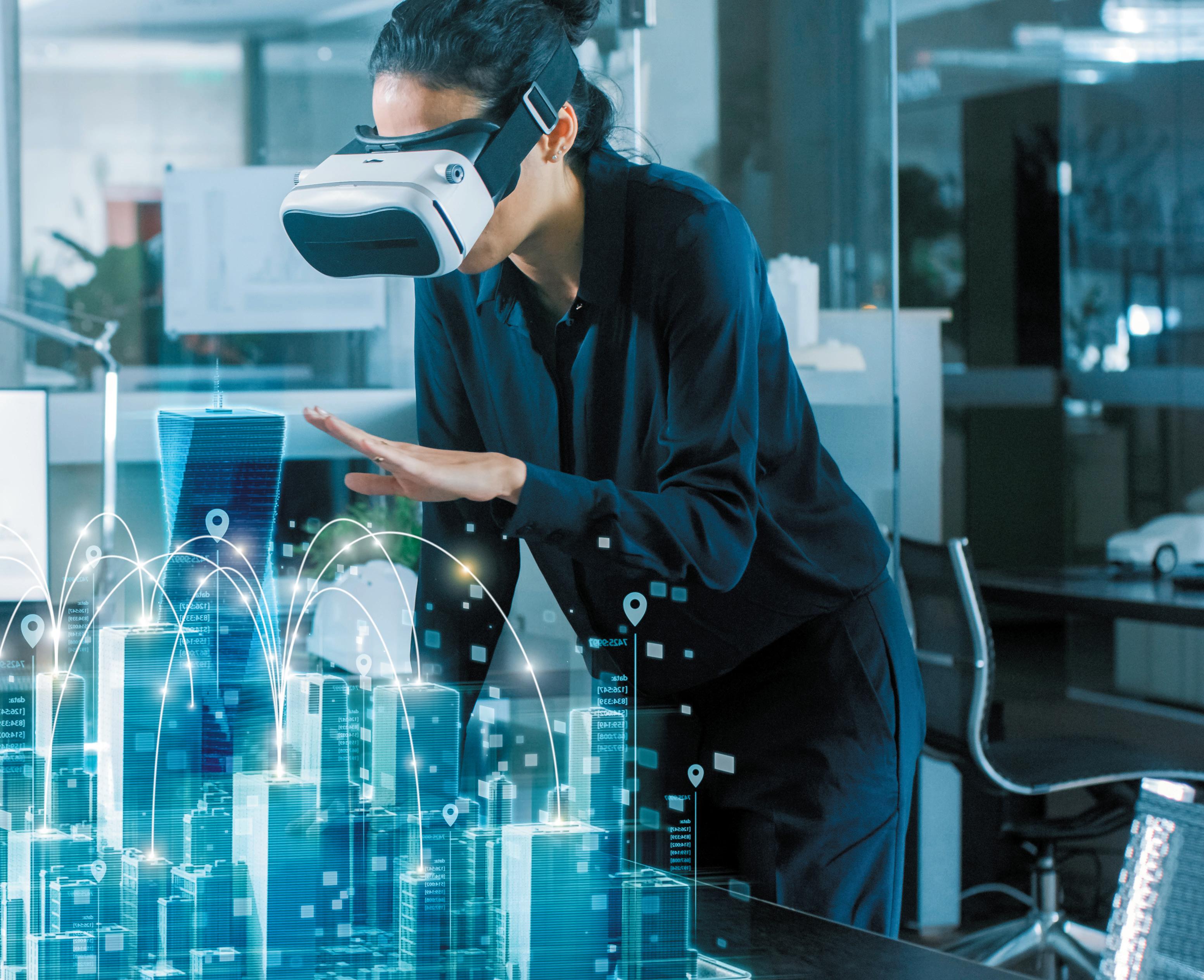 RED SEA GLOBAL VISIT WEBSITE
RED SEA GLOBAL VISIT WEBSITE
The 3D model without the BIM framework would be just geometryRED SEA GLOBAL - BIM - MOHAMMAD DAWOOD ALDAWOOD
ED SEA GLOBAL (RSG), THE MULTI-PROJECT DEVELOPER BEHIND THE WORLD’S MOST AMBITIOUS REGENERATIVE TOURISM DESTINATIONS, THE RED SEA AND AMAALA, HAS AWARDED A PRIMARY INFRASTRUCTURE AND UTILITY CONTRACT VALUED AT NEARLY SAR ONE BILLION. THE PROJECT WILL BE UNDERTAKEN BY ALAYUNI INVESTMENT AND CONTRACTING COMPANY TO DELIVER THE FIRST PHASE OF DEVELOPMENT AT AMAALA, AN ULTRA-LUXURY TOURISM DESTINATION LOCATED ALONG THE KINGDOM’S NORTH-WESTERN COAST, ACROSS ITS TRIPLE BAY MASTERPLAN.
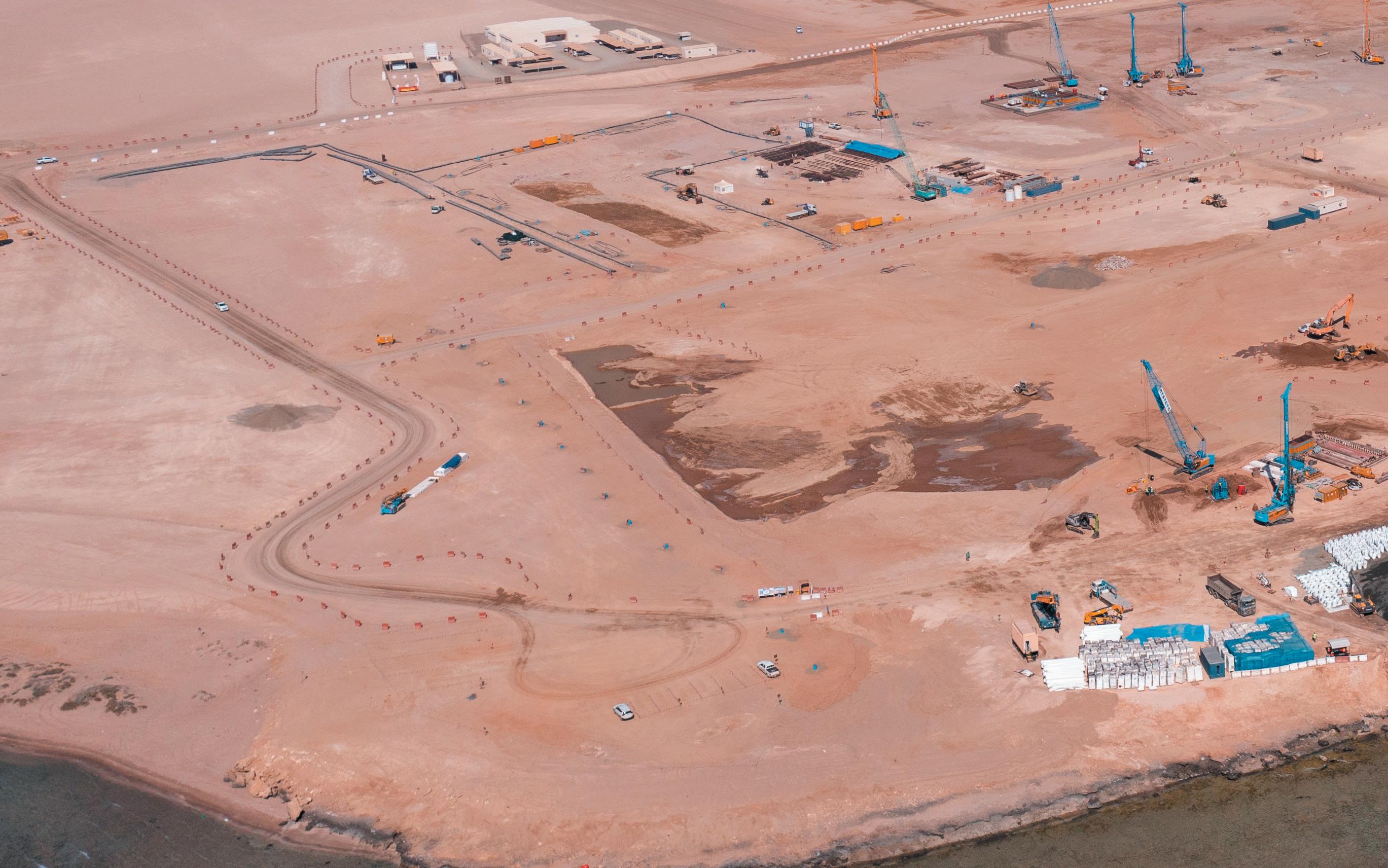
AL-AYUNI, classified as a ‘First Class’ contractor in the Kingdom since 2006, will be responsible for delivering state-of-the-art Primary Utility Infrastructure Systems while minimizing Triple Bay’s carbon footprint as part of AMAALA’s commitment towards net-zero operations.
“Today’s infrastructure deal forms a critical part of Red Sea Global’s ambition to pioneer a new relationship between luxury tourism and the natural environment,”
said John Pagano, Group CEO of RSG. “The sheer scale of the developments and our relentless pursuit of regenerative tourism requires meaningful partnerships that can deliver resilient infrastructure. Together with AL-AYUNI Investment and Contracting Company, we are confident that we can collectively shape the future of developments in the Kingdom and beyond."
AL-AYUNI was selected based on its overall technical and commercial competencies, as well as regional and global credentials. All design and construction methods meet RSG’s stringent criteria for end-to-end sustainable development, including economic, financial, social, and institutional factors.
Faheed Al-Ayuni, Chairman of AL-AYUNI Investment and Contracting Company, said: “Red Sea Global is a future-forward developer that is closely aligned with our legacy of innovating world-class solutions,
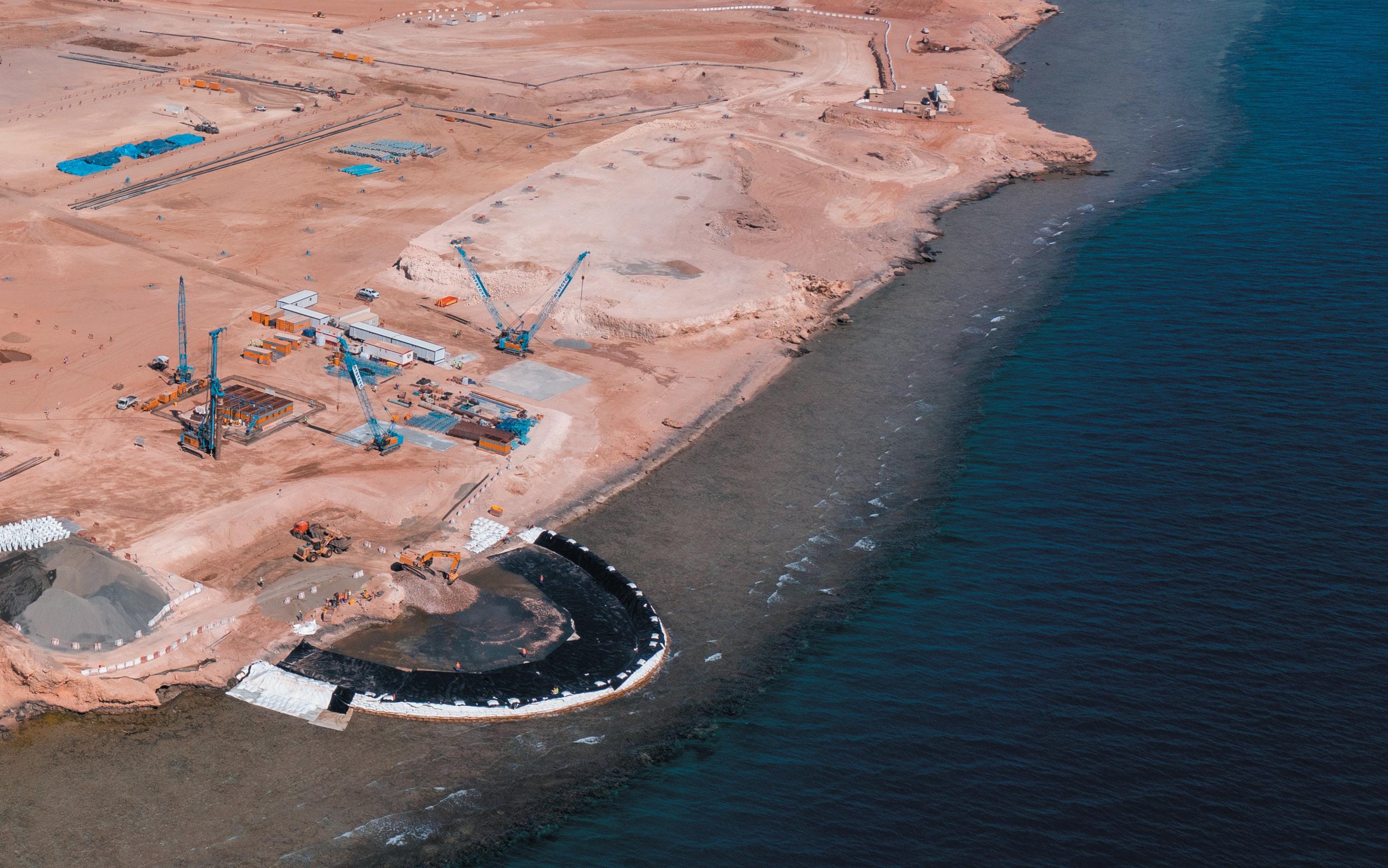
cementing trusted relationships, and setting new benchmarks. It is an honor for us to contribute to its pioneering destinations and we look forward to unlocking the full breadth of our robust capabilities to meet RSG’s ambitious sustainability targets.”
AMAALA’s first phase of development, focused on the Triple Bay masterplan, will encompass eight hotels and upwards of 1,200 hotel keys, upon full completion in 2027, the destination will offer 3,000 hotel rooms across 25 hotels as well as high-end retail establishments, fine dining, wellness, and recreational facilities.
Saudi-based AL-AYUNI Investment and Contracting Company appointed to progress development at Amaala’s first phase of development across its Triple Bay masterplan

RED SEA GLOBAL (RSG), THE DEVELOPER BEHIND ULTRA-LUXURY TOURISM DESTINATION AMAALA, HAS ANNOUNCED TANGIBLE PROGRESS ACROSS THE DEVELOPMENT, WITH OVER 300 CONTRACTS SIGNED TO DATE, WORTH MORE THAN SAR 6.62 BILLION ($1.7 BILLION).
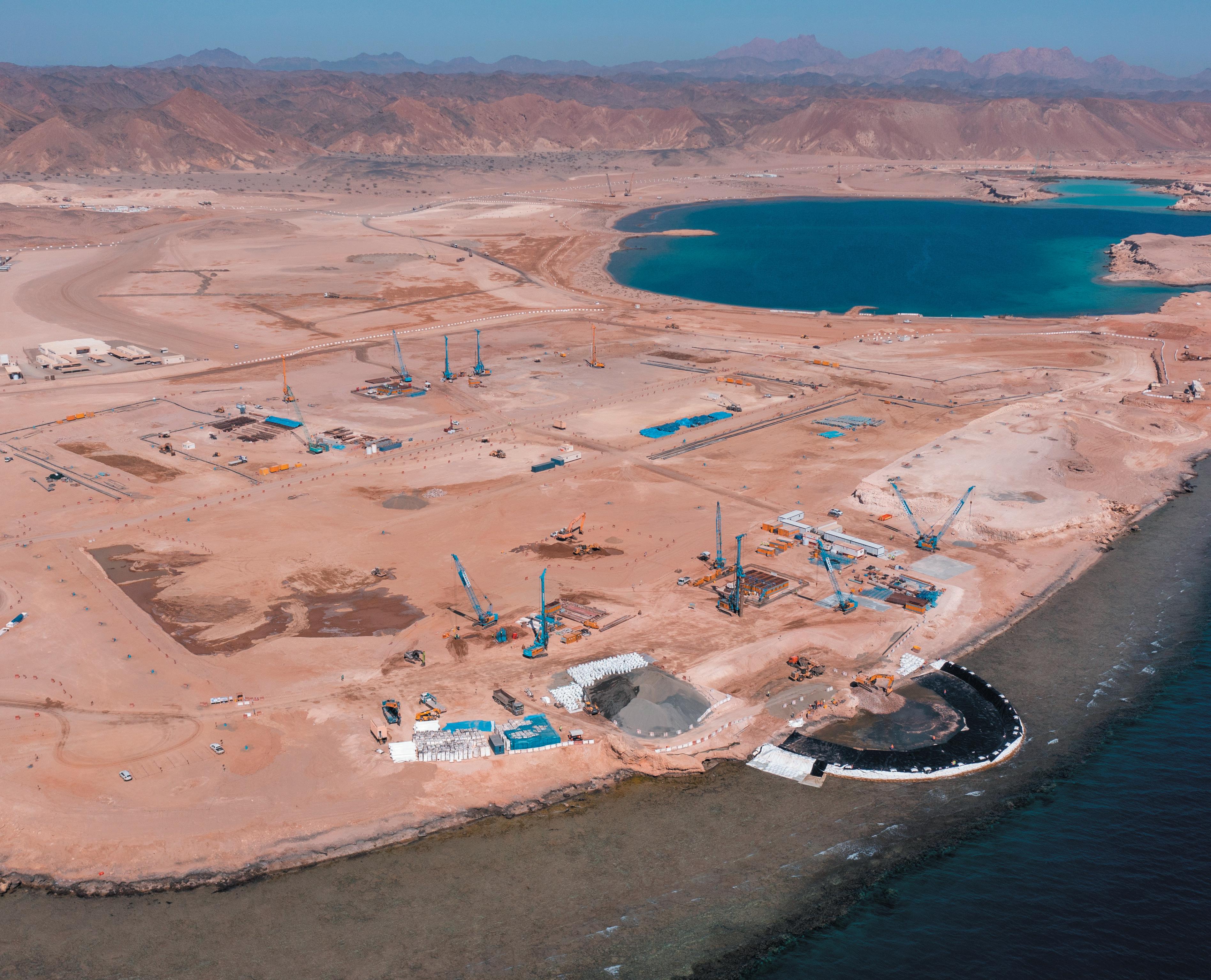
ore than 98% of the total contract value has been awarded to Saudi firms, highlighting the organization’s commitment to strengthening the local economy. These include agreements for the design and build of state-of-the-art accommodation and facilities at the destination for future employees. An additional SAR 6.1 billion of contracts is currently out to tender, across 54 proposals.
“Surpassing 300 contract awards underscores the scale of this project and the significant progress being made as we press ahead with activity on the ground to bring our destination to life. At AMAALA, we are working to create a sustainable, purpose-and meaning-driven destination for the discerning traveler, and remain closely aligned with the goals of the Kingdom’s Vision 2030, as we develop one of the top global tourism destinations of the future. I am delighted to be able to showcase the results achieved by our brilliant team and partners,” said John Pagano, Group CEO of RSG.
Spanning over 4,155km2 of pristine terrain and set within the Prince Mohammad bin Salman Natural Reserve, the first phase of AMAALA is focused on the Triple Bay masterplan. Eight hotels and upwards of 1,200 hotel keys are set for completion in 2024.
Work is well underway on-site to progress the enabling infrastructure and groundwork required to develop the destination, with more than 2,400 staff already on site and 9.9 million manhours logged to date. This includes the successful completion of 11 km of roads ahead of schedule to better connect the site.
The first section of the Construction Village, home to 5,000 construction workers, is now operational. An additional two sections are in progress to provide accommodation for a further 10,000 workers. Secondary infrastructure works are also in progress for the development of the first phase of AMAALA’s world-class accommodation at the Employee Village in Triple Bay, set to accommodate nearly 20,000 employees who will eventually operate the destination.
Construction on the destination’s transport links has also commenced, with the airside infrastructure works for the destination’s new airport progressing on schedule. The fast-track contract for the works was awarded to Rawabi BUTEC in 2020 and includes the development of the airport’s 3,150m runway, taxiways and aprons, alongside additional infrastructure.
Rawabi BUTEC Chairman, Abdulaziz Al Turki, said: “This project is a cornerstone of Vision 2030, and it is an honor for Rawabi BUTEC to contribute to such a unique destination. We look forward to applying our sustainable design and construction know-how to ensure the safe and timely achievement of delivering the new airport, while preserving the exceptional surrounding environment.”
In addition to key infrastructure construction, AMAALA is breaking ground across its tourism offering. Bulk earthwork is in progress, with nearly 50% of the total fill quantity completed to date in key super plots. This includes the AMAALA Yacht Club, the Red Sea Marine Life Institute, The Marina and the Wellness Core, as well as three of the first hotels.
In line with RSG's broader commitment to responsible development across its expanding portfolio, AMAALA aims to operate with a zero-carbon footprint. Like The Red Sea, the destination will be powered by renewable energy with no connection to the national grid and send zero waste to landfill.
“From the rich natural capital that surrounds our site to the local communities, AMAALA’s masterplans are deeply grounded in
maximizing positive environmental, economic, and cultural impacts. As we transform our regenerative commitments into concrete actions, the destination will undoubtedly be an important stepping stone to redefining tourism in the region and beyond,” Pagano added.
AMAALA is a core component of the Vision 2030 strategy to diversify the economy by enabling rapid growth in the tourism sector. Once complete in 2027, it will offer approximately 3,000 hotel rooms across 25 hotels as well as high-end retail establishments, fine dining, wellness, and recreational facilities.
The project is expected to create upwards of 50,000 new direct, indirect, and induced jobs for Saudis, as well as contribute upwards of SAR11 billion to the country’s GDP once fully operational.
“Our progress across infrastructure, groundworks, and key assets is a testament to our unwavering ambition to champion tourism as a powerful force for good, remaining closely aligned with the goals of the Kingdom’s Vision 2030 and Saudi Green Initiative. We are trailblazing regeneration at an unprecedented scale to create better conditions of life across the destination ethos, while catering to global demand for inclusive, non-extractive, and equitable experiences,” concluded Pagano.
Ultra-luxury tourism destination located along Saudi Arabia’s north-western coast outlines impressive and tangible progress, with the first phase of development on track for completion in 2024
“Surpassing 300 contract awards underscores the scale of this project and the significant progress being made as we press ahead with activity on the ground to bring our destination to life”
HIS ROYAL HIGHNESS MOHAMMED BIN SALMAN, CROWN PRINCE, PRIME MINISTER AND CHAIRMAN OF THE NEOM COMPANY BOARD OF DIRECTORS, HAS ANNOUNCED THE DEVELOPMENT OF SINDALAH, THE FIRST LUXURY ISLAND DESTINATION IN NEOM AND ONE OF THE MOST IMPORTANT PROJECTS SUPPORTING SAUDI ARABIA’S NATIONAL TOURISM STRATEGY.
Amain gateway to the Red Sea offering bespoke nautical experiences, Sindalah is expected to start welcoming guests to enjoy its exquisite facilities and exclusive offerings from early 2024. It is anticipated that the development will create 3,500 jobs for the tourism sector and hospitality and leisure services.
Extending over an area of approximately 840,000m2, Sindalah is one of a group of islands that will be developed in NEOM, each according to its unique vision and design.
His Royal Highness said: “This is another significant moment for NEOM and a major step in the Kingdom realizing its tourism ambitions under Vision 2030. Sindalah will be NEOM’s first luxury island and yacht club destination in the Red Sea, providing a scenic gateway to the Red Sea that will become the region’s most exciting and attractive tourism
location. It will be a destination where travelers can experience the true beauty of NEOM and Saudi Arabia, above and below the water, making Sindalah the future of luxury travel.”
Adding to NEOM’s growing tourism offerings, Sindalah will reshape the luxury international yachting calendar, offering a new season for visitors and guests to enjoy. It will feature a prestigious 86-berth marina, an ideal destination for accommodating luxury vessels, while offshore buoys will house superyachts. Providing one-of-a-kind nautical experiences, Sindalah will offer 413 ultra-premium hotel rooms, in addition to
333 top-end serviced apartments. A deluxe beach club, glamorous yacht club, and 38 unique culinary offerings will provide an incomparable experience in the Red Sea.
With its incredible array of amenities, stateof-the-art marine facilities, strategic location and exceptional natural landscapes, Sindalah is expected to become established as one of the most alluring islands in the Red Sea.
Building on its ability to design new tourism opportunities from the ground up, NEOM is working with world-class leisure and hotel brands to make Sindalah an exclusive and

glamorous destination in the Red Sea for the world’s yachting community. NEOM is developing the island to be a premium destination surrounded by a stunning and diverse marine environment that has one of the world’s most beautiful coral reserves.

Sindalah is also expected to become a popular golfing destination by offering enthusiasts the opportunity to experience a world-class 6,474-yard (5,920 meters) par 70 course. With its 18 tees, the Sindalah golf course will deliver two unique nine-hole experiences.
The announcement of Sindalah affirms the accelerated pace in the development of NEOM towards achieving the ambitious vision of His Royal Highness the Crown Prince, with the development of its flagship projects such as THE LINE, its designs recently revealed by His Royal Highness the Crown Prince; TROJENA, its global
mountain tourism destination that will be the Arabian Gulf’s first outdoor skiing retreat; and OXAGON, its reimagined manufacturing and innovation city. All NEOM projects are aligned to redefine the way humanity lives and works in harmony with nature.
Providing one-of-a-kind nautical experiences, Sindalah will offer 413 ultra-premium hotel rooms
It is anticipated that the development will create 3,500 jobs

• BECOME A POWERFUL LEADER
• LEAD WITH AUTHENTICITY AND INSPIRE OTHERS
• BECOME A ROLE MODEL AND CREATE CHANGE WITHIN YOUR ORGANIZATION
• HOW TO NAIL PRESENTATIONS AND SHINE
• NEGOTIATION TO WIN
• BE SEEN, HEARD AND UNDERSTOOD BOTH IN AND OUT OF THE WORKPLACE
• BEAM WITH CONFIDENCE IN AND OUT OF THE MEETING ROOM
• PURSUE GOALS AND DREAMS, CREATING UNSTOPPABLE SUCCESS
• BREAKTHROUGH FEARS WHICH YOU KNOW HOLD YOU BACK
• THIS DAY WILL LEAVE YOU TRANSFORMED!
• IT’S TIME TO BECOME NON-NEGOTIABLE ABOUT YOUR FUTURE AND TAKE CONTROL OF YOUR LIFE
TO PARTICIPATE: emma@wildwomenlead.com
FOR SPONSORHIP OPPORTUNITIES: saudiprojects@tpg.media
